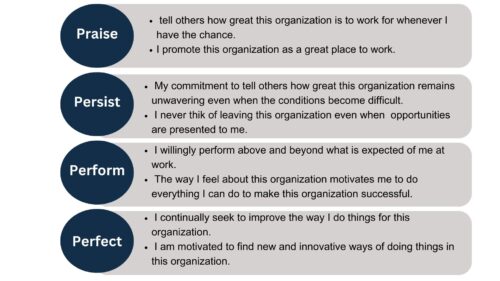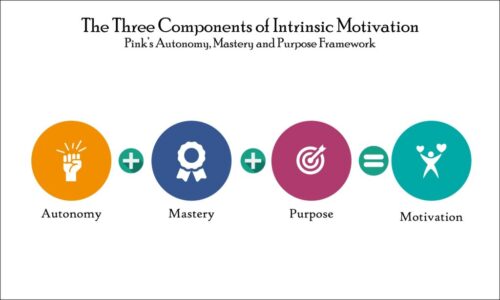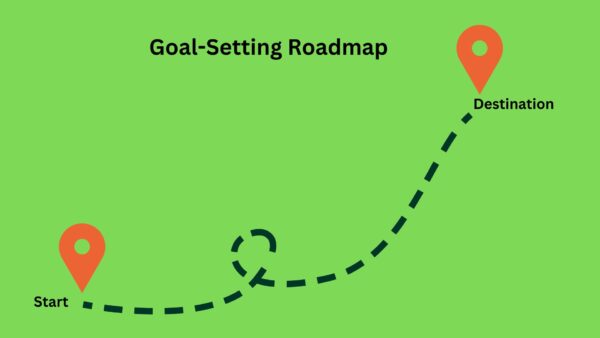EQ Leader – Workshop 1 (Introducing EI)
The Appleton Greene Corporate Training Program (CTP) for EQ Leader is provided by Ms. Samson-Song Certified Learning Provider (CLP). Program Specifications: Monthly cost USD$2,500.00; Monthly Workshops 6 hours; Monthly Support 4 hours; Program Duration 12 months; Program orders subject to ongoing availability.
If you would like to view the Client Information Hub (CIH) for this program, please Click Here
Learning Provider Profile
Ms. Samson-Song is a Corporate Trainer, Executive Coach and Certified EQ-i 2.0 Facilitator.
Ms. Samson-Song has 17+ years experience as a corporate trainer in various industry sectors, providing training to thousands of customer-facing employees, enabling them to offer exceptional service to customers, clients and guests. She has also helped new and existing leaders in management positions to be effective in their roles through leadership development. She is passionate about helping people move to their next level of brilliance.
Ms. Samson-Song’s training is a healthy blend of personal development, science-backed psychology and professional excellence. With a fierce commitment to the facilitation of growth, Ms. Samson-Song is uniquely gifted in identifying the dysfunctional patterns in individuals and teams, which holds them back from being brilliant. She is able to bring clarity in decision-making, as well as helping her clients move from feeling stuck, to becoming highly effective in their roles. She firmly believes people skills directly impact productivity.
Through the success of these trainings, it has led her to partner with c-suite leaders and senior management to align their training programs with business strategy and direction.
Ms. Samson-Song’s clients span across companies such as: EY, Lockheed Martin, International Monetary Fund, GAP, Agilent Technologies, Adobe, Target, Under Armor, Hershey, Johnson & Johnson, and more.
Today, Ms. Samson-Song combines her corporate training experience with executive coaching skills to provide unique value for participants in workshop settings.
Ms. Samson-Song obtained her coach training from the Coactive Training Institute (CTI) based in San Rafael, California and is professionally certified on a PCC level by the international Coaches Federation (ICF). Ms. Samson-Song is also a certified by Multi Health Systems (MHS) as a an EQ-i 2.0 & EQ 360 Practitioner.
Ms. Samson-Song holds a diploma in Customer Relationship Management from the University of South Africa and a diploma in Food Science & Technology from Kaduna Polytechnic, Nigeria.
In the last two decades, Ms. Samson-Song has traveled to over 40 countries in 5 continents. Her passion for unlocking potential in people continues to be her core motivation.
MOST Analysis
Mission Statement
The first workshop will focus on equipping participants with a comprehensive understanding of Emotional Intelligence (EQ) and its profound significance in effective leadership, decision-making, and leading the Self. We will debrief the EQ- i2.0 assessment framework and discuss how the components are integrated into leadership development process. We will lay the foundation for leading self, leading others and leading the organization. Participants will be better equipped to harness their emotional intelligence to become more impactful and empathetic leaders, capable of making informed decisions that resonate with both their teams and organizational goals.
Objectives
01. EQ Foundations: departmental SWOT analysis; strategy research & development. Time Allocated: 1 Month
02. EQ Leadership: departmental SWOT analysis; strategy research & development. Time Allocated: 1 Month
03. Goleman Model: departmental SWOT analysis; strategy research & development. Time Allocated: 1 Month
04. Motivation: departmental SWOT analysis; strategy research & development. Time Allocated: 1 Month
05. EQ Quadrant: departmental SWOT analysis; strategy research & development. Time Allocated: 1 Month
06. EQ Competencies: departmental SWOT analysis; strategy research & development. Time Allocated: 1 Month
07. Bar-On Model: departmental SWOT analysis; strategy research & development. 1 Month
08. Debriefing Assessments: departmental SWOT analysis; strategy research & development. Time Allocated: 1 Month
09. Synthesizing Models: departmental SWOT analysis; strategy research & development. Time Allocated: 1 Month
10. Developmental Plan: departmental SWOT analysis; strategy research & development. Time Allocated: 1 Month
Strategies
01. EQ Foundations: Each individual department head to undertake departmental SWOT analysis; strategy research & development.
02. EQ Leadership: Each individual department head to undertake departmental SWOT analysis; strategy research & development.
03. Goleman Model: Each individual department head to undertake departmental SWOT analysis; strategy research & development.
04. Motivation: Each individual department head to undertake departmental SWOT analysis; strategy research & development.
05. EQ Quadrant: Each individual department head to undertake departmental SWOT analysis; strategy research & development.
06. EQ Competencies: Each individual department head to undertake departmental SWOT analysis; strategy research & development.
07. Bar-On Model: Each individual department head to undertake departmental SWOT analysis; strategy research & development.
08. Debriefing Assessments: Each individual department head to undertake departmental SWOT analysis; strategy research & development.
09. Synthesizing Models: Each individual department head to undertake departmental SWOT analysis; strategy research & development.
10. Developmental Plan: Each individual department head to undertake departmental SWOT analysis; strategy research & development.
Tasks
01. Create a task on your calendar, to be completed within the next month, to analyze EQ Foundations.
02. Create a task on your calendar, to be completed within the next month, to analyze EQ Leadership.
03. Create a task on your calendar, to be completed within the next month, to analyze Goleman Model.
04. Create a task on your calendar, to be completed within the next month, to analyze Motivation.
05. Create a task on your calendar, to be completed within the next month, to analyze EQ Quadrant.
06. Create a task on your calendar, to be completed within the next month, to analyze EQ Competencies.
07. Create a task on your calendar, to be completed within the next month, to analyze Bar-On Model.
08. Create a task on your calendar, to be completed within the next month, to analyze Debriefing Assessments.
09. Create a task on your calendar, to be completed within the next month, to analyze Synthesizing Models.
10. Create a task on your calendar, to be completed within the next month, to analyze Developmental Plan.
Introduction
The EQ Leader workshop is a journey through the domain of Emotional Intelligence and its profound relevance in modern leadership.
In the age of AI, where technological advancements are reshaping the landscape of businesses and industries, investing more in EQ (Emotional Intelligence) training is not just an option but a strategic necessity. In business today, success is not just about embracing technology but about empowering individuals with the emotional intelligence to lead, adapt, and thrive in the evolving landscape.
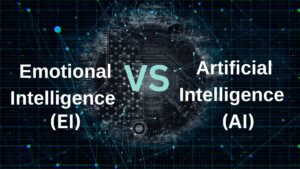
Here’s are some compelling reasons why prioritizing EQ training alongside the emergence of AI is a strategic advantage:
Unlocking Human Potential: While AI excels in automating tasks and processing data, the human touch remains unparalleled in areas requiring emotional understanding, empathy, and nuanced decision-making. EQ training empowers employees to harness their emotional intelligence, unlocking their full potential to collaborate effectively, lead with empathy, and navigate complex interpersonal dynamics.
Fostering Innovation and Creativity: AI may assist in streamlining processes, but the true catalyst for innovation and creativity lies in the human mind. EQ training cultivates an environment where employees feel empowered to express ideas, collaborate openly, and think creatively. This human-centric approach is essential for driving innovation and staying ahead in rapidly evolving industries.
Building Resilient Teams: In a world where change is constant, building resilient teams is paramount. EQ training equips employees with the emotional resilience needed to adapt to new technologies, overcome challenges, and thrive amidst uncertainty. Resilient teams contribute to organizational agility, a key factor in navigating the dynamic landscape shaped by AI.
Enhancing Customer Relationships: AI can analyze customer data, but it’s emotional intelligence that builds lasting customer relationships. EQ-trained employees understand and respond to customer emotions effectively, creating positive experiences, fostering loyalty, and differentiating the company in a competitive market.
Promoting Inclusive Leadership: As AI becomes integral to decision-making processes, ensuring that these processes are fair and unbiased is crucial. EQ training promotes inclusive leadership by raising awareness of unconscious biases, fostering diversity, and ensuring that the human touch guides ethical and equitable decision-making.
Mitigating Workplace Stress: The rapid integration of AI can lead to uncertainty and stress among employees. EQ training provides tools to manage stress, enhance well-being, and maintain a positive workplace culture. A resilient and emotionally intelligent workforce is better equipped to handle the demands of the evolving work landscape.
Adapting to Remote Work Challenges: The rise of AI often coincides with an increase in remote work. EQ training becomes especially relevant in this context, helping employees navigate virtual communication challenges, maintain team cohesion, and foster a sense of connection and belonging despite physical distance.
Strategic Talent Retention: In an era where attracting and retaining top talent is a competitive advantage, companies with a strong emphasis on EQ create an appealing workplace culture. Employees value organizations that invest in their personal and professional development, fostering a sense of loyalty and commitment.
Meeting Ethical and Social Responsibilities: As companies integrate AI, ethical considerations become paramount. EQ-trained leaders are better equipped to address the ethical implications of AI, ensuring responsible use and aligning technological advancements with broader societal values.
In conclusion, while AI revolutionizes industries, investing in EQ training is an investment in the heart of your organization – your people. By balancing technological advancements with emotional intelligence, companies not only future-proof their workforce but also create a workplace culture that thrives on collaboration, innovation, and human connection.

Why EQ Matters in Leadership
In the dynamic world of leadership, Emotional Intelligence stands as the cornerstone of success. Unlike traditional leadership focused solely on authority and task orientation, EQ presents a revolutionary approach. It emphasizes understanding emotions—both ours and others’, fostering empathy, nurturing relationships, and making thoughtful, informed decisions based on emotional insights. High EQ leaders cultivate environments of trust, collaboration, and innovation, thus driving organizational success with a human-centric approach.
Old vs. New Style of Leadership
Traditional leadership often epitomized command-and-control structures, relying on hierarchical power and stringent directives. In stark contrast, the new wave of leadership pivots toward collaborative, empathetic, and inclusive models. EQ-driven leadership champions listening, understanding diverse perspectives, and empowering individuals. It’s about leading by example, inspiring through emotional connection, and fostering environments where every voice matters.
Becoming an EQ (Emotional Intelligence) leader is essential in today’s professional setting for several compelling reasons:
Enhanced Interpersonal Relationships: EQ leaders excel in understanding and managing emotions, fostering authentic connections with team members. By recognizing and responding effectively to emotions, they build trust, improve communication, and create a positive and supportive work environment.
Effective Team Dynamics: In team settings, EQ leaders navigate interpersonal dynamics with finesse. They understand the diverse emotions and motivations of team members, promoting collaboration, resolving conflicts amicably, and fostering a cohesive team spirit.
Adaptive Leadership: EQ leaders are adept at navigating change and uncertainty. Their ability to remain composed under pressure, make informed decisions, and inspire confidence in their teams positions them as effective leaders in today’s fast-paced and dynamic business landscape.
Increased Empathy and Understanding: Leaders with high EQ exhibit empathy, recognizing and valuing the emotions of others. This empathetic approach enhances employee well-being, loyalty, and satisfaction, contributing to a positive workplace culture.
Improved Decision-Making: Emotional intelligence enables leaders to make well-informed decisions by considering both logical reasoning and emotional nuances. EQ leaders weigh the impact of decisions on individuals and the overall team, leading to more thoughtful and inclusive outcomes.

Resilience in the Face of Challenges: EQ leaders demonstrate resilience and bounce back from setbacks. Their ability to manage stress, stay focused, and maintain a positive outlook during challenges inspires confidence in their teams and sets an example for overcoming adversity.
Increased Employee Engagement: EQ leaders engage with their teams on a deeper level, aligning individual strengths and aspirations with organizational goals. This connection fosters a sense of purpose and dedication among employees, leading to increased job satisfaction and commitment.
Cultivation of Innovation and Creativity: An emotionally intelligent leader encourages a culture where team members feel safe to express ideas and take calculated risks. This openness to diverse perspectives and creative thinking fosters innovation within the organization.
Positive Impact on Organizational Culture: EQ leaders contribute significantly to shaping a positive and inclusive organizational culture. Their emphasis on emotional well-being, fairness, and open communication creates a workplace where individuals feel valued and motivated to contribute their best.
Career Advancement and Organizational Success: The skills associated with emotional intelligence, such as effective communication, empathy, and adaptability, are increasingly recognized as critical for leadership success. EQ leaders are well-positioned for career advancement and contribute to the overall success and sustainability of their organizations.
In this workshop, we unpack what Emotional Intelligence looks like in leadership, empowering you to navigate the complexities of modern organizational dynamics.
We will explore the fundamental shifts in leadership styles, EQ competencies and leading EI models. We will design actionable steps to harness emotional intelligence for personal and professional growth.
Through insightful discussions, practical applications, and interactive exercises, you’ll cultivate a deeper understanding of EQ’s transformative power in your leadership context.
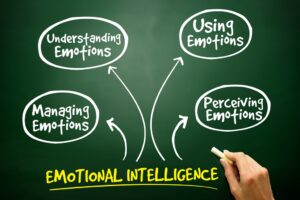
In summary, becoming an EQ leader is important not only for personal and professional growth but also for fostering a work environment characterized by collaboration, trust, and resilience. In a world where effective leadership requires a nuanced understanding of human emotions, embracing and developing emotional intelligence is a strategic imperative for leaders aiming to thrive in their roles and lead their teams to success.
Executive Summary
Welcome to the Emotional Intelligence (EI or EQ) Foundations Workshop, where we embark on a transformative journey, exploring human emotions and the power they hold in shaping our interactions at work and in our personal relationships, as well as our overall well-being.

EI, is more than just a buzzword; it’s the bedrock of meaningful connections and effective communication. At its core, EI is the ability to recognize, understand, manage, and utilize emotions in ourselves and others. It fosters empathy, enhances social skills, and cultivates resilience, enabling individuals to respond to life’s challenges with grace and understanding. In this workshop, we delve into the nuances of emotional intelligence, uncovering its profound impact on personal and professional success.
We will be covering the following 12 Focus Areas:
Chapter 1: EQ Foundations
EQ Foundations – Foundations of Emotional Intelligence
Emotional Intelligence (EI) is a concept vital in psychology, education, and business, encompassing the ability to perceive, understand, manage, and utilize emotions effectively. Rooted in early 20th-century ideas like “social intelligence,” the modern understanding of EI gained traction in the 1990s, thanks to influential psychologists like Peter Salovey, John Mayer, and Daniel Goleman.

Let me provide a brief, historical background:
Early Roots: Concepts similar to emotional intelligence emerged in the 1920s with Thorndike’s “social intelligence” and Wechsler’s recognition of non-cognitive skills.
Later on, Salovey and Mayer defined EI as the ability to monitor and utilize emotions, laying the foundation for empirical research and further exploration.
However, it was Daniel Goleman’s 1995 book “Emotional Intelligence” brought the concept to mainstream attention, emphasizing its pivotal role in personal and professional success.
Emotional Intelligence Applications in Business:
In business, emotional intelligence stands out as a vital catalyst for effective leadership, seamless team dynamics, and enhanced customer interactions. Leaders endowed with high emotional intelligence possess the ability to empathize with their team members, fostering trust and encouraging transparent communication. They skillfully navigate conflicts, creating a harmonious workplace environment. Furthermore, employees adept in emotional intelligence thrive in collaboration, comprehending their colleagues’ viewpoints and resolving disputes amicably.
Businesses recognize the value of emotional intelligence in customer interactions, where it plays a pivotal role in cultivating enduring client relationships and fostering loyalty. Emotionally intelligent professionals exhibit adaptability, thriving amidst diverse work environments, and embracing change and uncertainty with resilience. By integrating emotional intelligence into their organizational fabric, businesses cultivate teams characterized by resilience, motivation, and empathy. This transformation leads to greater productivity, innovation, and overall success.
Since the popularization of Emotional Intelligence, various models of emotional have been proposed, each offering unique insights into understanding and measuring this essential trait.
In this workshop and in upcoming workshops, we will synthesize two models – Goleman’s and Bar-On’s models, into a single, comprehensive application for professional development.

Chapter 2: EQ Leadership
– EQ Leadership – The Link Between Emotional Intelligence and Leadership)
The connection between Emotional Intelligence (EQ) and leadership is clearly established. EQ plays a pivotal role in shaping leaders’ capabilities to navigate intricate social dynamics, motivate teams, and achieve organizational success. The relationship between EQ and leadership can be described as follows:
Leaders with high EQ possess acute self-awareness, enabling them to recognize and manage their emotions effectively. This self-regulation fosters resilience, adaptability, and composure under pressure, crucial qualities for making rational decisions and staying calm during challenging situations.

Strong EQ leaders demonstrate empathy, understanding and sharing others’ feelings. This empathy establishes genuine connections with team members, fostering trust, collaboration, and open communication. Leaders who empathize with their employees can address their concerns and motivate them toward common goals effectively.
High EQ leaders excel in social skills, such as effective communication, active listening, and conflict resolution. They navigate interpersonal conflicts tactfully, promoting harmony within the team. By creating a positive and inclusive work environment, leaders with strong social skills enhance team cohesion and productivity.
Leaders with high EQ are intrinsically motivated and radiate enthusiasm for their work. Their positive outlook and resilience inspire and motivate others, fostering a shared sense of purpose and dedication among team members. This motivational quality is crucial in driving individuals and teams to achieve challenging objectives.

In today’s rapidly changing business landscape, leaders must be adaptable. High EQ leaders embrace change, make agile decisions, and welcome new ideas. Their ability to navigate change and guide their teams through transitions is vital for organizational innovation and growth.
Leaders with high EQ exhibit self-awareness, empathy, social skills, motivation, and adaptability. By leveraging these emotional competencies, they create supportive work environments, establish strong interpersonal relationships, inspire their teams, and effectively lead organizations toward sustainable success. Cultivating Emotional Intelligence is not merely a desirable trait in leadership; it is an essential component for thriving in today’s complex and dynamic business world.

Chapter 3: Goleman Model
– Goleman Model – The 5 Components of Emotional Intelligence
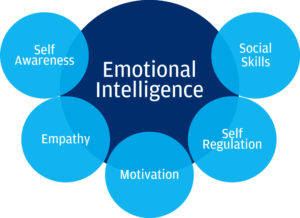
Emotional Intelligence comprises five key components essential for personal and professional success:
• Self-Awareness: Recognizing and understanding one’s emotions, strengths, weaknesses, values, and goals, leading to better decision-making and emotional regulation.
• Self-Regulation: Managing emotions, impulses, and reactions, staying calm under pressure, fostering healthier relationships, and making rational choices.
• Social Awareness: Empathy, active listening, and perceiving emotional cues in others, fostering connections, resolving conflicts, and demonstrating genuine compassion.
• Relationship Management: Navigating social interactions, communication, conflict resolution, teamwork, and inspirational leadership, essential for collaboration and effective leadership.
• Motivation: Intrinsic passion for work, a strong desire to learn, optimism, and resilience in the face of setbacks, driving personal growth and inspiring others.
Developing these components enhances interpersonal skills, fosters positive workplace dynamics, and contributes significantly to overall emotional well-being, meaningful relationships, and successful leadership.

Chapter 4: Motivation
Motivation is a key component of Emotional Intelligence. It plays a vital role in understanding and managing emotions, both for oneself and others. In the context of EI, motivation refers to the ability to harness emotions to drive personal and professional achievement.

A person with low motivation may be discouraged easily by any obstacle and give up. A person with high motivation realizes that the reward of their personal goals is worth the time and effort spent getting there, even when they face obstacles.
In the context of work, intrinsic and extrinsic motivation refer to different types of motivations that drive employees to perform tasks, achieve goals, and excel in their roles.
1. Intrinsic Motivation:
Intrinsic motivation comes from within an individual. It involves engaging in an activity or task because it is personally rewarding, enjoyable, or aligned with one’s values and interests. People who are intrinsically motivated find satisfaction in the work itself and are driven by a genuine interest or passion for what they do. They are more likely to take initiative, be creative, and persist in the face of challenges. Examples of intrinsic motivation at work include:
• Passion for the Job: Employees who love their work and find it fulfilling are intrinsically motivated. They enjoy the challenges and tasks associated with their job, finding a sense of purpose in their work.
• Personal Growth: Individuals motivated by self-improvement and learning are intrinsically motivated. They seek opportunities to enhance their skills and knowledge, leading to a sense of achievement.
• Autonomy: Employees who value independence and the ability to make decisions are intrinsically motivated. They thrive when given the freedom to choose how to approach tasks and solve problems. Individuals with high emotional intelligence are adept at self-motivation and inspiring others, leading to improved performance, productivity, and overall well-being.

2. Extrinsic Motivation:
Extrinsic motivation, on the other hand, involves performing a behavior or task to earn external rewards or avoid punishments. People who are extrinsically motivated are driven by tangible rewards, recognition, or social approval. While extrinsic rewards can boost motivation temporarily, they may not sustain long-term engagement or job satisfaction. Examples of extrinsic motivation at work include:
• Salary and Bonuses: Financial rewards, such as salary, bonuses, or incentives, are common extrinsic motivators. Employees may work harder or achieve specific targets to earn these rewards.
• Recognition and Awards: Public acknowledgment, awards, or praise from supervisors and colleagues can motivate individuals. Recognition reinforces desired behaviors and encourages employees to continue their efforts.
• Job Security: The fear of job loss or the desire for job stability can be an extrinsic motivator. Employees might work diligently to maintain their employment status and associated benefits.
Emotionally intelligent individuals can identify their own passions, set meaningful goals, and persevere in the face of setbacks. They also possess the capacity to empathize with others’ motivations, enabling them to foster positive relationships and collaborate effectively within teams. Motivation within the realm of EI involves recognizing the emotional factors that drive behavior, such as ambition, enthusiasm, and a desire for personal growth.
Developing motivation as a component of EI involves self-awareness, self-regulation, and social skills. It requires individuals to understand their own values, aspirations, and triggers, allowing them to channel their emotions positively. Additionally, individuals with high EI can recognize and respond to the motivations of those around them, thereby creating supportive and encouraging environments.

Chapter 5: EQ Quadrant
EQ Quadrant – The Four Pillars of Emotional Intelligence)
In this chapter, we will gain an overview of the four fundamental pillars of Emotional Intelligence.
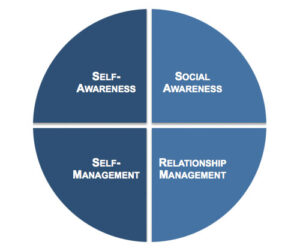
These pillars are linked together to complete the big picture of the EQ quadrant.
1. Self-Awareness: This pillar centers on recognizing and comprehending one’s own emotions, strengths, weaknesses, values, and aspirations. Individuals with heightened self-awareness can assess their emotions accurately, fostering introspection and personal growth.
2. Self-Management: Self-management involves controlling impulsive reactions, managing emotions effectively, and adapting to changing circumstances. Proficient self-managers remain composed under pressure, recover swiftly from setbacks, and maintain a positive outlook, enhancing resilience and adaptability.
3. Social Awareness: Social awareness emphasizes empathy and understanding others’ emotions, needs, and concerns. Those adept in social awareness can perceive social cues, show genuine interest in others’ perspectives, and navigate complex social situations adeptly, fostering strong interpersonal relationships and effective communication.
4. Relationship Management: This pillar encompasses the ability to influence and guide others’ emotions, manage conflicts, and establish robust interpersonal connections. Proficient relationship managers excel in communication, teamwork, and collaboration. They inspire and motivate others, resolve disagreements constructively, and cultivate a supportive and inclusive environment.

Chapter 6: EQ Competencies
EQ Competencies – based on the Four Pillars of Emotional Intelligence
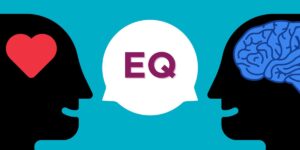
Building on the 4 pillars, we will explore the 4 competencies in each of the pillars for personal and professional development. These competencies are summarized as:
• Self-Awareness Competencies: Self-awareness competencies encompass the ability to recognize and understand one’s own emotions, strengths, weaknesses, values, and goals. These competencies are essential for personal and professional growth, enabling individuals to accurately assess their moods and emotions and comprehend their impact on others. Key self-awareness competencies include emotional self-awareness (recognizing one’s emotions and their effects) and accurate self-assessment (realistically assessing one’s abilities and limitations). Developing these skills fosters introspection, emotional regulation, and better decision-making.
• Self-Management Competencies: Self-management competencies encompass crucial skills for maintaining emotional stability and personal growth. This includes emotional self-control, enabling individuals to manage disruptive emotions and remain calm under pressure, promoting healthier relationships and rational decision-making. Additionally, adaptability plays a key role, allowing individuals to flexibly adjust to changing situations and overcome obstacles, fostering resilience and openness to new challenges. Achievement orientation is fundamental, driving individuals to pursue personal and organizational goals with dedication and optimism, leading to continuous improvement and a positive outlook even in the face of setbacks. Developing these competencies equips individuals with the ability to regulate their emotions effectively, navigate various situations with composure, and maintain a proactive and resilient mindset for sustained personal and professional growth
• Social awareness competencies: encompass the ability to empathize with others, demonstrating understanding and genuine interest in their emotions, needs, and concerns. Individuals with strong social awareness can perceive both verbal and non-verbal cues, allowing them to interpret others’ emotions accurately. This skill enables them to navigate complex social situations adeptly and establish meaningful connections. Furthermore, social awareness involves recognizing group dynamics, power structures, and social networks within organizations, providing insights into interpersonal relationships and organizational behavior. By mastering social awareness competencies, individuals can foster stronger interpersonal connections, resolve conflicts with tact and diplomacy, and contribute positively to group dynamics and workplace relationships.
• Relationship Management Competencies:
Relationship management competencies refer to a set of skills and abilities that individuals possess to effectively interact with others, build strong interpersonal connections, and navigate social interactions. These competencies are essential in various contexts, including personal relationships, professional environments, and leadership roles.
Essential relationship management competencies include influence, enabling effective persuasion and motivation; conflict management, involving constructive resolution and understanding without damaging relationships; communication, vital for clear idea conveyance and fostering understanding; teamwork and collaboration, emphasizing seamless cooperation and valuing diverse perspectives; adaptability, ensuring flexibility and resilience in varied social contexts; empathy, demonstrating genuine concern for others’ emotions and perspectives; leadership, guiding and inspiring others towards common goals; and negotiation, facilitating agreements and compromises through discussions, crucial for conflict resolution and decision-making in interpersonal and professional scenarios.

Chapter 7: Bar-On Model
The EQ-i 2.0 Model
The Emotional Quotient Inventory 2.0 (EQ-i 2.0) is a well-established assessment tool designed to measure emotional intelligence (EI) in individuals. Developed by Multi-Health Systems Inc., the EQ-i 2.0 model provides a comprehensive framework for understanding and evaluating emotional intelligence across various aspects of life.

Core Components:
• Self-Perception: Examines self-awareness, self-regard, and self-actualization, focusing on understanding one’s emotions and self-worth.
• Self-Expression: Covers emotional expression, assertiveness, and independence, emphasizing the effective communication and expression of emotions.
• Interpersonal: Explores interpersonal relationships, empathy, and social responsibility, highlighting the ability to understand and connect with others emotionally.
• Decision Making: Assesses problem-solving, reality testing, and impulse control, focusing on making sound and emotionally balanced decisions.
• Stress Management: Addresses flexibility, stress tolerance, and optimism, emphasizing resilience and adaptability in the face of challenges.

Chapter 8: Debriefing Assessments
EQ-i 2.0 Group debriefing
The EQ-i 2.0 instrument provides a robust framework for assessing and developing emotional intelligence.

Here some Key Features of the EQ-i 2.0 assessment instrument:
• Applicability: Widely used in various fields such as leadership development, organizational training, and personal coaching, the EQ-i 2.0 offers practical insights applicable to diverse contexts.
• Scientific Rigor: The EQ-i 2.0 model is based on rigorous research and psychometric testing, ensuring its reliability and validity in assessing emotional intelligence.
• Holistic Approach: By encompassing multiple dimensions of emotional intelligence, the EQ-i 2.0 offers a holistic view, enabling individuals to identify specific areas for improvement and growth.
• Developmental Tool: Besides assessment, the EQ-i 2.0 serves as a valuable tool for personal and professional development, providing individuals with a roadmap for enhancing their emotional intelligence skills.
• Individual and Organizational Benefits: Individuals can leverage the EQ-i 2.0 to enhance their emotional intelligence, leading to improved relationships, effective communication, and overall well-being. Organizations benefit from increased employee engagement, better teamwork, and enhanced leadership capabilities.
The Group Debrief for the EQ-i 2.0 model is a structured and collaborative process designed to enhance emotional intelligence within a group setting. Based on the EQ-i 2.0 model, which assesses various facets of emotional intelligence, the group debrief focuses on interpreting assessment results, fostering self-awareness, and promoting group cohesion and effectiveness.
Debrief Process Overview:
1. Assessment Administration: Participants would have completed the EQ-i 2.0 assessment as a course Prework.
2. Interpretation of scores: During the workshop, you will be guided to understand your scores, understanding the significance of each Scale and Subscale and how to recognize your areas of strengths and developmental opportunities.
3. Individual Reflection: Participants engage in individual reflection, in order to gain greater self-awareness.
4. Action Planning: Participants will be given an opportunity to begin developing action plans on how to integrate their newfound emotional intelligence insights at work. This includes setting specific goals.

Chapter 9: Synthesizing Models
The Goleman and Bar-On Models
The Goleman and Bar-On models of emotional intelligence share fundamental concepts while emphasizing different aspects of emotional and social competencies. Both models recognize the significance of self-awareness, self-regulation, social awareness, and relationship management. Goleman’s model, popularized through his books, underscores the practical application of EI in leadership and business, while Bar-On’s model emphasizes the broader impact of EI on overall well-being.

In the domain of self-awareness, both models converge on the understanding that recognizing and understanding one’s emotions are foundational to emotional intelligence. This competency involves perceiving one’s strengths and weaknesses, an essential aspect highlighted by both Goleman and Bar-On. Self-regulation, another shared competency, involves managing and controlling one’s emotional responses. Whether termed as emotional self-control (Goleman) or stress management (Bar-On), this skill is crucial for effective interpersonal relationships.
Social awareness, central to both models, involves recognizing and understanding the emotions of others. Goleman’s emphasis on empathy aligns with Bar-On’s interpersonal relationships scale, emphasizing the ability to comprehend others’ feelings and perspectives. This shared competency highlights the importance of empathy in fostering positive interactions.
The fourth domain, relationship management in Goleman’s model and interpersonal relationship in Bar-On’s model, centers on using emotional information to navigate social situations successfully. Both models highlight the significance of communication, conflict resolution, and collaboration in building and maintaining effective relationships.
While both models align on these core competencies, nuances exist in their specific constructs. Goleman’s model is more prominent in leadership literature, emphasizing the application of EI in professional settings. Bar-On’s model takes a broader perspective, encompassing overall psychological well-being. Bar-On introduces additional facets like intrapersonal skills, adaptability, and general mood, providing a holistic view of emotional intelligence.
In summary, the Goleman and Bar-On models of emotional intelligence converge on essential competencies, such as self-awareness, self-regulation, social awareness, and relationship management. The overlap underscores the universal importance of these skills in personal and professional contexts. Goleman’s model tends to be more business-oriented, emphasizing leadership applications, while Bar-On’s model takes a broader perspective, considering emotional intelligence as a foundational element of overall psychological well-being. Both models contribute valuable insights to the understanding and development of emotional intelligence, emphasizing its multifaceted impact on individuals and communities.

Chapter 10: Developmental Plan
Crafting a robust developmental plan post-workshop is essential for translating newfound awareness into tangible improvements. Goals, when effectively designed, serve as powerful catalysts for personal and professional development.

Why Goals are Effective:
1. Focus and Clarity: Goals provide a clear direction, helping individuals channel their efforts toward specific areas of improvement. This focus enhances the likelihood of meaningful progress.
2. Motivation: Well-defined goals create a sense of purpose, igniting intrinsic motivation. Participants are more likely to invest time and effort when they understand the purpose behind their actions.
3. Measurable Progress: Goals are quantifiable, allowing individuals to track their advancement. This measurement not only provides a sense of accomplishment but also identifies areas requiring further attention.
Components of an Effective Developmental Plan:
1. SMART Goals:
• Specific: Clearly define the desired outcome, leaving no room for ambiguity.
•
• Achievable: Ensure goals are realistic and attainable within a given timeframe.
• Relevant: Align goals with personal and professional aspirations.
• Time-bound: Set deadlines to create a sense of urgency.
2. Time Frame: Establish a realistic timeframe for goal completion. Short-term goals maintain motivation, while long-term goals provide a strategic vision.
3. Benefits: Articulate the benefits of achieving each goal. This not only reinforces motivation but also serves as a reminder of the positive impact on personal and professional life.
4. Measure of Success: Clearly outline the criteria for success. This might involve specific behavioral changes, improvements in relationships, or enhanced leadership capabilities.
5. Support and Resources Needed: Identify the resources and support required to achieve each goal. This could include mentorship, additional training, or dedicated time for self-reflection.
6. Potential Barriers: Anticipate obstacles that might hinder goal attainment. Awareness of potential challenges enables proactive problem-solving.
Avoiding Failed Goals:
• Realistic Expectations: Set achievable goals to prevent discouragement. Unrealistic expectations can lead to frustration and a sense of failure.
• Regular Review: Regularly assess progress and adjust goals if necessary. A rigid plan may not account for evolving circumstances or newfound insights.
• Adaptability: Be open to adapting goals based on changing priorities or unforeseen challenges. Flexibility enhances resilience and promotes continued growth.
• Accountability: Establish a system of accountability, whether through self-reflection, mentorship, or peer support. Accountability fosters commitment to the developmental journey.
In conclusion, a well-crafted developmental plan serves as a roadmap for leveraging newfound emotional intelligence insights. By incorporating SMART goals, considering timeframes, emphasizing benefits, and addressing potential barriers, individuals can navigate their developmental journey with clarity and success. Regular reviews and adaptability are crucial for maintaining momentum, ensuring that the developmental plan remains a dynamic and effective tool for personal and professional growth.
Curriculum
EQ Leader – Workshop 1 – Introducing EI
- EQ Foundations
- EQ Leadership
- Goleman Model
- Motivation
- EQ Quadrant
- EQ Competencies
- Bar-On Model
- Debriefing Assessments
- Synthesizing Models
- Developmental Plan
Distance Learning
Introduction
Welcome to Appleton Greene and thank you for enrolling on the EQ Leader corporate training program. You will be learning through our unique facilitation via distance-learning method, which will enable you to practically implement everything that you learn academically. The methods and materials used in your program have been designed and developed to ensure that you derive the maximum benefits and enjoyment possible. We hope that you find the program challenging and fun to do. However, if you have never been a distance-learner before, you may be experiencing some trepidation at the task before you. So we will get you started by giving you some basic information and guidance on how you can make the best use of the modules, how you should manage the materials and what you should be doing as you work through them. This guide is designed to point you in the right direction and help you to become an effective distance-learner. Take a few hours or so to study this guide and your guide to tutorial support for students, while making notes, before you start to study in earnest.
Study environment
You will need to locate a quiet and private place to study, preferably a room where you can easily be isolated from external disturbances or distractions. Make sure the room is well-lit and incorporates a relaxed, pleasant feel. If you can spoil yourself within your study environment, you will have much more of a chance to ensure that you are always in the right frame of mind when you do devote time to study. For example, a nice fire, the ability to play soft soothing background music, soft but effective lighting, perhaps a nice view if possible and a good size desk with a comfortable chair. Make sure that your family know when you are studying and understand your study rules. Your study environment is very important. The ideal situation, if at all possible, is to have a separate study, which can be devoted to you. If this is not possible then you will need to pay a lot more attention to developing and managing your study schedule, because it will affect other people as well as yourself. The better your study environment, the more productive you will be.
Study tools & rules
Try and make sure that your study tools are sufficient and in good working order. You will need to have access to a computer, scanner and printer, with access to the internet. You will need a very comfortable chair, which supports your lower back, and you will need a good filing system. It can be very frustrating if you are spending valuable study time trying to fix study tools that are unreliable, or unsuitable for the task. Make sure that your study tools are up to date. You will also need to consider some study rules. Some of these rules will apply to you and will be intended to help you to be more disciplined about when and how you study. This distance-learning guide will help you and after you have read it you can put some thought into what your study rules should be. You will also need to negotiate some study rules for your family, friends or anyone who lives with you. They too will need to be disciplined in order to ensure that they can support you while you study. It is important to ensure that your family and friends are an integral part of your study team. Having their support and encouragement can prove to be a crucial contribution to your successful completion of the program. Involve them in as much as you can.
Successful distance-learning
Distance-learners are freed from the necessity of attending regular classes or workshops, since they can study in their own way, at their own pace and for their own purposes. But unlike traditional internal training courses, it is the student’s responsibility, with a distance-learning program, to ensure that they manage their own study contribution. This requires strong self-discipline and self-motivation skills and there must be a clear will to succeed. Those students who are used to managing themselves, are good at managing others and who enjoy working in isolation, are more likely to be good distance-learners. It is also important to be aware of the main reasons why you are studying and of the main objectives that you are hoping to achieve as a result. You will need to remind yourself of these objectives at times when you need to motivate yourself. Never lose sight of your long-term goals and your short-term objectives. There is nobody available here to pamper you, or to look after you, or to spoon-feed you with information, so you will need to find ways to encourage and appreciate yourself while you are studying. Make sure that you chart your study progress, so that you can be sure of your achievements and re-evaluate your goals and objectives regularly.
Self-assessment
Appleton Greene training programs are in all cases post-graduate programs. Consequently, you should already have obtained a business-related degree and be an experienced learner. You should therefore already be aware of your study strengths and weaknesses. For example, which time of the day are you at your most productive? Are you a lark or an owl? What study methods do you respond to the most? Are you a consistent learner? How do you discipline yourself? How do you ensure that you enjoy yourself while studying? It is important to understand yourself as a learner and so some self-assessment early on will be necessary if you are to apply yourself correctly. Perform a SWOT analysis on yourself as a student. List your internal strengths and weaknesses as a student and your external opportunities and threats. This will help you later on when you are creating a study plan. You can then incorporate features within your study plan that can ensure that you are playing to your strengths, while compensating for your weaknesses. You can also ensure that you make the most of your opportunities, while avoiding the potential threats to your success.
Accepting responsibility as a student
Training programs invariably require a significant investment, both in terms of what they cost and in the time that you need to contribute to study and the responsibility for successful completion of training programs rests entirely with the student. This is never more apparent than when a student is learning via distance-learning. Accepting responsibility as a student is an important step towards ensuring that you can successfully complete your training program. It is easy to instantly blame other people or factors when things go wrong. But the fact of the matter is that if a failure is your failure, then you have the power to do something about it, it is entirely in your own hands. If it is always someone else’s failure, then you are powerless to do anything about it. All students study in entirely different ways, this is because we are all individuals and what is right for one student, is not necessarily right for another. In order to succeed, you will have to accept personal responsibility for finding a way to plan, implement and manage a personal study plan that works for you. If you do not succeed, you only have yourself to blame.
Planning
By far the most critical contribution to stress, is the feeling of not being in control. In the absence of planning we tend to be reactive and can stumble from pillar to post in the hope that things will turn out fine in the end. Invariably they don’t! In order to be in control, we need to have firm ideas about how and when we want to do things. We also need to consider as many possible eventualities as we can, so that we are prepared for them when they happen. Prescriptive Change, is far easier to manage and control, than Emergent Change. The same is true with distance-learning. It is much easier and much more enjoyable, if you feel that you are in control and that things are going to plan. Even when things do go wrong, you are prepared for them and can act accordingly without any unnecessary stress. It is important therefore that you do take time to plan your studies properly.
Management
Once you have developed a clear study plan, it is of equal importance to ensure that you manage the implementation of it. Most of us usually enjoy planning, but it is usually during implementation when things go wrong. Targets are not met and we do not understand why. Sometimes we do not even know if targets are being met. It is not enough for us to conclude that the study plan just failed. If it is failing, you will need to understand what you can do about it. Similarly if your study plan is succeeding, it is still important to understand why, so that you can improve upon your success. You therefore need to have guidelines for self-assessment so that you can be consistent with performance improvement throughout the program. If you manage things correctly, then your performance should constantly improve throughout the program.
Study objectives & tasks
The first place to start is developing your program objectives. These should feature your reasons for undertaking the training program in order of priority. Keep them succinct and to the point in order to avoid confusion. Do not just write the first things that come into your head because they are likely to be too similar to each other. Make a list of possible departmental headings, such as: Customer Service; E-business; Finance; Globalization; Human Resources; Technology; Legal; Management; Marketing and Production. Then brainstorm for ideas by listing as many things that you want to achieve under each heading and later re-arrange these things in order of priority. Finally, select the top item from each department heading and choose these as your program objectives. Try and restrict yourself to five because it will enable you to focus clearly. It is likely that the other things that you listed will be achieved if each of the top objectives are achieved. If this does not prove to be the case, then simply work through the process again.
Study forecast
As a guide, the Appleton Greene EQ Leader corporate training program should take 12-18 months to complete, depending upon your availability and current commitments. The reason why there is such a variance in time estimates is because every student is an individual, with differing productivity levels and different commitments. These differentiations are then exaggerated by the fact that this is a distance-learning program, which incorporates the practical integration of academic theory as an as a part of the training program. Consequently all of the project studies are real, which means that important decisions and compromises need to be made. You will want to get things right and will need to be patient with your expectations in order to ensure that they are. We would always recommend that you are prudent with your own task and time forecasts, but you still need to develop them and have a clear indication of what are realistic expectations in your case. With reference to your time planning: consider the time that you can realistically dedicate towards study with the program every week; calculate how long it should take you to complete the program, using the guidelines featured here; then break the program down into logical modules and allocate a suitable proportion of time to each of them, these will be your milestones; you can create a time plan by using a spreadsheet on your computer, or a personal organizer such as MS Outlook, you could also use a financial forecasting software; break your time forecasts down into manageable chunks of time, the more specific you can be, the more productive and accurate your time management will be; finally, use formulas where possible to do your time calculations for you, because this will help later on when your forecasts need to change in line with actual performance. With reference to your task planning: refer to your list of tasks that need to be undertaken in order to achieve your program objectives; with reference to your time plan, calculate when each task should be implemented; remember that you are not estimating when your objectives will be achieved, but when you will need to focus upon implementing the corresponding tasks; you also need to ensure that each task is implemented in conjunction with the associated training modules which are relevant; then break each single task down into a list of specific to do’s, say approximately ten to do’s for each task and enter these into your study plan; once again you could use MS Outlook to incorporate both your time and task planning and this could constitute your study plan; you could also use a project management software like MS Project. You should now have a clear and realistic forecast detailing when you can expect to be able to do something about undertaking the tasks to achieve your program objectives.
Performance management
It is one thing to develop your study forecast, it is quite another to monitor your progress. Ultimately it is less important whether you achieve your original study forecast and more important that you update it so that it constantly remains realistic in line with your performance. As you begin to work through the program, you will begin to have more of an idea about your own personal performance and productivity levels as a distance-learner. Once you have completed your first study module, you should re-evaluate your study forecast for both time and tasks, so that they reflect your actual performance level achieved. In order to achieve this you must first time yourself while training by using an alarm clock. Set the alarm for hourly intervals and make a note of how far you have come within that time. You can then make a note of your actual performance on your study plan and then compare your performance against your forecast. Then consider the reasons that have contributed towards your performance level, whether they are positive or negative and make a considered adjustment to your future forecasts as a result. Given time, you should start achieving your forecasts regularly.
With reference to time management: time yourself while you are studying and make a note of the actual time taken in your study plan; consider your successes with time-efficiency and the reasons for the success in each case and take this into consideration when reviewing future time planning; consider your failures with time-efficiency and the reasons for the failures in each case and take this into consideration when reviewing future time planning; re-evaluate your study forecast in relation to time planning for the remainder of your training program to ensure that you continue to be realistic about your time expectations. You need to be consistent with your time management, otherwise you will never complete your studies. This will either be because you are not contributing enough time to your studies, or you will become less efficient with the time that you do allocate to your studies. Remember, if you are not in control of your studies, they can just become yet another cause of stress for you.
With reference to your task management: time yourself while you are studying and make a note of the actual tasks that you have undertaken in your study plan; consider your successes with task-efficiency and the reasons for the success in each case; take this into consideration when reviewing future task planning; consider your failures with task-efficiency and the reasons for the failures in each case and take this into consideration when reviewing future task planning; re-evaluate your study forecast in relation to task planning for the remainder of your training program to ensure that you continue to be realistic about your task expectations. You need to be consistent with your task management, otherwise you will never know whether you are achieving your program objectives or not.
Keeping in touch
You will have access to qualified and experienced professors and tutors who are responsible for providing tutorial support for your particular training program. So don’t be shy about letting them know how you are getting on. We keep electronic records of all tutorial support emails so that professors and tutors can review previous correspondence before considering an individual response. It also means that there is a record of all communications between you and your professors and tutors and this helps to avoid any unnecessary duplication, misunderstanding, or misinterpretation. If you have a problem relating to the program, share it with them via email. It is likely that they have come across the same problem before and are usually able to make helpful suggestions and steer you in the right direction. To learn more about when and how to use tutorial support, please refer to the Tutorial Support section of this student information guide. This will help you to ensure that you are making the most of tutorial support that is available to you and will ultimately contribute towards your success and enjoyment with your training program.
Work colleagues and family
You should certainly discuss your program study progress with your colleagues, friends and your family. Appleton Greene training programs are very practical. They require you to seek information from other people, to plan, develop and implement processes with other people and to achieve feedback from other people in relation to viability and productivity. You will therefore have plenty of opportunities to test your ideas and enlist the views of others. People tend to be sympathetic towards distance-learners, so don’t bottle it all up in yourself. Get out there and share it! It is also likely that your family and colleagues are going to benefit from your labors with the program, so they are likely to be much more interested in being involved than you might think. Be bold about delegating work to those who might benefit themselves. This is a great way to achieve understanding and commitment from people who you may later rely upon for process implementation. Share your experiences with your friends and family.
Making it relevant
The key to successful learning is to make it relevant to your own individual circumstances. At all times you should be trying to make bridges between the content of the program and your own situation. Whether you achieve this through quiet reflection or through interactive discussion with your colleagues, client partners or your family, remember that it is the most important and rewarding aspect of translating your studies into real self-improvement. You should be clear about how you want the program to benefit you. This involves setting clear study objectives in relation to the content of the course in terms of understanding, concepts, completing research or reviewing activities and relating the content of the modules to your own situation. Your objectives may understandably change as you work through the program, in which case you should enter the revised objectives on your study plan so that you have a permanent reminder of what you are trying to achieve, when and why.
Distance-learning check-list
Prepare your study environment, your study tools and rules.
Undertake detailed self-assessment in terms of your ability as a learner.
Create a format for your study plan.
Consider your study objectives and tasks.
Create a study forecast.
Assess your study performance.
Re-evaluate your study forecast.
Be consistent when managing your study plan.
Use your Appleton Greene Certified Learning Provider (CLP) for tutorial support.
Make sure you keep in touch with those around you.

Tutorial Support
Programs
Appleton Greene uses standard and bespoke corporate training programs as vessels to transfer business process improvement knowledge into the heart of our clients’ organizations. Each individual program focuses upon the implementation of a specific business process, which enables clients to easily quantify their return on investment. There are hundreds of established Appleton Greene corporate training products now available to clients within customer services, e-business, finance, globalization, human resources, information technology, legal, management, marketing and production. It does not matter whether a client’s employees are located within one office, or an unlimited number of international offices, we can still bring them together to learn and implement specific business processes collectively. Our approach to global localization enables us to provide clients with a truly international service with that all important personal touch. Appleton Greene corporate training programs can be provided virtually or locally and they are all unique in that they individually focus upon a specific business function. They are implemented over a sustainable period of time and professional support is consistently provided by qualified learning providers and specialist consultants.
Support available
You will have a designated Certified Learning Provider (CLP) and an Accredited Consultant and we encourage you to communicate with them as much as possible. In all cases tutorial support is provided online because we can then keep a record of all communications to ensure that tutorial support remains consistent. You would also be forwarding your work to the tutorial support unit for evaluation and assessment. You will receive individual feedback on all of the work that you undertake on a one-to-one basis, together with specific recommendations for anything that may need to be changed in order to achieve a pass with merit or a pass with distinction and you then have as many opportunities as you may need to re-submit project studies until they meet with the required standard. Consequently the only reason that you should really fail (CLP) is if you do not do the work. It makes no difference to us whether a student takes 12 months or 18 months to complete the program, what matters is that in all cases the same quality standard will have been achieved.
Support Process
Please forward all of your future emails to the designated (CLP) Tutorial Support Unit email address that has been provided and please do not duplicate or copy your emails to other AGC email accounts as this will just cause unnecessary administration. Please note that emails are always answered as quickly as possible but you will need to allow a period of up to 20 business days for responses to general tutorial support emails during busy periods, because emails are answered strictly within the order in which they are received. You will also need to allow a period of up to 30 business days for the evaluation and assessment of project studies. This does not include weekends or public holidays. Please therefore kindly allow for this within your time planning. All communications are managed online via email because it enables tutorial service support managers to review other communications which have been received before responding and it ensures that there is a copy of all communications retained on file for future reference. All communications will be stored within your personal (CLP) study file here at Appleton Greene throughout your designated study period. If you need any assistance or clarification at any time, please do not hesitate to contact us by forwarding an email and remember that we are here to help. If you have any questions, please list and number your questions succinctly and you can then be sure of receiving specific answers to each and every query.
Time Management
It takes approximately 1 Year to complete the EQ Leader corporate training program, incorporating 10 x 6-hour monthly workshops. Each student will also need to contribute approximately 4 hours per week over 1 Year of their personal time. Students can study from home or work at their own pace and are responsible for managing their own study plan. There are no formal examinations and students are evaluated and assessed based upon their project study submissions, together with the quality of their internal analysis and supporting documents. They can contribute more time towards study when they have the time to do so and can contribute less time when they are busy. All students tend to be in full time employment while studying and the EQ Leader program is purposely designed to accommodate this, so there is plenty of flexibility in terms of time management. It makes no difference to us at Appleton Greene, whether individuals take 12-18 months to complete this program. What matters is that in all cases the same standard of quality will have been achieved with the standard and bespoke programs that have been developed.
Distance Learning Guide
The distance learning guide should be your first port of call when starting your training program. It will help you when you are planning how and when to study, how to create the right environment and how to establish the right frame of mind. If you can lay the foundations properly during the planning stage, then it will contribute to your enjoyment and productivity while training later. The guide helps to change your lifestyle in order to accommodate time for study and to cultivate good study habits. It helps you to chart your progress so that you can measure your performance and achieve your goals. It explains the tools that you will need for study and how to make them work. It also explains how to translate academic theory into practical reality. Spend some time now working through your distance learning guide and make sure that you have firm foundations in place so that you can make the most of your distance learning program. There is no requirement for you to attend training workshops or classes at Appleton Greene offices. The entire program is undertaken online, program course manuals and project studies are administered via the Appleton Greene web site and via email, so you are able to study at your own pace and in the comfort of your own home or office as long as you have a computer and access to the internet.
How To Study
The how to study guide provides students with a clear understanding of the Appleton Greene facilitation via distance learning training methods and enables students to obtain a clear overview of the training program content. It enables students to understand the step-by-step training methods used by Appleton Greene and how course manuals are integrated with project studies. It explains the research and development that is required and the need to provide evidence and references to support your statements. It also enables students to understand precisely what will be required of them in order to achieve a pass with merit and a pass with distinction for individual project studies and provides useful guidance on how to be innovative and creative when developing your Unique Program Proposition (UPP).
Tutorial Support
Tutorial support for the Appleton Greene EQ Leader corporate training program is provided online either through the Appleton Greene Client Support Portal (CSP), or via email. All tutorial support requests are facilitated by a designated Program Administration Manager (PAM). They are responsible for deciding which professor or tutor is the most appropriate option relating to the support required and then the tutorial support request is forwarded onto them. Once the professor or tutor has completed the tutorial support request and answered any questions that have been asked, this communication is then returned to the student via email by the designated Program Administration Manager (PAM). This enables all tutorial support, between students, professors and tutors, to be facilitated by the designated Program Administration Manager (PAM) efficiently and securely through the email account. You will therefore need to allow a period of up to 20 business days for responses to general support queries and up to 30 business days for the evaluation and assessment of project studies, because all tutorial support requests are answered strictly within the order in which they are received. This does not include weekends or public holidays. Consequently you need to put some thought into the management of your tutorial support procedure in order to ensure that your study plan is feasible and to obtain the maximum possible benefit from tutorial support during your period of study. Please retain copies of your tutorial support emails for future reference. Please ensure that ALL of your tutorial support emails are set out using the format as suggested within your guide to tutorial support. Your tutorial support emails need to be referenced clearly to the specific part of the course manual or project study which you are working on at any given time. You also need to list and number any questions that you would like to ask, up to a maximum of five questions within each tutorial support email. Remember the more specific you can be with your questions the more specific your answers will be too and this will help you to avoid any unnecessary misunderstanding, misinterpretation, or duplication. The guide to tutorial support is intended to help you to understand how and when to use support in order to ensure that you get the most out of your training program. Appleton Greene training programs are designed to enable you to do things for yourself. They provide you with a structure or a framework and we use tutorial support to facilitate students while they practically implement what they learn. In other words, we are enabling students to do things for themselves. The benefits of distance learning via facilitation are considerable and are much more sustainable in the long-term than traditional short-term knowledge sharing programs. Consequently you should learn how and when to use tutorial support so that you can maximize the benefits from your learning experience with Appleton Greene. This guide describes the purpose of each training function and how to use them and how to use tutorial support in relation to each aspect of the training program. It also provides useful tips and guidance with regard to best practice.
Tutorial Support Tips
Students are often unsure about how and when to use tutorial support with Appleton Greene. This Tip List will help you to understand more about how to achieve the most from using tutorial support. Refer to it regularly to ensure that you are continuing to use the service properly. Tutorial support is critical to the success of your training experience, but it is important to understand when and how to use it in order to maximize the benefit that you receive. It is no coincidence that those students who succeed are those that learn how to be positive, proactive and productive when using tutorial support.
Be positive and friendly with your tutorial support emails
Remember that if you forward an email to the tutorial support unit, you are dealing with real people. “Do unto others as you would expect others to do unto you”. If you are positive, complimentary and generally friendly in your emails, you will generate a similar response in return. This will be more enjoyable, productive and rewarding for you in the long-term.
Think about the impression that you want to create
Every time that you communicate, you create an impression, which can be either positive or negative, so put some thought into the impression that you want to create. Remember that copies of all tutorial support emails are stored electronically and tutors will always refer to prior correspondence before responding to any current emails. Over a period of time, a general opinion will be arrived at in relation to your character, attitude and ability. Try to manage your own frustrations, mood swings and temperament professionally, without involving the tutorial support team. Demonstrating frustration or a lack of patience is a weakness and will be interpreted as such. The good thing about communicating in writing, is that you will have the time to consider your content carefully, you can review it and proof-read it before sending your email to Appleton Greene and this should help you to communicate more professionally, consistently and to avoid any unnecessary knee-jerk reactions to individual situations as and when they may arise. Please also remember that the CLP Tutorial Support Unit will not just be responsible for evaluating and assessing the quality of your work, they will also be responsible for providing recommendations to other learning providers and to client contacts within the Appleton Greene global client network, so do be in control of your own emotions and try to create a good impression.
Remember that quality is preferred to quantity
Please remember that when you send an email to the tutorial support team, you are not using Twitter or Text Messaging. Try not to forward an email every time that you have a thought. This will not prove to be productive either for you or for the tutorial support team. Take time to prepare your communications properly, as if you were writing a professional letter to a business colleague and make a list of queries that you are likely to have and then incorporate them within one email, say once every month, so that the tutorial support team can understand more about context, application and your methodology for study. Get yourself into a consistent routine with your tutorial support requests and use the tutorial support template provided with ALL of your emails. The (CLP) Tutorial Support Unit will not spoon-feed you with information. They need to be able to evaluate and assess your tutorial support requests carefully and professionally.
Be specific about your questions in order to receive specific answers
Try not to write essays by thinking as you are writing tutorial support emails. The tutorial support unit can be unclear about what in fact you are asking, or what you are looking to achieve. Be specific about asking questions that you want answers to. Number your questions. You will then receive specific answers to each and every question. This is the main purpose of tutorial support via email.
Keep a record of your tutorial support emails
It is important that you keep a record of all tutorial support emails that are forwarded to you. You can then refer to them when necessary and it avoids any unnecessary duplication, misunderstanding, or misinterpretation.
Individual training workshops or telephone support
Please be advised that Appleton Greene does not provide separate or individual tutorial support meetings, workshops, or provide telephone support for individual students. Appleton Greene is an equal opportunities learning and service provider and we are therefore understandably bound to treat all students equally. We cannot therefore broker special financial or study arrangements with individual students regardless of the circumstances. All tutorial support is provided online and this enables Appleton Greene to keep a record of all communications between students, professors and tutors on file for future reference, in accordance with our quality management procedure and your terms and conditions of enrolment. All tutorial support is provided online via email because it enables us to have time to consider support content carefully, it ensures that you receive a considered and detailed response to your queries. You can number questions that you would like to ask, which relate to things that you do not understand or where clarification may be required. You can then be sure of receiving specific answers to each individual query. You will also then have a record of these communications and of all tutorial support, which has been provided to you. This makes tutorial support administration more productive by avoiding any unnecessary duplication, misunderstanding, or misinterpretation.
Tutorial Support Email Format
You should use this tutorial support format if you need to request clarification or assistance while studying with your training program. Please note that ALL of your tutorial support request emails should use the same format. You should therefore set up a standard email template, which you can then use as and when you need to. Emails that are forwarded to Appleton Greene, which do not use the following format, may be rejected and returned to you by the (CLP) Program Administration Manager. A detailed response will then be forwarded to you via email usually within 20 business days of receipt for general support queries and 30 business days for the evaluation and assessment of project studies. This does not include weekends or public holidays. Your tutorial support request, together with the corresponding TSU reply, will then be saved and stored within your electronic TSU file at Appleton Greene for future reference.
Subject line of your email
Please insert: Appleton Greene (CLP) Tutorial Support Request: (Your Full Name) (Date), within the subject line of your email.
Main body of your email
Please insert:
1. Appleton Greene Certified Learning Provider (CLP) Tutorial Support Request
2. Your Full Name
3. Date of TS request
4. Preferred email address
5. Backup email address
6. Course manual page name or number (reference)
7. Project study page name or number (reference)
Subject of enquiry
Please insert a maximum of 50 words (please be succinct)
Briefly outline the subject matter of your inquiry, or what your questions relate to.
Question 1
Maximum of 50 words (please be succinct)
Maximum of 50 words (please be succinct)
Question 3
Maximum of 50 words (please be succinct)
Question 4
Maximum of 50 words (please be succinct)
Question 5
Maximum of 50 words (please be succinct)
Please note that a maximum of 5 questions is permitted with each individual tutorial support request email.
Procedure
* List the questions that you want to ask first, then re-arrange them in order of priority. Make sure that you reference them, where necessary, to the course manuals or project studies.
* Make sure that you are specific about your questions and number them. Try to plan the content within your emails to make sure that it is relevant.
* Make sure that your tutorial support emails are set out correctly, using the Tutorial Support Email Format provided here.
* Save a copy of your email and incorporate the date sent after the subject title. Keep your tutorial support emails within the same file and in date order for easy reference.
* Allow up to 20 business days for a response to general tutorial support emails and up to 30 business days for the evaluation and assessment of project studies, because detailed individual responses will be made in all cases and tutorial support emails are answered strictly within the order in which they are received.
* Emails can and do get lost. So if you have not received a reply within the appropriate time, forward another copy or a reminder to the tutorial support unit to be sure that it has been received but do not forward reminders unless the appropriate time has elapsed.
* When you receive a reply, save it immediately featuring the date of receipt after the subject heading for easy reference. In most cases the tutorial support unit replies to your questions individually, so you will have a record of the questions that you asked as well as the answers offered. With project studies however, separate emails are usually forwarded by the tutorial support unit, so do keep a record of your own original emails as well.
* Remember to be positive and friendly in your emails. You are dealing with real people who will respond to the same things that you respond to.
* Try not to repeat questions that have already been asked in previous emails. If this happens the tutorial support unit will probably just refer you to the appropriate answers that have already been provided within previous emails.
* If you lose your tutorial support email records you can write to Appleton Greene to receive a copy of your tutorial support file, but a separate administration charge may be levied for this service.

How To Study
Your Certified Learning Provider (CLP) and Accredited Consultant can help you to plan a task list for getting started so that you can be clear about your direction and your priorities in relation to your training program. It is also a good way to introduce yourself to the tutorial support team.
Planning your study environment
Your study conditions are of great importance and will have a direct effect on how much you enjoy your training program. Consider how much space you will have, whether it is comfortable and private and whether you are likely to be disturbed. The study tools and facilities at your disposal are also important to the success of your distance-learning experience. Your tutorial support unit can help with useful tips and guidance, regardless of your starting position. It is important to get this right before you start working on your training program.
Planning your program objectives
It is important that you have a clear list of study objectives, in order of priority, before you start working on your training program. Your tutorial support unit can offer assistance here to ensure that your study objectives have been afforded due consideration and priority.
Planning how and when to study
Distance-learners are freed from the necessity of attending regular classes, since they can study in their own way, at their own pace and for their own purposes. This approach is designed to let you study efficiently away from the traditional classroom environment. It is important however, that you plan how and when to study, so that you are making the most of your natural attributes, strengths and opportunities. Your tutorial support unit can offer assistance and useful tips to ensure that you are playing to your strengths.
Planning your study tasks
You should have a clear understanding of the study tasks that you should be undertaking and the priority associated with each task. These tasks should also be integrated with your program objectives. The distance learning guide and the guide to tutorial support for students should help you here, but if you need any clarification or assistance, please contact your tutorial support unit.
Planning your time
You will need to allocate specific times during your calendar when you intend to study if you are to have a realistic chance of completing your program on time. You are responsible for planning and managing your own study time, so it is important that you are successful with this. Your tutorial support unit can help you with this if your time plan is not working.
Keeping in touch
Consistency is the key here. If you communicate too frequently in short bursts, or too infrequently with no pattern, then your management ability with your studies will be questioned, both by you and by your tutorial support unit. It is obvious when a student is in control and when one is not and this will depend how able you are at sticking with your study plan. Inconsistency invariably leads to in-completion.
Charting your progress
Your tutorial support team can help you to chart your own study progress. Refer to your distance learning guide for further details.
Making it work
To succeed, all that you will need to do is apply yourself to undertaking your training program and interpreting it correctly. Success or failure lies in your hands and your hands alone, so be sure that you have a strategy for making it work. Your Certified Learning Provider (CLP) and Accredited Consultant can guide you through the process of program planning, development and implementation.
Reading methods
Interpretation is often unique to the individual but it can be improved and even quantified by implementing consistent interpretation methods. Interpretation can be affected by outside interference such as family members, TV, or the Internet, or simply by other thoughts which are demanding priority in our minds. One thing that can improve our productivity is using recognized reading methods. This helps us to focus and to be more structured when reading information for reasons of importance, rather than relaxation.
Speed reading
When reading through course manuals for the first time, subconsciously set your reading speed to be just fast enough that you cannot dwell on individual words or tables. With practice, you should be able to read an A4 sheet of paper in one minute. You will not achieve much in the way of a detailed understanding, but your brain will retain a useful overview. This overview will be important later on and will enable you to keep individual issues in perspective with a more generic picture because speed reading appeals to the memory part of the brain. Do not worry about what you do or do not remember at this stage.
Content reading
Once you have speed read everything, you can then start work in earnest. You now need to read a particular section of your course manual thoroughly, by making detailed notes while you read. This process is called Content Reading and it will help to consolidate your understanding and interpretation of the information that has been provided.
Making structured notes on the course manuals
When you are content reading, you should be making detailed notes, which are both structured and informative. Make these notes in a MS Word document on your computer, because you can then amend and update these as and when you deem it to be necessary. List your notes under three headings: 1. Interpretation – 2. Questions – 3. Tasks. The purpose of the 1st section is to clarify your interpretation by writing it down. The purpose of the 2nd section is to list any questions that the issue raises for you. The purpose of the 3rd section is to list any tasks that you should undertake as a result. Anyone who has graduated with a business-related degree should already be familiar with this process.
Organizing structured notes separately
You should then transfer your notes to a separate study notebook, preferably one that enables easy referencing, such as a MS Word Document, a MS Excel Spreadsheet, a MS Access Database, or a personal organizer on your cell phone. Transferring your notes allows you to have the opportunity of cross-checking and verifying them, which assists considerably with understanding and interpretation. You will also find that the better you are at doing this, the more chance you will have of ensuring that you achieve your study objectives.
Question your understanding
Do challenge your understanding. Explain things to yourself in your own words by writing things down.
Clarifying your understanding
If you are at all unsure, forward an email to your tutorial support unit and they will help to clarify your understanding.
Question your interpretation
Do challenge your interpretation. Qualify your interpretation by writing it down.
Clarifying your interpretation
If you are at all unsure, forward an email to your tutorial support unit and they will help to clarify your interpretation.
Qualification Requirements
The student will need to successfully complete the project study and all of the exercises relating to the EQ Leader corporate training program, achieving a pass with merit or distinction in each case, in order to qualify as an Accredited EQ Leader Specialist (A EQ Leader S). All monthly workshops need to be tried and tested within your company. These project studies can be completed in your own time and at your own pace and in the comfort of your own home or office. There are no formal examinations, assessment is based upon the successful completion of the project studies. They are called project studies because, unlike case studies, these projects are not theoretical, they incorporate real program processes that need to be properly researched and developed. The project studies assist us in measuring your understanding and interpretation of the training program and enable us to assess qualification merits. All of the project studies are based entirely upon the content within the training program and they enable you to integrate what you have learnt into your corporate training practice.
EQ Leader – Grading Contribution
Project Study – Grading Contribution
Customer Service – 10%
E-business – 05%
Finance – 10%
Globalization – 10%
Human Resources – 10%
Information Technology – 10%
Legal – 05%
Management – 10%
Marketing – 10%
Production – 10%
Education – 05%
Logistics – 05%
TOTAL GRADING – 100%
Qualification grades
A mark of 90% = Pass with Distinction.
A mark of 75% = Pass with Merit.
A mark of less than 75% = Fail.
If you fail to achieve a mark of 75% with a project study, you will receive detailed feedback from the Certified Learning Provider (CLP) and/or Accredited Consultant, together with a list of tasks which you will need to complete, in order to ensure that your project study meets with the minimum quality standard that is required by Appleton Greene. You can then re-submit your project study for further evaluation and assessment. Indeed you can re-submit as many drafts of your project studies as you need to, until such a time as they eventually meet with the required standard by Appleton Greene, so you need not worry about this, it is all part of the learning process.
When marking project studies, Appleton Greene is looking for sufficient evidence of the following:
Pass with merit
A satisfactory level of program understanding
A satisfactory level of program interpretation
A satisfactory level of project study content presentation
A satisfactory level of Unique Program Proposition (UPP) quality
A satisfactory level of the practical integration of academic theory
Pass with distinction
An exceptional level of program understanding
An exceptional level of program interpretation
An exceptional level of project study content presentation
An exceptional level of Unique Program Proposition (UPP) quality
An exceptional level of the practical integration of academic theory
Preliminary Analysis
1. ABOUT EQ-I 2.0 ASSESSMENTS
***(This Assessment Section is Required as a Course Prework)***
The Emotional Quotient Inventory 2.0 (EQ-i 2.0) and the EQ-360 were developed to assess the Bar-On model of emotional-social intelligence.
Why Choose The EQ-i 2.0?
Validity
• The Emotional Quotient Inventory (EQ-i 2.0®) is one of the first scientifically validated and one of the most widely used Emotional Intelligence instruments in the world.
Strong Reliability
• The reliability of an assessment is often referred to as its consistency. Researchers look at how consistent the assessment is at measuring what it aims to measure.
Globally Studied
• The EQ- i 2.0 has been normed for the following populations: North America; U.K & Ireland; Australia; Swedish; Danish
2. ADMINISTRATION
• The EQ-i 2.0 assessment is administered online, using a secure site. participants will respond to 133 statements related to emotional intelligence skills, which takes approximately twenty minutes to complete.
• The EQ-i 2.0 provides you with a detailed assessment of your areas of strength and potential areas for development. You will receive a comprehensive report describing how your EQ competencies work together for effectiveness. It also provides suggested strategies for bringing your EQ competencies into balance for greater effectiveness.
• The Workplace Report puts the emphasis on your workplace performance and the Leadership Report focuses on your leadership effectiveness, each in the context of emotional intelligence.
3. PRICING
• EQ-i 2.0 Workplace Report – $76.00
• EQ-i 2.0 Leadership Report – $114.00
• EQ 360 – Free (if generated within 6 months of administering a Workplace Report)
***(Not Required)***
5 Best Emotional Intelligence Books I Highly Recommend:
1. Emotional Intelligence: Why It Can Matter More Than IQ by Daniel Goleman
2. Emotional Intelligence 2.0 by Travis Bradberry and Jean Greaves
3. Emotional Development And Emotional Intelligence: Educational Implications by Peter Salovey and David Sluyter
4. The EQ Edge: Emotional Intelligence and Your Success by Steven J. Stein and Howard E. Book
5. The Emotionally Intelligent Manager: How to Develop and Use the Four Key Emotional Skills of Leadership by David R. Caruso and Peter Salovey

20 Recommended Articles and Papers on Emotional Intelligence
1. Barchard, K. A. (2003). Does emotional intelligence assist in the prediction of academic success? Educational and Psychological Measurement, 63(5), 840-858.
2. Mayer, J. D., Caruso, D. R., & Salovey, P. (1999). Emotional intelligence meets traditional standards for an intelligence. Intelligence, 27(4), 267-298.
3. Mayer, J. D., Roberts, R. D., & Barsades, S. G. (2008). Human abilities: Emotional intelligence. Annual Review of Psychology, 59, 507-536.
4. Nathanson, L., Rivers, S. E., Flynn, L. M., & Brackett, M. A. (2016). Creating emotionally intelligent schools with RULER. Emotion Review, 8(4), 305-310.
5. Salovey, P., & Grewal, D. (2005). The science of emotional intelligence. Current Directions in Psychological Science, 14(6), 281-285.
6. Cherry, K. (2018). 5 Components of emotional intelligence. Very Well Mind. Retrieved from https://www.verywellmind.com/componentsof-emotional-intelligence-2795438
7. Faltas, I. (2017). Three models of emotional intelligence. Retrieved from https://www.researchgate.net/publication/314213508_Three_Models_of_Emotional_Intelligence/download
8. Mayer, J. D. (2009). What emotional intelligence is and is not. Psychology Today. Retrieved from https://www.psychologytoday.com/us/blog/the-personality-analyst/200909/what-emotional-intelligence-is-and-is-not
9. Mayer, J. D., Caruso, D. R., & Salovey, P. (2016). The ability model of emotional intelligence: Principles and updates. Emotion Review, 8(4), 290-300.
10. Mayer, J. D., Roberts, R. D., & Barsade, S. G. (2008). Human abilities: Emotional intelligence. Annual Review of Psychology, 59, 507-536.
11. Mayer, J. D., Salovey, P., & Caruso, D. R. (2004). Emotional intelligence: Theory, findings and implications. Psychological Inquiry, 15(3), 197-215.
12. Resilient Educator. (2020, June 11). Daniel Goleman’s emotional intelligence theory explained. Retrieved from https://resilienteducator.com/classroom-resources/daniel-golemans-emotional-intelligence-theory-explained/
13. Salovey, P., & Mayer, J. D. (1990). Emotional intelligence. Imagination, Cognition and Personality, 9(3), 185-211.
14. Yates, D. (2013). Researchers map emotional intelligence in the brain. Illinois News Bureau. Retrieved from https://news.illinois.edu/view/6367/271097
15. Making the Connection: Leadership Skills and Emotional Intelligence: http://www.hpsys.com/PDFs/CCL_EI_Article.pdf
16. Emotional Intelligence: A Practical Review of Models, Measures, and Applications: https://eqleader.net/PDFs/EQReviewArticle.pdf
17. IQ + EQ = Success
https://www.roberthalf.co.uk/advice/career-development/ei-versus-iq-does-emotional-intelligence-really-contribute-success
18. Fast company Article: https://www.fastcompany.com/40434451/this-emotional-intelligence-test-was-so-accurate-it-was-creepy
19. The Business Case for Emotional Intelligence: https://www.6seconds.org/business/case-for-emotional-intelligence/
EI Videos:
• https://positivepsychology.com/emotional-intelligence-ted-talks/
Some Case Studies:
• Job Motivation During the Pandemic – https://www.ncbi.nlm.nih.gov/pmc/articles/PMC9498866/
• The EQ-i 2.0 and development: How investing in emotional Intelligence has a positive impact on organizational health https://img1.wsimg.com/blobby/go/a735082c-ace4-4360-94da-09ced7e6e534/downloads/EQ-i_Development_Paper_2022_R1.pdf?ver=1691859911042
• ESI table taken from https://journals.sagepub.com/doi/10.1177/00218863231204050
• EI Statistics www.zipdo.co.
Course Manuals 1-10
Course Manual 1: EQ Foundations
History of Emotional Intelligence
The concept of emotional intelligence (EI) has historical roots that can be traced back to ancient philosophical and psychological traditions, but it gained prominence in the latter half of the 20th century. Here are some key milestones and pioneers in the development of the concept of emotional intelligence:

Early Philosophical Roots:
The roots of emotional intelligence can be found in ancient philosophical traditions. Greek philosophers, such as Aristotle, emphasized the importance of understanding and managing one’s emotions for personal well-being and effective social interactions.
Charles Darwin:
In the 19th century, Charles Darwin’s work on the expression of emotions in humans and animals laid the foundation for understanding the evolutionary aspects of emotions. His book “The Expression of the Emotions in Man and Animals” (1872) explored the universality of facial expressions and their role in human communication.
Thorndike’s Social Intelligence:
In the early 20th century, psychologist Edward Thorndike introduced the concept of “social intelligence” in his work. While not identical to the contemporary notion of emotional intelligence, Thorndike’s ideas contributed to the understanding that social skills and understanding play a crucial role in interpersonal success.
Howard Gardner’s Multiple Intelligences:
In the 1980s, Howard Gardner proposed the theory of multiple intelligences, which expanded the traditional view of intelligence beyond cognitive abilities. Gardner’s model included interpersonal and intrapersonal intelligences, which align closely with the social and emotional aspects of intelligence.
John Mayer and Peter Salovey:
In the early 1990s, psychologists John Mayer and Peter Salovey collaborated to define emotional intelligence more explicitly. They introduced the concept as the ability to monitor one’s own and others’ feelings, to discriminate among them, and to use this information to guide one’s thinking and actions.
Daniel Goleman:
Daniel Goleman played a pivotal role in popularizing the concept of emotional intelligence with his best-selling book “Emotional Intelligence: Why It Can Matter More Than IQ” (1995). Goleman expanded on Mayer and Salovey’s work and argued that emotional intelligence is a critical factor in personal and professional success.
These pioneers, among others, have significantly contributed to the development and recognition of emotional intelligence as a key aspect of human intelligence and interpersonal effectiveness. Today, emotional intelligence is widely acknowledged as a valuable skill in various domains, including leadership, education, and mental health.
Reuven Bar-On:
Shortly after the launch of Goleman’s book, Reuven Bar-On launched the Emotional Quotient Inventory (EQ-i) in 1997. The EQ-i is one of the earliest and most widely used self-report assessments designed to measure emotional intelligence. Reuven Bar-On’s work has significantly contributed to the field of emotional intelligence, and the EQ-i has been influential in research, organizational development, and various areas of psychology.

Today, Emotional intelligence (EI) is a concept that has gained significant attention in the fields of psychology, education, and business over the past few decades.
Research and Academic Development: Goleman’s book stimulated a surge of research exploring the dimensions and impact of emotional intelligence. Scholars delved into understanding how EI contributes to leadership, teamwork, and personal well-being. This research has enriched our understanding of the practical applications and benefits of emotional intelligence across different contexts.
Integration into Education: One notable outcome of Goleman’s work is the integration of emotional intelligence into educational curricula. Recognizing the importance of social and emotional skills for academic and life success, many schools and educational institutions worldwide have incorporated EI programs. These initiatives aim to equip students with the tools to navigate emotions, build healthy relationships, and enhance their overall emotional well-being.
Leadership and Organizational Development: Goleman’s emphasis on the role of emotional intelligence in effective leadership has influenced leadership development programs in organizations. Many businesses now recognize the impact of EI on leadership effectiveness, employee engagement, and organizational culture. Leadership training often includes components focused on self-awareness, empathy, and relationship management, aligning with the principles of emotional intelligence.
Workplace Culture and Employee Well-being: Organizations have increasingly prioritized creating emotionally intelligent workplace cultures. This involves fostering an environment where open communication, empathy, and collaboration are valued. The recognition of emotional well-being as a crucial aspect of employee satisfaction and productivity has led to the implementation of workplace initiatives that support mental health and emotional resilience.
Emotional Intelligence Assessments: The demand for tools to assess and develop emotional intelligence has grown. Various assessments and instruments have been developed to measure different aspects of EI, providing individuals and organizations with insights into their emotional competencies. These assessments are often used in leadership development, recruitment, and personal growth contexts.
Application in Healthcare and Therapy: In the field of healthcare, emotional intelligence has found applications in patient care, communication, and the well-being of healthcare professionals. Training programs for healthcare providers often include elements that enhance empathy, communication skills, and emotional resilience, ultimately improving patient outcomes and the work environment.
Global Recognition and Popular Culture: Emotional intelligence has permeated popular culture and mainstream discourse. The concept is frequently referenced in media, literature, and public discussions on topics ranging from mental health to workplace dynamics. The idea that success involves more than cognitive abilities has become widely accepted, contributing to a more nuanced understanding of intelligence.

So, What is Emotional Intelligence?
Emotional Intelligence (EI or EQ) refers to the ability to recognize, understand, manage, and use emotions effectively in various situations.
Another way to define EQ: It’s the ability to manage both your own emotions and understand the emotions of people around you.
In the business world, emotional intelligence has become a crucial factor in leadership and organizational success. Leaders with high emotional intelligence could empathize with their team members, communicate effectively, and resolve conflicts, creating positive work environments and enhancing productivity. Many companies began to include emotional intelligence assessments in their hiring processes and leadership development programs.
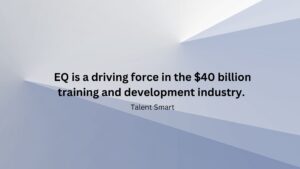
Why is EQ vital in the workplace?
In today’s dynamic workplace, the significance of Emotional Intelligence (EQ) has become increasingly evident, surpassing the traditional emphasis on intellectual abilities measured by Intelligence Quotient (IQ). Unlike IQ, which primarily assesses cognitive capabilities, EQ focuses on understanding and managing emotions, both one’s own and those of others. This shift in perspective recognizes the complex interplay of emotions within professional settings and positions EQ as a critical factor for success.
The evolving nature of work, characterized by collaboration, diverse teams, and rapid changes, demands a more nuanced and holistic skill set. EQ plays a pivotal role in navigating these complexities. This workshop course aims to delve into the profound reasons why EQ matters in the workplace. It will explore how individuals with high EQ exhibit enhanced interpersonal skills, empathy, and self-awareness, contributing to more effective leadership.
Leaders with a keen sense of emotional intelligence are better equipped to inspire and motivate teams, fostering a positive and productive work environment. Additionally, EQ influences team dynamics by promoting effective communication, conflict resolution, and collaboration. The workshop will illuminate how a high EQ can be a transformative force in shaping workplace culture, promoting resilience, adaptability, and a strong sense of cohesion among team members.
By understanding and harnessing the power of emotional intelligence, individuals and organizations can not only thrive in the modern workplace but also build a foundation for sustained success in an ever-changing professional landscape.

Here’s a snapshot of some statistics on why Emotional intelligence is vital in the workplace:
1. According to TalentSmart, About 58% of job success is attributed to emotional intelligence. This compelling statistic underscores the significance of emotional acumen in professional accomplishments, urging businesses to cultivate these skills actively for enhanced workforce effectiveness.
2. World Economic Forum listed emotional intelligence as one of the top 10 skills needed by 2020. This indicates the critical importance of EQ, making soft skills not just useful but crucial for future workplace success.
3. 75% of Fortune 500 companies use emotional intelligence training and testing, highlighting its value as a key player in corporate strategies, enhancing workplace performance and culture.
4. Multi Health Systems’ Financial Study shows that managers with high EI ratings generate 20% more annual revenue, emphasizing the direct correlation between emotional intelligence and business success.
5. According to TalentSmart, each point increase in EI adds $1300 to an annual salary, showcasing the economic benefits of enhanced emotional intelligence. Similarly, according to a PayScale report, people who understand emotions earned $28,000 more annual income on average.
6. University of Haifa’s research shows high emotional intelligence can reduce job burnout by 36%, offering hope to combat workplace stress by nurturing emotional intelligence.
7. Harvard Business Review study shows 70% of the time, individuals with average IQs outperform those with the highest IQs, attributing this phenomenon to emotional intelligence, shedding light on the pivotal role of EI in professional success.
8. According to TalentSmart, 90% of high performers possess high EI, cementing the connection between emotional intelligence and workplace excellence.
9. According to the Workplace Bullying Institute, 61% of bullies were identified as bosses, often with low emotional intelligence.
10. A Businessolver report shows that 96% of employees believe showing empathy (a component of EI) is a critical way to boost employee retention.
Understanding EQ vs. IQ:

While IQ measures cognitive abilities and problem-solving skills, EQ addresses the realm of emotions, encompassing self-awareness, self-regulation, empathy, social skills, and motivation. The ability to navigate one’s own emotions and those of others is increasingly recognized as a fundamental aspect of personal and professional growth in the following areas:
Leadership Effectiveness:
Leadership is not merely about making strategic decisions; it’s about inspiring and influencing others. Leaders with high EQ possess a heightened understanding of their own emotions, allowing them to respond to challenges with composure and resilience. Moreover, they excel in empathizing with their team members, creating an environment of trust, collaboration, and open communication. In essence, EQ is the cornerstone of effective leadership, enabling leaders to connect authentically with their teams, foster innovation, and navigate the complexities of interpersonal relationships within the organizational framework.
Team Dynamics and Collaboration:
In a world where cross-functional collaboration is the norm, the ability to navigate social interactions and build strong relationships is paramount. Teams comprised of emotionally intelligent individuals are better equipped to manage conflicts constructively, communicate effectively, and collaborate seamlessly. EQ fosters a culture of mutual respect and understanding, where diverse perspectives are not just acknowledged but celebrated, leading to heightened creativity and productivity within the team.
Adaptability and Resilience:
The modern workplace is characterized by rapid change and uncertainty. Those with high EQ are adept at navigating ambiguity, displaying resilience in the face of challenges. They can manage stress, remain focused under pressure, and lead their teams through adversity. In contrast, individuals with lower EQ may find it challenging to cope with change, leading to decreased morale and diminished performance.
Client and Stakeholder Relationships:
The ability to understand and respond to the emotions of clients, stakeholders, and colleagues is a valuable asset in professional relationships. High EQ individuals excel in building rapport, negotiating effectively, and navigating complex social dynamics. This not only enhances the reputation of the organization but also fosters long-lasting and mutually beneficial partnerships.
Workplace Culture and Employee Engagement:
An organization’s culture is shaped by the collective emotional intelligence of its workforce. A culture that values EQ is characterized by empathy, inclusivity, and a genuine concern for employee well-being. Such a positive culture not only attracts top talent but also promotes high levels of employee engagement, job satisfaction, and overall organizational success.

In summary,
EQ is not merely a soft skill; it is a powerful catalyst for personal and professional success. By recognizing and harnessing the power of EQ, individuals and organizations can position themselves not just for survival but for thriving in the dynamic and interconnected landscape of the contemporary workplace.

Case Study
IBM ran a research project on emotional intelligence, looking at the relationship between leaders’ emotional intelligence and levels of employee engagement among their direct reports.
There is a wealth of literature showing that high levels of employee engagement and a greater experience of positive emotions among employees define high-performing workplaces (shown in the graph below).
The relationship between a leader’s emotional intelligence and employee engagement (i.e., their ability to perceive, understand and manage emotions) helps facilitate a high-performance workforce where people are engaged and have positive emotional experiences.
Using Emotional Intelligence 360-degree Assessment, over 200 leaders of people within the organization were assessed. The emotional intelligence of Total emotional intelligence scores, as rated by others, were determined and averaged.
The engagement of 438 employees reporting to this leadership group was also assessed. This particular Employee Engagement Survey measures an individual’s intellectual and emotional commitment to their work and the organization. It is measured empirically by asking employees to indicate the extent to which they demonstrate the following four value-creating behaviors (two questions measure each as shown below):
Results:
There was a strong positive relationship between leaders’ emotional intelligence and employee engagement.
It is clear that being average or low in emotional intelligence results in wide and varying levels of employee engagement where employees are disengaged, not engaged, and engaged. These types of engagement scores are typical of low and average-performing organizations. Conversely, high levels of emotional intelligence, indeed total emotional intelligence scores above the 75th percentile, result in consistently high engagement scores.
These types of engagement levels among employees are typical of high-performance organizations. Indeed, Gallup’s research has shown that organizations with this type of engagement level earn 3.9 times earnings per share, greater than organizations with wide and varied engagement results.
How Does Emotional Intelligence Practically Matter at Work?
Think for a moment: A Horrible Boss.
Picture a situation where this boss consistently belittles employees, dismisses their concerns, and shows no empathy or understanding towards their struggles. Imagine this boss’s negative impact on the team’s morale and productivity, creating an environment of fear and stress.
Consider how such a toxic atmosphere affects your well-being, motivation, and job satisfaction.
In fact, research shows that bad bosses are the number one reason why people leave their jobs. Whether it’s a boss who micromanages, criticizes everything you do, or fails to provide support and guidance, a bad boss can be a major source of stress and frustration.

EQ is more than just a buzzword; it’s the bedrock of meaningful connections and effective communication. It fosters empathy, enhances social skills, and cultivates resilience, enabling individuals to respond to life’s challenges with grace and understanding.
Let’s quickly examine the case of Microsoft CEO Satya Nadella. The company’s culture clearly changed when Nadella took over in 2014, emphasizing teamwork and empathy, which is a sign of high emotional intelligence. He frequently stresses understanding clients’ experiences and picking up knowledge from them. “EQ trumps IQ in the long run,” he asserts. Microsoft has reached new heights under his leadership. Under the compassionate and emotionally astute leadership of Nadella, Microsoft’s market value surged, enabling it to reclaim its ranking as one of the most valuable companies globally.
Artificial Intelligence and Emotional Intelligence
With the hype and rapid integration of AI into businesses, you may be wondering why we are taking time to build EQ competencies.
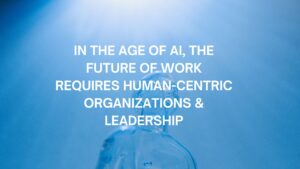
There’s no doubt that technological advancements are rapidly reshaping the landscape of work and interpersonal interactions. However, EI stands out as a critical human skill that complements the capabilities of machines. As AI becomes increasingly integrated into various aspects of our lives, the need for emotional intelligence becomes more pronounced for several compelling reasons.
1. Human-Machine Collaboration:
AI excels in tasks that involve data analysis, pattern recognition, and problem-solving. However, it lacks the innate ability to understand and navigate the complexities of human emotions. Emotional intelligence becomes essential in facilitating effective collaboration between humans and machines. Individuals with high EI can better communicate, lead, and work alongside AI systems, ensuring a harmonious integration of human and technological capabilities.
2. Empathy in Customer Interaction:
In customer-centric industries, emotional intelligence plays a pivotal role in enhancing user experiences. AI may handle routine tasks and provide information, but it often falls short in understanding and responding to the emotional nuances of customer interactions. Businesses that prioritize emotional intelligence can create more empathetic and personalized customer experiences, fostering stronger connections and customer loyalty in an era where AI-driven customer service is prevalent.
3. Leadership in Technological Transformation:
Leadership in the age of AI requires a keen understanding of human emotions to navigate the challenges and opportunities presented by technological transformations. Leaders with emotional intelligence can inspire and motivate their teams, fostering adaptability and resilience in the face of AI-driven changes. The ability to communicate a compelling vision, understand employee concerns, and manage the emotional impact of technological shifts is integral to successful leadership in this dynamic environment.
4. Ethical Decision-Making:
As AI systems make increasingly complex decisions, ethical considerations become paramount. Emotional intelligence is crucial in navigating the ethical dimensions of AI, as it enables individuals to consider the human implications of technological choices. Those with high EI are better equipped to address ethical dilemmas, balancing the potential benefits of AI with societal values and human well-being.
5. Emotional Resilience in Uncertain Times:
The rapid pace of technological change can create uncertainty and anxiety in the workforce. Emotional intelligence contributes to emotional resilience, enabling individuals to adapt to change, manage stress, and maintain a positive outlook. In the age of AI, where job roles may evolve and industries transform, emotional resilience becomes a valuable asset for individuals navigating the uncertainties of a technologically driven future.
In summary, emotional intelligence is essential in the age of AI because it complements and enhances the unique qualities of human cognition and interaction.
Models of Emotional Intelligence:
Several models of emotional intelligence have been proposed over the years, each offering a unique perspective on understanding and measuring emotional intelligence. Some of the prominent models include:
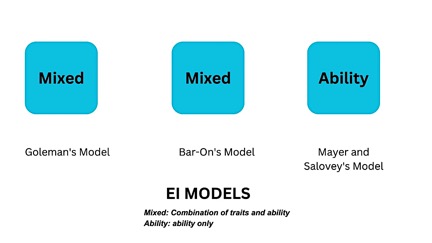
1. Goleman’s Model: Daniel Goleman’s model of emotional intelligence includes a combination of emotional and social competencies. It encompasses self-awareness, self-regulation, motivation, empathy, and social skills. It focuses on behavioral traits and self-perception, emphasizing the role of emotional intelligence in personal and interpersonal effectiveness.
2. Bar-On’s Model: Developed by Reuven Bar-On, this model of emotional intelligence includes emotional and social functioning as well-being indicators. It incorporates various emotional and social competencies, self-perception, self-expression, interpersonal, decision-making, and stress management skills. Bar-On’s model highlights the interplay between emotional intelligence and overall psychological well-being integration for Leadership Development:
3. Mayer and Salovey’s Model: Salovey and Mayer’s original model defines emotional intelligence based on four branches: perceiving emotions, using emotions to facilitate thinking, understanding emotions, and managing emotions. This model emphasizes the cognitive aspects of emotional intelligence and highlights the importance of emotional information processing.
Understanding the Models:
The ability model of emotional intelligence focuses on an individual’s capacity to perceive, understand, and manage emotions, emphasizing cognitive abilities.
In contrast, the mixed model incorporates not only cognitive elements but also personal and social competencies. Developed by Daniel Goleman, the mixed model includes self-awareness, self-regulation, motivation, empathy, and social skills, encompassing both cognitive and emotional aspects. While the ability model measures emotional skills as cognitive abilities, the mixed model provides a more holistic view by incorporating a broader range of emotional and interpersonal competencies for a comprehensive understanding of emotional intelligence.
The Bar-On model, developed by Reuven Bar-On, is considered a mixed model of emotional intelligence. Bar-On’s model includes a combination of emotional and social competencies, as well as personality traits, in its assessment. It encompasses a wide range of factors, including intrapersonal, interpersonal, adaptability, stress management, and general mood. This holistic approach distinguishes it as a mixed model, emphasizing not only cognitive abilities related to emotions but also personal and social skills, providing a comprehensive perspective on emotional intelligence.
In this workshop (and in subsequent workshops), we will synthesize Goleman’s Model and Bar-On’s Model into a comprehensive application and developmental process. Both of these are considered a mixed model.


Exercise – Emotion Spectrum
•
• Writing utensils
1.
•
• Instruct participants to write down one emotion they are currently feeling or have recently experienced. Encourage them to be honest and specific.
2.
•
• Ask each participant to read aloud the emotion they received. Emphasize that they do not have to reveal who wrote it.
• As each emotion is shared, create a collective list on a flip chart or whiteboard.
3.
•
• Facilitate a brief open discussion about commonalities or differences in the emotions shared. Encourage participants to consider how understanding these emotions can contribute to a more emotionally intelligent team.
Course Manual 2: EQ Leadership
The Link Between Emotional Intelligence (EQ) and Leadership
The link between Emotional Intelligence (EQ) and effective leadership is well established in organizational dynamics. Leaders with high levels of EQ exhibit a profound understanding of their own emotions and those of others, enabling them to navigate complex interpersonal relationships and lead with empathy.
To elaborate on the link between EQ and Leadership, let’s look at a case study conducted by Six Seconds for FedEx.

Case Study – EQ for the Leadership of FedEx Express
Background:
FedEx Express is the world largest cargo airlines with over 290,000 employees moving seven million packages each day with 600 flights a day. One of the top 20 Fortune “Most Admired” for a decade, FedEx stands among the world’s successful enterprises.
While founder Fred Smith was focused on logistics and speed, from the start he believed that people were the key to business, and that leadership is about continuous growth: “Leaders get out in front and stay there by raising the standards by which they judge themselves – and by which they are willing to be judged.” This vision has translated to the “PSP Philosophy” – People-Service-Profit – which drives FedEx Express today.
The company sees that the people-side of leadership has grown more complex, and looking to the future, is committed to developing leadership capabilities to manage the changing workforce. The goal is leaders who are better at influence, make decisions that are both quick and accurate, and are able to build a culture where people feel the dedication and drive for exceptional performance in a way that’s sustainable and creates real value for all stakeholders.
To measure leadership performance, FedEx Express administers “SFA,” an annual survey where every employee can provide feedback about managers. SFA themes include respect, fairness, listening, and trust – leadership responsibilities that are all about relationships and emotions. This commitment to people-first leadership created an interest in “emotional intelligence” as a learnable skillset that would equip managers to deliver the FedEx way.
Implementation:
Even though the leadership training was state of the art — among the top ten in the world – the FedEx Global Leadership Institute is charged with continuously updating and innovating in keeping with that Fred Smith call for continuously “raising the standards.” Located near the company’s primary hub in Memphis, TN, the Global Leadership Institute, GLI, serves as the leadership university for FedEx Express.
In 2005, GLI implemented a new training program for managers to consider the impact they wished to have as leaders – the legacy they were creating. A core component of the LEGACY course was a module on emotional intelligence using the Six Seconds Emotional Intelligence Assessment, the SEI. LEGACY results were very positive, in part because of the effectiveness of the Six Seconds Model as an actionable process.
Reviewing data from LEGACY in 2009 and 2010, the GLI team identified that a few key EQ competencies were essential to strengthen “bench strength” and build the leaders who will move up the chain. Without revealing confidential details, the FedEx culture has focused on speed — which is a key part of the company’s success. As leaders move up in the organization, the need for speed has to be balanced with a more careful, collaborative decision-making process to achieve sustainable success.
With this in mind, under the leadership of SVP Shannon Brown, the company wanted a world-class leadership program that would move the company to be one of the top five in the world. With the support of Dennis Reber, Managing Director, and Ray Murphy, Manager, of the Global Leadership Institute, FedEx decided to increase the emotional intelligence focus of the leadership training and deliver a new course called LEAD1 to put EQ into action at the frontlines. All new FedEx Express managers would receive the program to provide a solid people-first foundation upon which to build their leadership careers.
The FedEx GLI team designed LEAD1 as a five-day course with a six-month follow up coaching process built around the SEI. Through the in-person training, participants learn about key concepts in FedEx leadership and what it means to lead people. In an extremely faced-paced, task-focused environment, a common challenge for managers is losing sight of the relational dynamics that ultimately sustain team performance. To build a team where people give their “discretionary effort,” task-based management is insufficient: people-leadership is required. This means forming a connection between people at an emotional level. Emotional intelligence provides the insight and skill to allow for this strategic use of feelings. In LEAD1, the new managers focus on how emotional intelligence will assist them to show up as leaders by managing themselves first, taking charge of their own emotions and behaviors so they can be effective role models and influencers.
The six month coaching process begins with a one-to-one debrief of the participant’s SEI profile as a framework for goal setting. The new manager identifies specific competencies to improve, as well as strengths to leverage, and how these can be employed to improve people-leadership. The coaching process is “specific customized,” meaning that while all participants are working within a shared framework of concepts and goals, each coach and participant work in partnership to develop personalized goals that can be made actionable. Part of the effectiveness of the coaching is that the coaches all now have several years of experience with emotional intelligence themselves, giving them added insight into what drives people.
At the end of the coaching process, participants re-take the SEI to clearly identify areas of progress, to set next goals, and provide accountability for the program.
Results:
Initial responses to the program are extremely positive. LEAD1 trained managers are showing increased ability to push the FedEx strategy and the “People First” leadership philosophy. These insights and skills will shape the culture of FedEx for years to come. As Shannon Brown, Chief Diversity Officer for FedEx Express, and the senior HR leader for the organization puts it: “At FedEx Express, we’re committed to staying on the leading edge. For us, that’s always meant bringing out the best in people. As the business landscape becomes even more complex, we need additional capability. Leveraging the Six Seconds approach to emotional intelligence is helping us build a strategic asset that will let us maintain and strengthen our culture – which is essential to our competitive advantage.”
Quantitative Results:
Another measure of success is through analysis of the SEI assessments given at the start and end of the six-month program. Based on comparisons of eight LEAD1 cohorts, 106 individuals (on pre-tests), the group experienced a median increase of 8% to 11% in EQ competencies. A paired t-test of individuals’ pre-test and post-test comparisons shows P < 0.0001, indicating that statistically, the change is extremely significant.

In all the competencies of EQ (as measured by the SEI), there were a very substantial number of participants with major increases. In any group, some participants will be more fully engaged in the process; 44% of the participants experienced very large increases (10-50% improvements). The largest numbers of these were the areas of “Apply Consequential Thinking” with 54% of the participants are in this group of large increases, and “Exercise Optimism” with 57% of the participants improving from 10-50%.
The SEI measures eight competencies of emotional intelligence as well as six outcomes: Effectiveness, Influence, Decision-Making, Relationships, Quality of Life, and Health. Statistically, we know that variation in EQ predicts from 55-65% of the variation in these outcomes. This correlation was confirmed in this sample population, where 59.8% of the variation in outcome scores can be predicted by EQ scores:

Like the EQ scores, participants’ outcome scores increased significantly. Group average improvements range from 6-10%:

Again, the question arises, “What part of the group made serious improvements?”
The largest major improvements were in:
• Decision Making where 72% made major improvements.
• Quality of Life 60% made major improvements.
• Influence 58% made major improvements.
Qualitative Results
The results of LEAD1 have gone far beyond the workplace. Participants have shared numerous stories of using the EQ tools to cope with loss, reunite with family members, step up to become better parents, and even make dramatic changes to improve health and wellbeing. By supporting new managers in this way, FedEx gains by having more competent leaders – and also by showing its people that the company puts its values into action. In turn, this role models the kind of people-centered leadership that FedEx expects from all managers.
Conclusion:
The success of the project at FedEx offers several insights for other companies looking to gain value from emotional intelligence:
Link to what matters.
At FedEx, concepts like “discretionary effort” and the leadership requirements from the annual SFA survey create an internal “case” for emotional intelligence. The champions of this project have helped leaders see that the learnable skills of emotional intelligence are building blocks to create the kind of people-first leadership the company wants – which, in turn, increases economic value. This recognition has built support of the initiative at very senior levels.
Build internal capacity.
By developing an internal team of emotional intelligence practitioners, the company has been able to assimilate the concepts and skills of EQ and “translate” them to work within the company culture. Having a large, strong team of emotional intelligence coaches and trainers means this program can be delivered at a large scale, creating a new “strand of DNA” to support the desired organizational culture.
Walk the Talk.
The company tells supervisors to put people first, so the company puts people first. By supporting new managers to be good people, and investing in their growth right at the start of their management careers, FedEx senior leadership is providing a powerful role model.
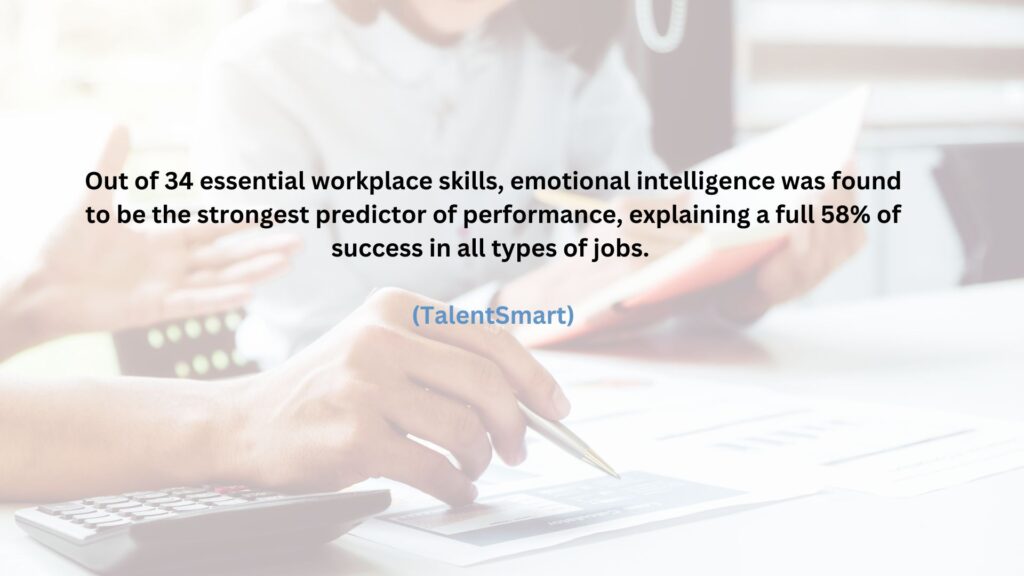
The link between Emotional Intelligence and leadership is undeniable. Emotional Intelligence (EQ) is a critical factor in effective leadership, playing a central role in shaping leaders’ abilities to navigate complex social dynamics, inspire teams, and drive organizational success. The relationship between EQ and leadership can be summarized as follows:
1. Self-Awareness and Self-Regulation: Leaders with high EQ possess keen self-awareness, enabling them to recognize and manage their emotions effectively. This self-regulation fosters resilience, adaptability, and calmness under pressure, essential qualities for making rational decisions and maintaining composure during challenging situations.
2. Empathy and Interpersonal Relationships: Leaders with strong EQ exhibit empathy, the ability to understand and share the feelings of others. This empathy facilitates genuine connections with team members, fostering trust, collaboration, and open communication. Leaders who can empathize with their employees are better equipped to address their concerns and motivate them towards shared goals.
3. Social Skills and Conflict Resolution: High EQ leaders excel in social skills, including effective communication, active listening, and conflict resolution. They can navigate interpersonal conflicts with tact and diplomacy, promoting harmony within the team. By fostering a positive and inclusive work environment, leaders with strong social skills enhance team cohesion and productivity.
4. Motivation and Inspirational Leadership: Leaders with high EQ are intrinsically motivated and possess a contagious enthusiasm for their work. Their positive outlook and resilience inspire and motivate others, encouraging a shared sense of purpose and dedication among team members. This motivational quality is pivotal in driving individuals and teams to achieve challenging objectives.
5. Adaptability and Change Management: In today’s rapidly changing business landscape, leaders must be adaptable. High EQ leaders are open to change, agile in their decision-making, and receptive to new ideas. Their ability to navigate change and guide their teams through transitions is crucial for organizational innovation and growth.
Leaders with high EQ exhibit self-awareness, empathy, social skills, motivation, and adaptability. By leveraging these emotional competencies, they create supportive work environments, build strong interpersonal relationships, inspire their teams, and effectively lead organizations toward sustainable success. Cultivating Emotional Intelligence is not just a desirable trait in leadership; it is an essential component for thriving in today’s complex and dynamic business world.
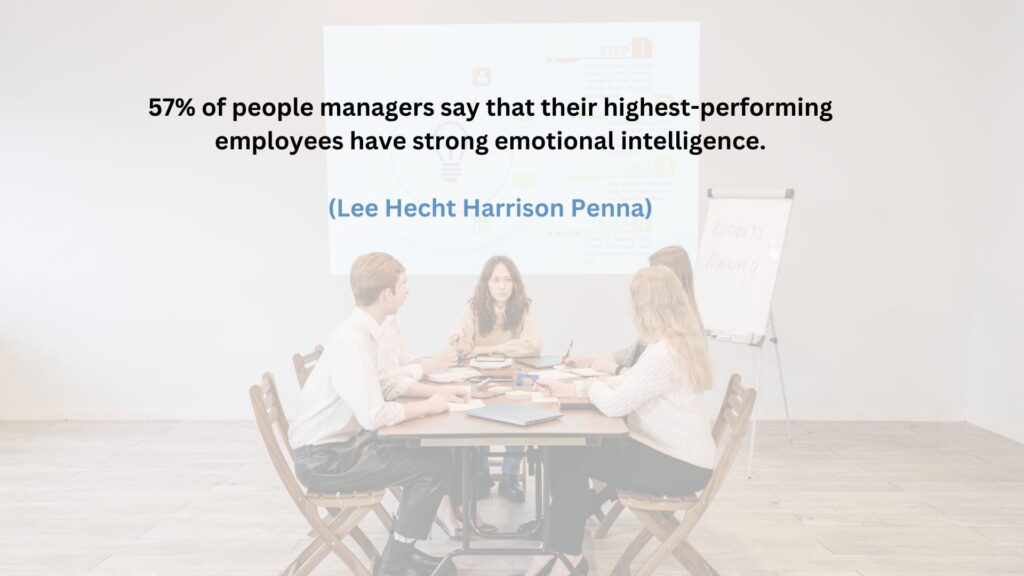
Scenario:
Meet Sarah.

Sarah, a seasoned professional with a technology company, was recently promoted to the position of Director of Operations due to her exceptional emotional intelligence and positive leadership attributes.
In her previous role as a team manager, Sarah consistently demonstrated a keen understanding of her own emotions and those of her team members. She fostered an open and transparent communication environment, encouraging team members to express their thoughts and concerns without fear of judgment. This high level of emotional intelligence created a workplace culture where individuals felt valued and understood.
Sarah’s positive leadership attributes were particularly evident during a challenging project that faced unexpected setbacks. Instead of reacting with frustration or blame, she acknowledged the team’s efforts and openly discussed the challenges. Through empathetic communication, she helped team members navigate stress and disappointment, turning setbacks into learning opportunities.
Her ability to manage emotions in high-pressure situations impressed upper management. When faced with tight deadlines and increased workload, Sarah remained composed, focusing on solutions rather than dwelling on problems. Her emotional resilience inspired confidence in the team and contributed to the successful completion of the project.
Sarah’s leadership style was characterized by a high degree of empathy. She took the time to understand the personal and professional aspirations of her team members, tailoring her leadership approach to suit individual needs. This approach not only boosted team morale but also contributed to increased collaboration and a sense of unity within the team.
Recognizing the importance of employee well-being, Sarah implemented initiatives to promote work-life balance and offered support during challenging times. Her genuine concern for the holistic development of her team members created a positive work environment that significantly contributed to employee engagement and retention.
These positive leadership attributes did not go unnoticed by the company’s leadership. Impressed by her emotional intelligence, effective communication, and ability to inspire a positive workplace culture, they decided to promote Sarah to the role of Director of Operations. In her new position, Sarah continues to leverage her emotional intelligence to lead cross-functional teams, drive organizational success, and inspire a culture of collaboration and innovation.
EQ and Career Advancement
Emotional Intelligence (EQ) can significantly influence promotions and salary increases in the workplace.
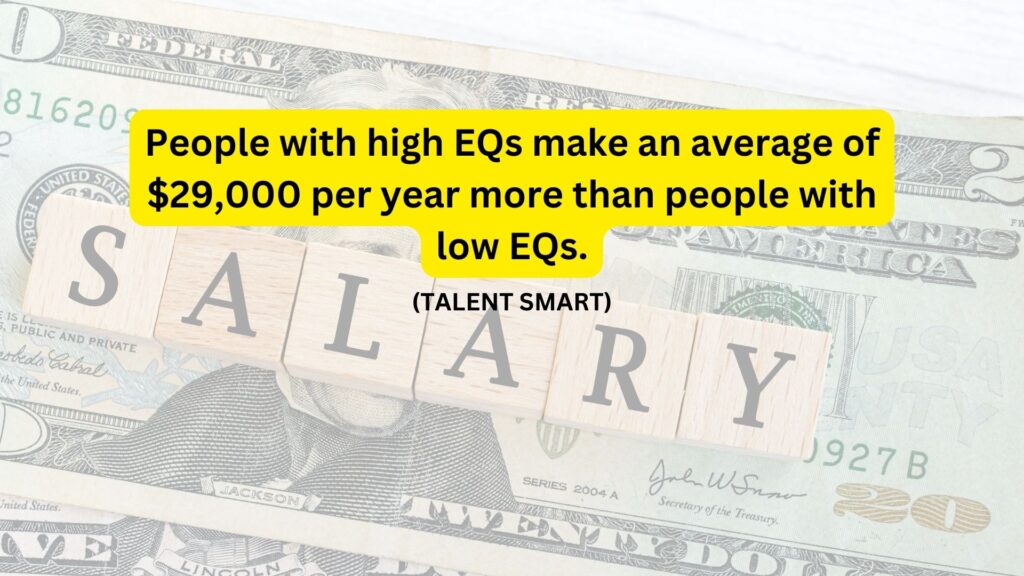
The statement that individuals with high Emotional Quotients (EQs) earn an average of $29,000 per year more than those with low EQs underscores the significant impact of emotional intelligence on financial success in the workplace. This correlation suggests that individuals who possess strong emotional intelligence skills are better equipped to navigate the complexities of interpersonal relationships, communication, and collaboration, which are crucial aspects of professional life. High EQ individuals tend to excel in areas such as self-awareness, empathy, and relationship management, contributing to improved team dynamics, effective leadership, and enhanced overall job performance. As a result, employers may recognize and reward these individuals with higher salaries, promotions, or other financial incentives. This finding highlights the tangible and measurable benefits of developing emotional intelligence, not only for personal well-being but also for career advancement and financial success in the professional world.
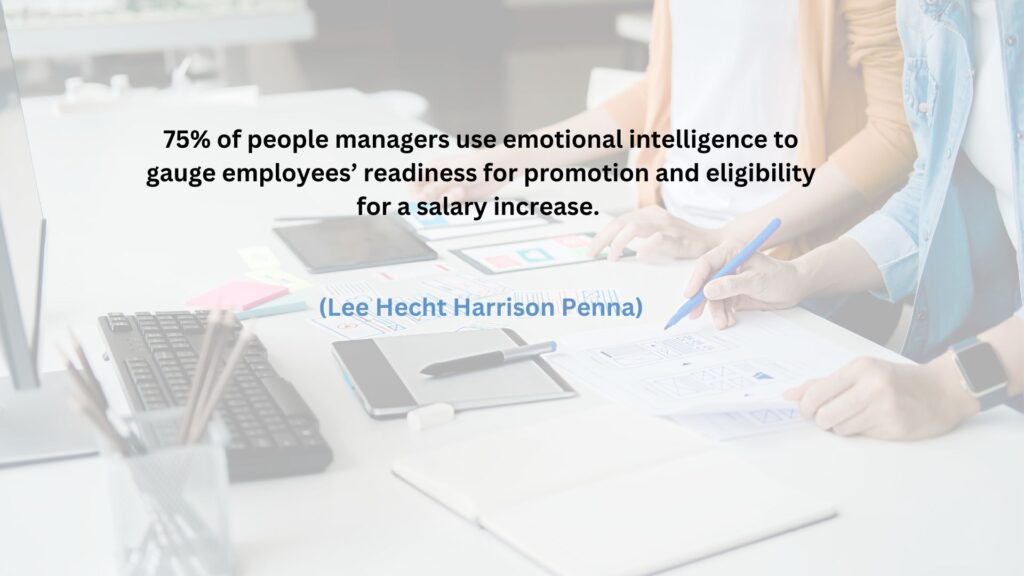
What are the Consequences of Low EQ Leadership?
Mark, a team leader in a fast-paced marketing agency, lacks emotional intelligence, and it negatively impacts the workplace. His communication style is abrasive and often dismissive, causing a breakdown in team dynamics. Team members feel discouraged from sharing ideas due to the hostile environment, leading to a decline in collaboration and creativity. Moreover, Mark struggles with decision-making. His decisions are driven more by personal preferences than objective analysis, causing frustration among team members. The lack of empathy and understanding exacerbates conflicts, as Mark fails to consider the emotional impact of his decisions. Overall, the toxic communication and poor decision-making contribute to low morale, decreased productivity, and increased turnover, highlighting the detrimental consequences of a leader with insufficient emotional intelligence.
Leaders with low Emotional Intelligence (EQ) can face various consequences that negatively impact both their personal effectiveness and the overall dynamics within their teams and organizations. Some of the key consequences include:
1. Poor Communication: Leaders with low EQ may struggle to effectively communicate with their team members. This can lead to misunderstandings, confusion, and a lack of clarity regarding expectations and goals.
2. Limited Empathy: Empathy is a crucial component of EQ, and leaders lacking in this attribute may struggle to understand and connect with the emotions of their team members. This can result in a lack of support, trust, and camaraderie within the team.
3. Ineffective Conflict Resolution: Low EQ leaders may find it challenging to navigate and resolve conflicts within the team. The inability to understand and manage emotions can exacerbate conflicts, leading to a toxic work environment and decreased team cohesion.
4. Difficulty in Building Relationships: Building positive and trusting relationships is a fundamental aspect of leadership. Leaders with low EQ may struggle to form meaningful connections with team members, peers, and superiors, hindering collaboration and teamwork.
5. Inability to Manage Stress: Leadership roles often come with high levels of stress and pressure. Leaders with low EQ may struggle to manage their own stress, leading to burnout and a negative impact on decision-making and overall performance.
6. Lack of Adaptability: EQ involves adaptability and flexibility in response to changing circumstances. Leaders with low EQ may resist change, leading to stagnation and an inability to guide their teams through evolving challenges.
7. Reduced Team Morale and Motivation: A leader’s emotional state and expression significantly influence the morale and motivation of the team. Low EQ leaders may inadvertently create a negative and demotivating work environment, resulting in decreased productivity and job satisfaction.
8. Limited Leadership Effectiveness: Overall, leaders with low EQ may struggle to inspire, motivate, and lead their teams effectively. This can result in decreased performance, increased turnover, and a negative impact on the organization’s success.
A culture of low EQ generally leads to a Toxic Work Environment.

What is a Toxic Workplace?
A toxic workplace refers to an environment where negative behaviors, attitudes, and dynamics prevail, creating a harmful and detrimental atmosphere for employees. In a toxic workplace, various factors contribute to an unhealthy and stressful work environment. Key characteristics of a toxic workplace include:
1. Poor Leadership: Leadership that is ineffective, unsupportive, or displays toxic behaviors can set the tone for the entire workplace. This may involve a lack of communication, favoritism, or bullying by supervisors.
2. Lack of Trust: Trust is essential in a healthy work environment. In toxic workplaces, trust is often eroded due to inconsistent communication, broken promises, and a lack of transparency.
3. Unhealthy Competition: While healthy competition can drive performance, a toxic workplace often fosters cutthroat competition, undermining teamwork and collaboration. Employees may feel pressured to prioritize personal success over collective goals.
4. Bullying and Harassment: Acts of bullying, harassment, or discrimination create a toxic atmosphere. This can include verbal abuse, intimidation, or unfair treatment based on factors such as race, gender, or age.
5. High Turnover: Toxic workplaces often experience a high rate of employee turnover. The negative environment may drive employees away, leading to a constant cycle of recruitment and departure.
6. Poor Communication: Ineffective communication, whether it’s unclear directives, lack of feedback, or withholding information, contributes to a toxic atmosphere. Miscommunication can lead to confusion and frustration among employees.
7. Micromanagement: Constant supervision, micromanaging, and a lack of autonomy can create stress and frustration among employees. This management style can stifle creativity and hinder productivity.
8. Lack of Recognition: Failing to acknowledge and appreciate employees’ contributions can demoralize the workforce. A toxic workplace may lack a positive feedback culture and fail to recognize the achievements of its employees.
9. Fear of Retaliation: Employees in a toxic workplace may fear reprisals for speaking out against issues or reporting misconduct. This fear can lead to a culture of silence and compliance.
10. Unrealistic Expectations: Setting unrealistic expectations, tight deadlines, and demanding excessive work hours without proper support can contribute to stress and burnout.
Recognizing the signs of a toxic workplace is crucial for both employees and leaders. Addressing toxic elements and promoting a positive work culture through open communication, fair leadership, and policies that prioritize employee well-being can help transform a toxic environment into a healthy and thriving workplace.
EQ training can play a crucial role in mitigating toxicity at work by fostering a positive and emotionally intelligent workplace culture.

Here are several ways EQ training can contribute to addressing toxicity:
1. Improved Self-Awareness: EQ training helps individuals become more aware of their own emotions, strengths, and weaknesses. By understanding how their actions impact others, employees can gain insights into their own behavior, reducing unintentional toxic behaviors.
2. Enhanced Communication Skills: Effective communication is a cornerstone of a healthy workplace. EQ training equips employees with better communication skills, including active listening, assertiveness, and expressing emotions constructively. Clear and empathetic communication helps prevent misunderstandings and conflicts.
3. Empathy Building: Empathy is a key component of EQ. Training encourages employees to understand and share the feelings of their colleagues. This fosters a supportive environment where individuals feel heard and understood, reducing the likelihood of toxic interactions.
4. Conflict Resolution: Toxic workplaces often suffer from unresolved conflicts. EQ training provides tools for managing conflicts constructively, teaching employees to address issues directly and find mutually beneficial solutions.
5. Stress Management: Toxic workplaces can be stressful, contributing to burnout and negative behaviors. EQ training includes stress management techniques, helping employees cope with stress in healthy ways and promoting overall well-being.
6. Leadership Development: Toxicity is often associated with poor leadership. EQ training for leaders focuses on developing emotionally intelligent leadership skills, including empathy, motivation, and effective decision-making. Strong leadership sets a positive tone for the entire organization.
7. Cultural Transformation: EQ training can contribute to a cultural shift within the organization. By promoting emotional intelligence at all levels, from leadership to frontline employees, organizations can develop a culture of respect, collaboration, and inclusivity.
8. Increased Self-Regulation: Toxic behaviors often stem from a lack of emotional control. EQ training helps individuals enhance their self-regulation, enabling them to manage stress, frustration, and other negative emotions more effectively.
9. Team Building: Building strong, cohesive teams is essential for a healthy workplace. EQ training emphasizes the importance of teamwork, collaboration, and understanding team dynamics, fostering a positive group culture.
10. Promotion of a Positive Work Environment: EQ training encourages positive behaviors and attitudes. As employees become more emotionally intelligent, they contribute to creating a workplace that values positivity, support, and a sense of community.
The EQ Leader training program will cover all these key aspects in order to help you positively impact your work life. The curriculum is designed to equip you with the tools and skills needed to cultivate a healthy and emotionally intelligent workplace environment.
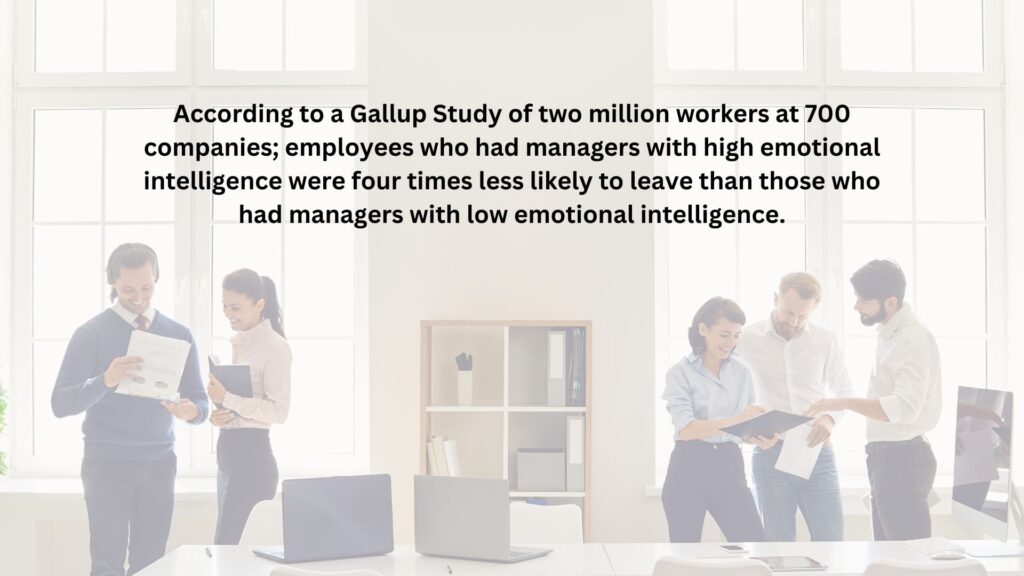
Leading with Emotional Intelligence in Management
The application of emotional intelligence to management and leadership is arguably the most successful and significant when it trickles down from the top. It creates a ripple effect that spreads throughout an organization.
A leader with high EQ can do the following:
1. Communicate their vision more clearly.
2. Speak with greater persuasion and inspiration
3. Responds appropriately to complex and stressful situations at work.
4. Regulate their own emotions as well as helping employees to regulate theirs, to some degree.
All of this contributes directly—or indirectly—to a supportive and thriving workplace.
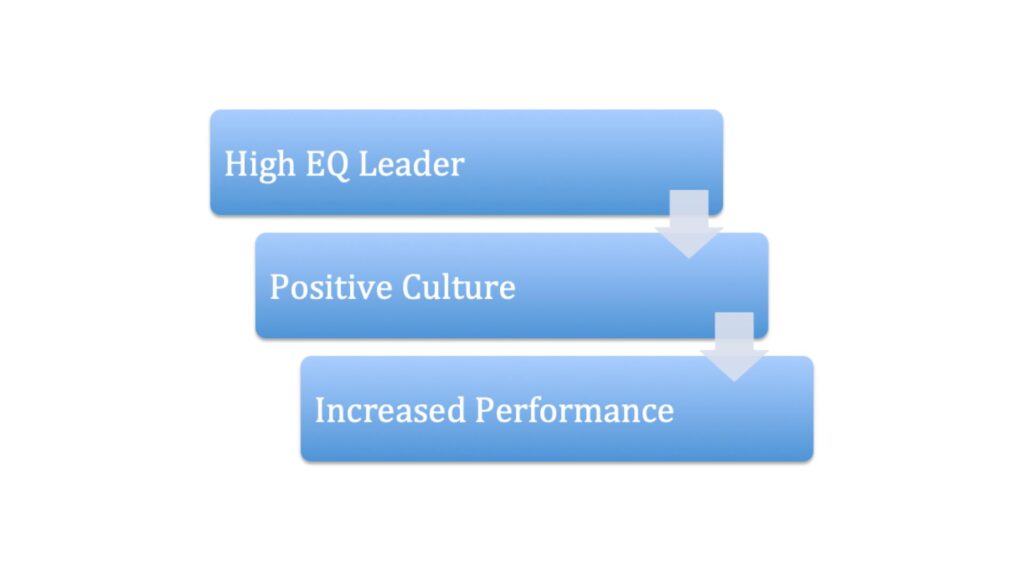
EQ Application:
Everyone has bad days occasionally, even at work. An excellent way to assess someone’s EQ is to see how he or she handles difficult situations with coworkers or other employees.
Let’s look at a scenario:
It’s a Wednesday morning at the office, and the atmosphere is usually buzzing with energy. However, today, Emily, a normally cheerful and diligent co-worker, appears visibly distressed. As she walks in, with her shoulders slumped and tired facial expression. She heads straight to her desk without the usual morning greetings.
Here are two categorical responses from a Low EQ and a High EQ leader:
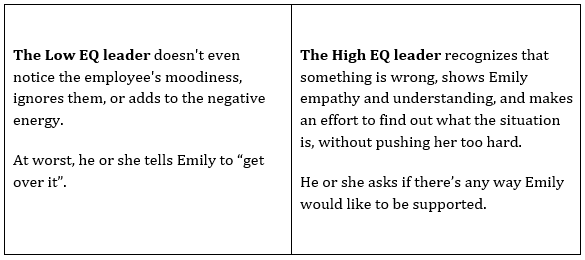
The Controversy about Emotions in Workplace
“Emotions in the workplace” is a controversial topic. One prevalent misconception is the belief that emotions have no place in the workplace and should be completely suppressed to maintain a strictly professional demeanor. This myth implies that showing vulnerability or expressing genuine feelings can be perceived as a sign of weakness, hindering career progression and professional relationships. On the contrary, another widespread myth suggests that emotions should always be openly expressed, with the belief that unfiltered emotional expression fosters authentic communication and understanding among colleagues.
Additionally, there exists a myth that certain emotions, such as anger or frustration, are entirely negative and detrimental to workplace harmony. In reality, emotions are complex and multifaceted, often serving as valuable cues about individual and team dynamics.
It’s important to gain a nuanced understanding of emotions in the workplace.
Why Emotions Matter at Work:
Establishing meaningful personal connections necessitates constructing relationships based on the capacity to express emotions clearly and accurately. When our judgment is clouded by an inability to understand our emotions and their impact on our actions in the workplace, we often become defensive. This defensiveness leads to miscommunication, erodes trust, and complicates problem-solving. When employees perceive that they cannot openly share their emotions due to a lack of transparency from leadership, it fosters a counterproductive and insular organizational culture.

Debunking myths about emotions in the workplace
Let’s quickly look at a list of 9 myths common in the workplace:
1. Myth: Emotions have no place in the workplace.
Debunking Fact: Emotions are a natural part of being human and cannot be completely separated from work. Acknowledging and managing emotions positively can enhance workplace relationships and decision-making.
2. Myth: Showing emotions is a sign of weakness.
Debunking Fact: Expressing emotions appropriately demonstrates emotional intelligence and self-awareness. It takes strength to be vulnerable and open about one’s feelings, promoting empathy and understanding among colleagues.
3. Myth: Positive emotions are always beneficial, while negative emotions are detrimental.
Debunking Fact: All emotions, whether positive or negative, convey valuable information. Negative emotions can highlight areas needing improvement, and addressing them constructively can lead to positive outcomes and growth.
4. Myth: Emotions should be suppressed or ignored for professional success.
Debunking Fact: Suppressing emotions can lead to stress, burnout, and decreased productivity. Acknowledging emotions and managing them effectively leads to better decision-making, problem-solving, and overall well-being.
5. Myth: Addressing emotional issues in the workplace is the sole responsibility of HR.
Debunking Fact: Everyone in the workplace shares the responsibility of creating a positive emotional atmosphere. Colleagues and managers alike can support each other by actively listening, showing empathy, and offering assistance when needed.
6. Myth: Rationality and emotions are completely separate and do not influence each other.
Debunking Fact: Emotions and rationality are intertwined. Emotional states can influence decision-making and problem-solving. Being aware of one’s emotions can lead to more rational and thoughtful decisions.
7. Myth: Venting anger and frustration is an acceptable trait in leaders.
Debunking Fact: Venting emotions without a constructive approach can escalate conflicts and harm relationships. Encouraging open communication and teaching coping strategies, such as deep breathing or taking a break, are healthier ways to manage strong emotions.
8. Myth: Emotions do not impact team dynamics or collaboration.
Debunking Fact: Emotions significantly influence team cohesion, communication, and collaboration. Positive emotions enhance teamwork, while unresolved negative emotions can create tension and hinder productivity. Addressing emotions positively fosters a healthier team environment.
9. Myth: Emotional intelligence is not as important as technical skills in the workplace.
Debunking Fact: Emotional intelligence is equally crucial for workplace success. Employees with high emotional intelligence can navigate social complexities, manage conflicts, and build strong relationships, contributing to a positive work environment and overall organizational success.


Exercise: Low vs. High EQ Leader
1.
•
• Assign roles within each group, such as a team leader, a team member responsible for a deadline, and others as active listeners.
2.
(Low EQ leader)
(High EQ leader)
•
3.
•
• Encourage participants to actively listen, and take into account their own emotions during the discussion.
4.
•
• Ask each team to share their experiences and discuss how they navigated emotions within the team meeting.
• Encourage participants to reflect on the importance of emotional intelligence in effective team communication and problem-solving.

Course Manual 3: Goleman Model
What is Emotional Intelligence?
According to Daniel Goleman’s model, emotional intelligence refers to the ability to recognize, understand, manage, and influence one’s own emotions, as well as the emotions of others.
Goleman’s model combines various emotional and social skills into a comprehensive framework.
The model is often referred to as the “mixed model” because it integrates various elements from different sources to define emotional intelligence. Unlike some other models that might focus primarily on cognitive aspects or strictly behavioral components, Goleman’s model combines both cognitive and emotional competencies, reflecting a broader spectrum of skills and abilities.
The term “mixed” signifies the integration of five key components, each representing a distinct set of emotional competencies, each contributing to an individual’s overall emotional intelligence.

The 5 Components of Emotional Intelligence
1. Self-Awareness: Self-awareness forms the foundation of emotional intelligence. It involves recognizing and understanding one’s own emotions, strengths, weaknesses, values, and goals. Individuals with high self-awareness can accurately assess their feelings and understand how these emotions influence their thoughts and behaviors.
2. Self-Regulation or Management: Self-regulation refers to the ability to manage and control one’s emotions, impulses, and reactions, even in challenging situations. It involves staying calm under pressure, avoiding impulsive decisions, and handling stress effectively. People with strong self-regulation skills can maintain composure, think clearly, and make rational choices, fostering healthier relationships and more productive interactions.
3. Social Awareness: Social awareness involves recognizing and understanding the emotions, needs, and concerns of others. This component emphasizes empathy, active listening, and the ability to perceive emotional cues in both verbal and non-verbal communication. Individuals with high social awareness can intuitively grasp the emotions of those around them, fostering stronger connections, resolving conflicts, and demonstrating genuine compassion.
4. Relationship Management: Relationship management revolves around effectively navigating social interactions and relationships. This component includes skills such as communication, conflict resolution, teamwork, and inspirational leadership. People adept in relationship management can build and maintain positive relationships, inspire and influence others, and handle interpersonal challenges with tact and empathy. Strong relationship management skills are vital for effective collaboration and leadership in various contexts.
5. Motivation: Motivation is the driving force behind one’s actions, goals, and achievements. In the context of emotional intelligence, it refers to an intrinsic passion for work, a strong desire to learn and improve, and the ability to remain optimistic and resilient in the face of setbacks. Highly motivated individuals set challenging goals, persevere in the pursuit of objectives, and inspire others with their enthusiasm. Motivation propels personal growth, enhances performance, and fosters a positive, can-do attitude in both individuals and teams.

Daniel Goleman’s model of Emotional Intelligence (EI) has had a profound impact on various fields by providing a framework to understand, measure, and enhance emotional intelligence. Here’s a breakdown of its influence:
1. Leadership: Goleman’s EI model has significantly influenced leadership development. Traditional notions of leadership often prioritized technical expertise, but Goleman’s framework broadens this perspective. Today, leaders are acknowledged for their emotional intelligence— their ability to perceive, understand, and manage emotions, both in themselves and others. Leadership development programs now integrate EI concepts, recognizing that effective leaders must navigate complex social dynamics, build strong relationships, and inspire teams through empathy.
2. Education: In the domain of education, the EI model has been embraced to cultivate emotional intelligence in students. Recognizing the importance of emotional skills alongside academic achievements, educators have integrated EI principles into curricula to enhance students’ social and emotional learning (SEL). This approach aims to prepare students for success not only academically but also in their personal and professional lives.
3. Personal Development: Goleman’s model has become a cornerstone in the domain of personal development and self-help. Individuals seek to improve their emotional intelligence as a means to enhance their overall well-being, relationships, and career success. Books, workshops, and coaching often leverage Goleman’s framework to guide individuals in developing specific EI competencies.
4. Workplace Culture: Organizations have adopted Goleman’s EI model to foster healthier workplace cultures. Emphasizing the importance of empathy, communication, and collaboration, businesses recognize that employees with high emotional intelligence contribute to a positive work environment, increased productivity, and stronger team dynamics.
5. Human Resources: HR professionals use Goleman’s model in talent management, recruitment, and employee development. Understanding the emotional competencies required for specific roles helps in hiring individuals who not only possess the necessary technical skills but also align with the organization’s values and culture.
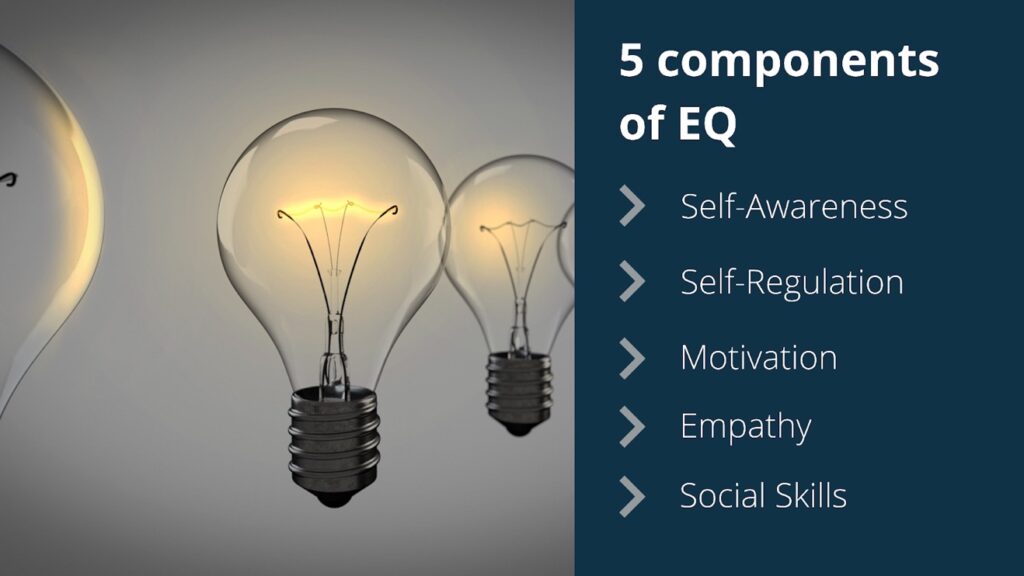
Identifying The 5 components of EQ at Work
Scenario:
Sarah is a team leader in a fast-paced marketing agency. One day, the team is working on a crucial project with a tight deadline. As the pressure mounts, one of Sarah’s team members, Alex, becomes increasingly stressed and starts making mistakes. Other team members are getting frustrated with Alex’s errors, and tension in the office is palpable.
Sarah notices Alex’s stress and takes a moment to talk privately with them. She listens actively, acknowledging Alex’s feelings without judgment.
During a team meeting, she encourages open communication, creating a safe space for team members to express their concerns and frustrations.
Despite the stressful situation, Sarah remains calm and composed. Sarah motivates the team by reminding them of the project’s importance and the value of their collective effort. She inspires them to focus on the end goal, reinforcing their sense of purpose and commitment.
Sarah addresses the conflict between team members by mediating discussions and finding common ground. She helps the team refocus on their shared objectives and encourages collaboration, ensuring that the team works together harmoniously towards the project’s success.
Can you identify the 5 components of EQ in the scenario?
Let’s look at the same scenario again, this time underscoring the components of Emotional Intelligence in Sarah as a leader.
Scenario:
Sarah is a team leader in a fast-paced marketing agency. One day, the team is working on a crucial project with a tight deadline. As the pressure mounts, one of Sarah’s team members, Alex, becomes increasingly stressed and starts making mistakes. Other team members are getting frustrated with Alex’s errors, and tension in the office is palpable.
Empathy: Sarah notices Alex’s stress and takes a moment to talk privately with them. She listens actively, acknowledging Alex’s feelings without judgment. By understanding Alex’s perspective, Sarah shows empathy, making Alex feel heard and valued.
Social Skills: Sarah uses her social skills to address the team’s frustration. During a team meeting, she encourages open communication, creating a safe space for team members to express their concerns and frustrations. By facilitating this dialogue, Sarah fosters a supportive team environment.
Self-Regulation: Despite the stressful situation, Sarah remains calm and composed. She manages her own emotions effectively, avoiding any negative reactions that could escalate the tension in the team.
Motivation: Sarah motivates the team by reminding them of the project’s importance and the value of their collective effort. She inspires them to focus on the end goal, reinforcing their sense of purpose and commitment.
Conflict Resolution: Sarah addresses the conflict between team members by mediating discussions and finding common ground. She helps the team refocus on their shared objectives and encourages collaboration, ensuring that the team works together harmoniously towards the project’s success
Sarah is not a unicorn. Unlike innate traits, which are largely fixed, emotional intelligence is considered a set of skills and competencies that can be cultivated and refined.
Can the components of Emotional Intelligence be trained?
Numerous studies and real-world applications have shown that enhancing emotional intelligence skills can significantly improve interpersonal relationships, organizational culture, management, communication, and overall well-being.

A Case Study on Increasing Emotional Intelligence through Training
Svimservice S.p.A., founded in 1974 with headquarters in Bari (South Italy), offers services in information technology, engineering and management consultancy areas. During its thirty years history, Svimservice has gained a leading position in offering IT services for Public Administration, especially in the healthcare sector, becoming one of the 100 ICT top companies in Italy in revenue (est. €19 million in 2006) and in staff (300 people).
In 2006 a team of 60 employees (programmers, software developers, web designers and other information systems professionals) from Svimservice started with an emotional intelligence assessment. The group then participated in a training course intended to teach emotional intelligence skills for managers. After 90 days the assessment was administered again and the first and second sets of scores were analyzed to assess changes and the significance of the changes. Overall scores emotional intelligence scores increased by 7%, further analysis showed the change to be statistically significant.
Assessment
Emotional intelligence was measured with the Six Seconds Emotional Intelligence Assessment (SEI). The SEI is based on the Six Seconds Model of Emotional Intelligence consisting of eight core competencies divided into three macro areas: Self Awareness, Self-Management, and Self Direction.
The assessment provides and overall EQ score plus scores for each of the three macro areas and each of the eight competencies for a total of 12 normative values. To compare the 12 scales between the first SEI administration and the second one group means were calculated for each scale.
Intervention
Group members received 16 hours (2 days) of in-person training about emotional intelligence and management skills utilizing the Six Seconds training methodology.
The focus of the course was the development of the relational and personal abilities as well as a sense of self efficacy with an emotional intelligence approach (being aware of and using feelings as an asset for decision-making and interpersonal communication). The training provided technical knowledge and theoretical models reinforced through experiential learning and examples of practical applications (“tools”) to understand key interpersonal dynamics and to improve the awareness about the correlation between personal emotional awareness and performance.
The training consisted of small and large group discussion, interactive exercises, simulations, and self-reflection processes. Participants were encouraged to discuss their reactions to and feelings about scenes from movies and about the exercises conducted in the training. Participants were encouraged to read their individualized report about the assessment and to choose one of the eight competencies on which to focus their attention.
Analysis
Ninety days after the initial assessment 34 participants repeated the SEI online. The results are shown on the graph below; the red line indicates the first administration, the blue line the second. The Y axis (vertical) shows the mean scores (SEI scores are normed to range from 50 to 150 with a mean of 100). The X axis (horizontal) shows the total score, the three macro areas, and each of the eight competencies.

SOURCE: 6seconds White Paper The Business Case for Emotional Intelligence
EQ = total emotional intelligence; KY = Know Yourself (Self Awareness); CY = Choose Yourself (Self-Management); GY = Give Yourself (Self Direction).
EL = Emotional Literacy; RP = Recognize Patterns; CT = Consequential Thinking; NE = Navigate Emotions; IM = Intrinsic Motivation; EO = Exercise Optimism; EM = Empathy; NG = Noble Goals.
The changes in each area were also calculated as a percentage increase in the following chart:

SOURCE: 6seconds White Paper The Business Case for Emotional Intelligence
A paired sample, or t-test, was conducted to assess the significance of these changes. This test compares each pre- and post- score to identify if changes are simply random variation or if there is a reliable, meaningful change between the two sets of measures.
Conclusion
The Svimservice project demonstrates that even a short training program for professionals working in a highly competitive and technical environment offers significant benefits in the development of emotional intelligence competence. In addition to the measurable changes, anecdotally participants reported important performance changes.
Future research needs to confirm these findings with a larger sample group. A controlled study is also warranted to more specifically measure the effects of the emotional intelligence training. Additionally, it will be valuable to assess the combination of training with ongoing consulting / coaching which is central to the Six Seconds development process.
In the meantime, however, this finding adds evidence that emotional intelligence is a learnable competence. The implication is that emotional intelligence training should be part of organizational development and human capital strategy to maximize workforce efficacy.
Recap: Let’s go over each of the components again and understand why it matters for overall effectiveness in leadership.
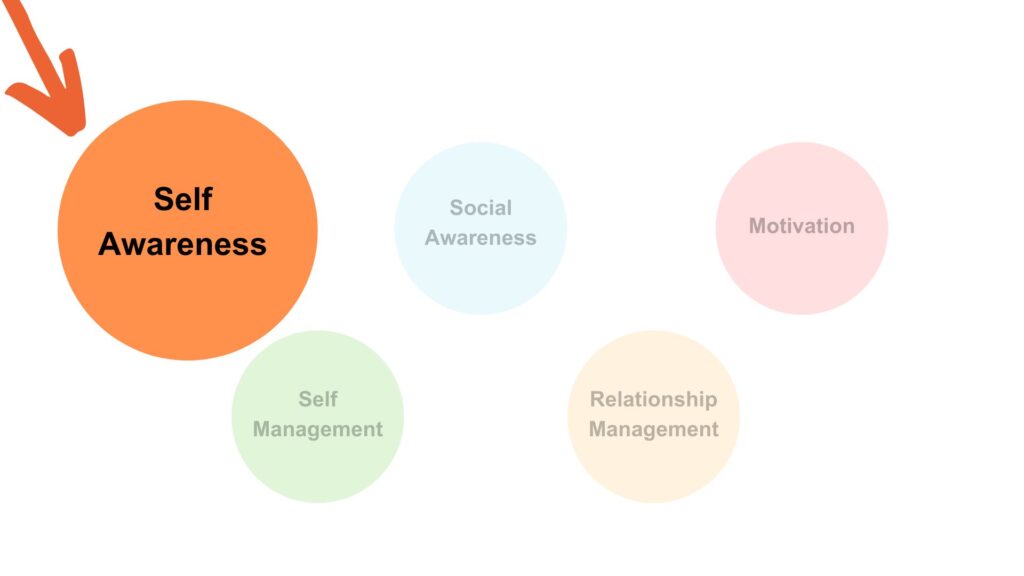
What does Self-awareness look like at work?
Employees with high self-awareness can identify their strengths and weaknesses. They are aware of how their emotions influence their decision-making, allowing them to manage stress effectively. For instance, a self-aware manager can recognize when they are feeling overwhelmed and take appropriate measures to address these emotions, ensuring they make sound decisions even under pressure.
What are the consequences of being a low self-aware leader?
Low self-awareness in a leader can have several significant consequences, affecting both the leader and the broader team or organization. Here are some key consequences:
1. Poor Decision-Making: Leaders with low self-awareness may struggle to make informed and effective decisions. Lacking a deep understanding of their own values, biases, and motivations, they may make choices that are inconsistent with their goals or detrimental to the organization.
2. Ineffective Communication: Self-awareness is crucial for effective communication. Leaders who lack self-awareness may struggle to understand how their words and actions impact others. This can lead to misunderstandings, misinterpretations, and a breakdown in communication within the team.
3. Poor Relationship Building: Building positive relationships is a key leadership skill. A leader with low self-awareness may struggle to understand the needs and perspectives of others. This can hinder their ability to build trust, collaborate effectively, and foster a cohesive team.
4. Resistance to Feedback: Leaders who lack self-awareness may find it challenging to accept constructive feedback. They may be defensive or dismissive of input from others, hindering their personal and professional growth. This resistance can create a stagnant leadership style.
5. Stagnant Personal Growth: Self-awareness is a foundation for personal development. Leaders who are not self-aware may not actively seek opportunities for growth, learning, or skill development. This stagnation can limit their ability to adapt to changing circumstances and evolving leadership challenges.
6. Low Employee Morale and Engagement: Team members often look to leaders for inspiration and guidance. A leader with low self-awareness may create an uninspiring work environment. This can lead to low morale, reduced employee engagement, and increased turnover as team members may feel undervalued or disconnected.
7. Difficulty in Adapting to Change: Change is a constant in the business world, and leaders need to adapt. A leader lacking self-awareness may struggle with change management, finding it difficult to understand and navigate their own reactions and those of their team members.
8. Impact on Organizational Culture: Leadership behavior significantly influences organizational culture. Low self-awareness can contribute to a toxic culture characterized by mistrust, fear, and poor communication. This, in turn, can hinder productivity and innovation.
It’s crucial for leaders to invest in developing their self-awareness, as it forms the basis for many other leadership competencies and contributes to a positive and effective leadership style.
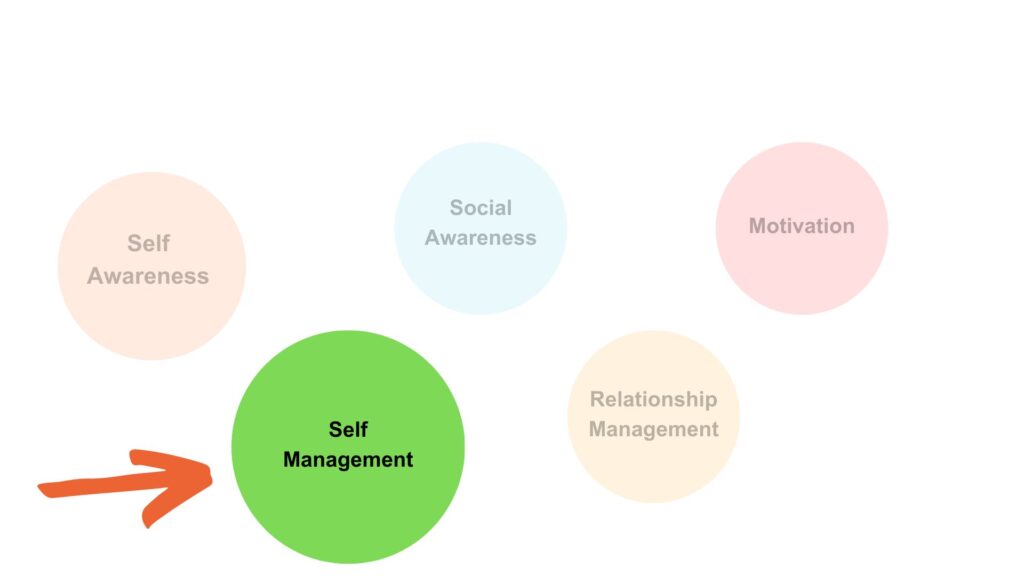
What does Self-Regulation look like at work?
Individuals with strong self-regulation can maintain their composure even in challenging situations. This skill is invaluable in conflict resolution; an employee who can regulate their emotions is more likely to approach disagreements calmly and rationally, leading to productive discussions and solutions.
What are the consequences of lacking self-management skills as a leader?
Lacking self-management as a leader can have several consequences, affecting both the leader personally and the team or organization they lead. Here are some potential consequences:
1. Impact on Decision-Making: Emotional impulsivity can influence decision-making. A leader who lacks self-management may make decisions based on temporary emotions rather than rational analysis, potentially leading to poor choices that negatively impact the team or organization.
2. Stress and Burnout: Poor self-management can contribute to increased stress levels and burnout. Leaders who are unable to handle pressure, setbacks, or conflicts in a healthy way may experience chronic stress, leading to physical and mental exhaustion.
3. Strained Relationships: Leaders who struggle with self-management may find it challenging to maintain positive and constructive relationships with team members. Mood swings, outbursts, or inconsistent behavior can strain interpersonal connections and diminish trust within the team.
4. Reduced Team Morale: A leader’s emotional state can significantly influence the morale of the team. If a leader exhibits signs of stress, frustration, or emotional volatility without effective self-management, team members may experience a decline in morale and job satisfaction.
5. Communication Challenges: Effective communication is a cornerstone of successful leadership. Leaders who lack self-management may struggle to communicate clearly and diplomatically. Emotional reactions can lead to misunderstandings and breakdowns in communication channels.
6. Missed Opportunities for Growth: Leaders who cannot effectively manage themselves may miss valuable opportunities for personal and professional growth. Continuous learning and development often require self-awareness and the ability to adapt to feedback and changing circumstances.
7. Reputation Damage: Consistent lapses in self-management can damage a leader’s reputation. Negative behaviors, such as anger outbursts or indecisiveness, can overshadow positive leadership qualities and diminish the leader’s credibility.
8. High Turnover and Low Retention: If a leader’s lack of self-management negatively impacts the team’s work environment, it can contribute to high turnover rates. Employees may be more likely to leave an organization led by a leader who struggles with emotional regulation.
Leadership effectiveness is closely tied to self-management. Leaders who invest in developing their self-management skills can enhance their personal effectiveness, build stronger relationships, and create a healthier work environment for their team.
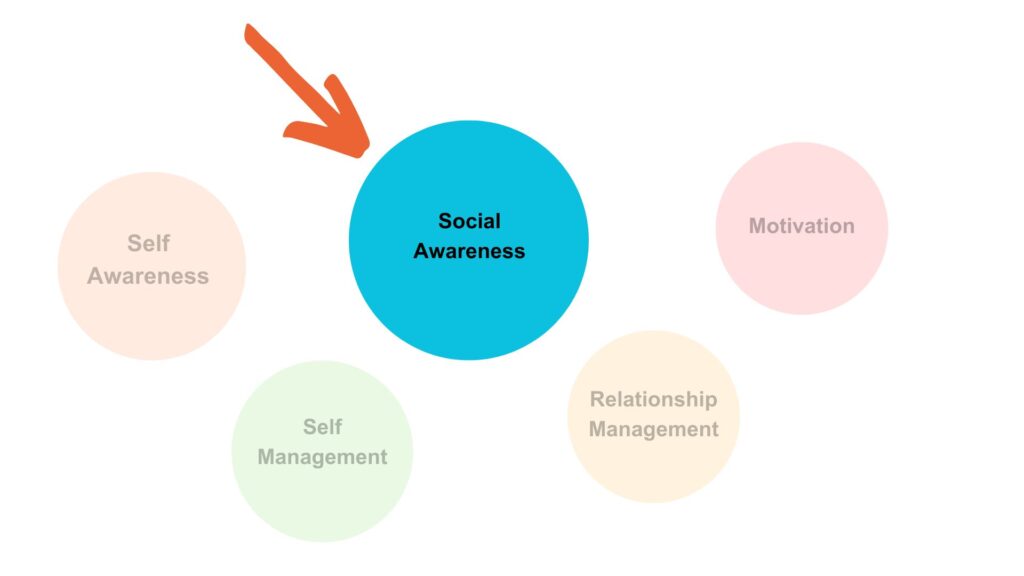
What does social-awareness look like at work?
Empathetic individuals can relate to their coworkers’ experiences and emotions. In a team setting, this skill promotes a supportive environment where colleagues feel heard and understood. Managers with empathy can connect with their team members on a personal level, enhancing trust and collaboration among team members.
What are the consequences of lacking social awareness as a leader?
Lacking social awareness as a leader can have significant consequences, impacting both the leader and the team or organization they are responsible for. Here are some potential consequences:
1. Ineffective Communication: Socially unaware leaders may struggle to communicate effectively. They might not pick up on non-verbal cues, leading to misunderstandings or misinterpretations. Clear communication is essential for providing guidance, resolving conflicts, and fostering a positive work environment.
2. Low Team Morale: A lack of social awareness can contribute to a negative work culture. Team members may feel undervalued or misunderstood, leading to low morale and decreased job satisfaction. This, in turn, can result in reduced productivity and increased turnover.
3. Limited Employee Engagement: Socially unaware leaders may overlook the emotional needs of their team members. This can result in disengagement, as employees may feel that their contributions are not recognized or appreciated. Engaged employees are more likely to be motivated and committed to their work.
4. Difficulty Managing Diversity: Social awareness is crucial for understanding and appreciating diversity in the workplace. Leaders who lack social awareness may struggle to create an inclusive environment, leading to issues related to discrimination or bias. This can harm relationships and hinder organizational success.
5. Resistance to Change: Change is a constant in the business world, and socially unaware leaders may struggle to navigate and implement changes effectively. Employees may resist change if they feel their concerns or perspectives are not considered, leading to disruptions and inefficiencies.
6. Increased Conflicts: A leader with low social awareness may inadvertently contribute to conflicts within the team. Failure to understand the emotions and perspectives of team members can lead to unresolved issues and tensions that may escalate over time.
7. Limited Organizational Adaptability: Socially unaware leaders may struggle to gauge the emotional pulse of the organization. This can limit their ability to anticipate and respond to shifts in the external environment, hindering organizational adaptability and competitiveness.
8. Reputational Damage: Over time, the consequences of lacking social awareness can lead to reputational damage for the leader and the organization. Negative workplace dynamics, conflicts, and low morale can impact how the leader is perceived by employees, stakeholders, and the broader community.
In summary, social awareness is a foundational component of effective leadership, and its absence can have widespread and detrimental effects on both individuals and organizations. Developing and honing social awareness skills is essential for leaders who aim to create positive, inclusive, and high-performing work environments.
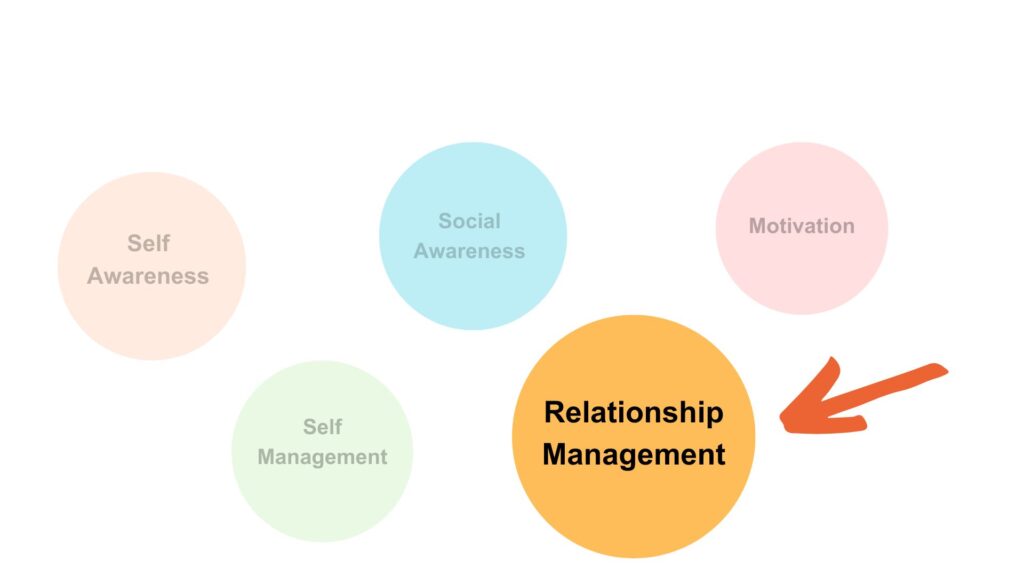
What does Relationship Management look like at work?
Strong social skills are vital for teamwork and leadership. Employees with good social skills can communicate clearly, resolve conflicts diplomatically, and collaborate effectively. Leaders with this skill can create a harmonious work environment, where open communication and mutual respect are the norm, leading to improved teamwork and higher productivity.
What are the consequences of lacking Relationship Management skills as a leader?
Lacking relationship management skills as a leader can have significant consequences that impact both the leader and the organization. Here are some potential outcomes:
1. Poor Team Dynamics: Leaders with inadequate relationship management skills may struggle to foster a positive and collaborative team environment. This can result in poor communication, lack of trust among team members, and a diminished sense of cohesion.
2. Low Employee Morale: Effective relationship management involves recognizing and addressing the needs of team members. A leader who lacks these skills may overlook the importance of employee morale, leading to dissatisfaction, disengagement, and reduced productivity.
3. High Turnover Rates: Employees often leave organizations not just because of the work itself but due to poor relationships with their leaders. A leader’s inability to manage relationships may contribute to high turnover rates, resulting in increased recruitment and training costs.
4. Conflict Escalation: Without strong relationship management skills, leaders may struggle to address conflicts in a constructive manner. Unresolved conflicts can escalate, leading to a toxic work environment and negatively impacting the overall team performance.
5. Difficulty Managing Change: During times of change, effective relationship management becomes even more critical. Leaders need to navigate through uncertainty and guide their teams. A leader with poor relationship management skills may face resistance and challenges in implementing changes smoothly.
6. Negative Organizational Culture: Leaders play a pivotal role in shaping organizational culture. A leader’s inability to manage relationships positively can contribute to a negative culture characterized by fear, lack of collaboration, and a general sense of dissatisfaction among employees.
7. Impaired Stakeholder Relations: Leaders often interact with various stakeholders, including clients, suppliers, and partners. Poor relationship management can hinder effective communication and collaboration with external parties, impacting the organization’s external reputation.
8. Difficulty in Resolving Customer Issues: For leaders in customer-facing roles, relationship management is crucial for resolving customer issues and ensuring customer satisfaction. A leader who lacks these skills may find it challenging to address customer concerns effectively.
In summary, the consequences of lacking relationship management skills can be wide-ranging, affecting team dynamics, employee morale, organizational culture, and external relationships. Leaders who prioritize and develop these skills contribute significantly to the overall success and well-being of their teams and organizations.
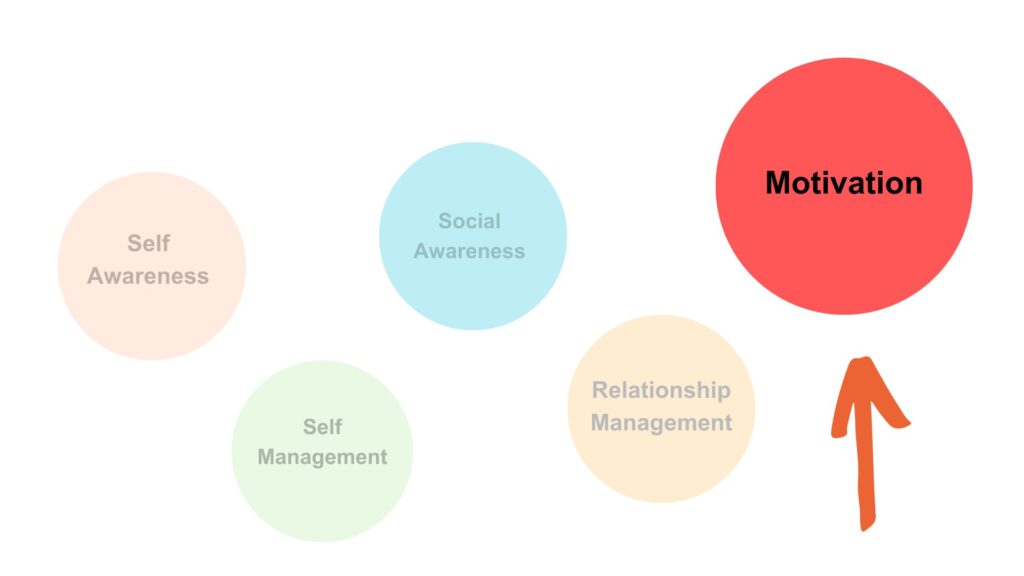
What does Motivation look like at work?
Motivated employees exhibit a strong work ethic and are resilient. They set and pursue goals with enthusiasm, inspiring their colleagues. A motivated team member can boost morale during tough times, encouraging the team to persevere and maintain focus on their objectives.
We delve more into Motivation and the Consequences of Low Motivation in the next course manual.
To summarize the 5 components of emotional intelligence, it is critical to notice the interconnectedness of these components.
A well-rounded and effective leader or individual possesses a balance of these competencies, enabling them to navigate social situations, build positive relationships, and manage emotions both personally and in interaction with others.
This model has been influential in shaping the understanding and development of emotional intelligence in leadership and personal development.

Exercise: The Interconnectedness of EI Components
•
• Marker pens
• Sticky notes or index cards
o Draw five large circles on the whiteboard or paper, each representing one component of EI: Self-awareness, Self-regulation, Motivation, Empathy, and Social Skills.
o Write the names of these components in each respective circle.
o Briefly explain the five components of EI, describing how each is distinct but interconnected.
o Emphasize that these components influence and support each other in various ways.
o Divide the participants into two groups
o Distribute sticky notes or index cards to each participant.
o Ask participants to write down an example or a personal experience related to one of the EI components on the sticky notes/cards. One component per person in the group. For example:
– Self-awareness: A moment when they were very self-aware of their emotions.
– Self-regulation: An instance where they controlled their emotions effectively.
– Motivation: Something that motivates them in their personal or professional life.
– Empathy: An experience showing understanding and empathy towards someone else’s emotions.
– Social Skills: A situation where they demonstrated strong social skills in interacting with others.
o Facilitate a discussion on how these examples are connected and how the components influence each other.
o Encourage participants to observe how strengths in one area can positively affect others and how weaknesses in one component might impact overall emotional intelligence.
o Invite participants to come up, one by one, and place their sticky notes/cards on the respective circles on the whiteboard/paper.
o Summarize the activity, reiterating the interconnected nature of the five components of EI and how they collectively contribute to emotional intelligence.

Course Manual 4: Motivation
We have looked at the 5 components of EQ in the previous course manual. We will now focus on Motivation as one of the key pillars. Motivation will be useful at the end of this workshop to help you start building out a developmental plan. The goal here is for each participant to understand the crucial role Motivation plays in the success of your development as an EQ leader.
Motivation serves as a crucial pillar within Emotional Intelligence (EQ) due to its profound impact on personal drive, resilience, and the ability to achieve goals. In the context of EQ, motivation refers to the ability to harness emotions to drive personal and professional achievement. It reflects an individual’s intrinsic drive to set and pursue objectives, even in the face of challenges or setbacks.
Motivation encompasses the ability to harness emotions to fuel ambitions, maintain enthusiasm, and persevere through adversity. Motivated individuals with high EQ often exhibit a strong sense of purpose and determination, which allows them to inspire and mobilize others effectively. Their resilience in maintaining momentum despite obstacles not only stems from an internal locus of control but also influences the emotional tone within teams or organizations. By fostering motivation as a component of EQ, leaders can instill a sense of purpose, promote resilience, and drive collective success by aligning individual aspirations with broader organizational goals.

Moreover, motivation in EQ amplifies an individual’s capacity for self-regulation and self-management. Individuals with strong motivational components in their EQ possess the ability to regulate their emotions, channeling them towards productive ends, and maintaining focus on long-term objectives. This intrinsic drive helps in navigating through stress, fostering adaptability, and sustaining high levels of performance. Such individuals can effectively manage their emotions, leveraging positive feelings to propel themselves forward and turning negative emotions into catalysts for growth and learning. Motivation, therefore, is not merely about setting goals, but it’s about maintaining the drive necessary to achieve them, while also influencing others positively, making it a cornerstone within the realm of Emotional Intelligence.
Let’s quickly look at a scenario that captures the power of motivation.
Scenario: Recognizing Motivation
Alex joined the marketing team at a mid-sized company about a year ago. From the beginning, Alex exhibited a high level of motivation and enthusiasm for the work. Recognizing the need for a more streamlined social media strategy, Alex took the initiative to research and propose a comprehensive plan. This initiative demonstrated not only a deep understanding of the industry but also a proactive approach to problem-solving.
Alex consistently met and exceeded performance targets. The marketing campaigns Alex spearheaded led to a noticeable increase in customer engagement and a higher conversion rate. This success caught the attention of both team members and management.
Despite being a relatively new team member, Alex actively collaborated with colleagues, offering support and sharing insights. Alex’s leadership qualities emerged as others began to look up to Alex for guidance, creating a positive and cohesive team dynamic.
Recognizing the rapidly evolving nature of digital marketing, Alex proactively enrolled in relevant online courses and attended industry conferences. This commitment to continuous learning not only enhanced Alex’s skills but also contributed to the team’s overall knowledge base.
Alex consistently demonstrated a positive attitude, even in challenging situations. This resilience and optimistic approach helped boost team morale during tight deadlines and demanding projects.
Management, acknowledging Alex’s outstanding contributions, decided to recognize Alex during a monthly team meeting. The recognition highlighted specific achievements, such as successful campaigns, leadership qualities, and the positive impact on team dynamics.
As a result of consistent high performance, Alex was not only recognized but also promoted to a higher role within the marketing team. The promotion came with increased responsibilities, reflecting the company’s confidence in Alex’s abilities.
Alex’s achievements did not go unnoticed beyond the marketing team. The CEO mentioned Alex’s contributions in a company-wide communication, emphasizing the importance of dedication, initiative, and results-driven work.
Alex’s recognition had a ripple effect on the team. Other employees were inspired by the acknowledgment of hard work and began to display increased motivation and dedication in their roles.
Discussion questions:
• What stands out about Alex?
• Do you know any individuals with a similar story or perhaps you have a similar story?
• What is your biggest takeaway from this scenario?
As we can see, High Motivation in the workplace can have a multitude of positive effects that contribute to both individual and organizational success. Here are several notable effects:
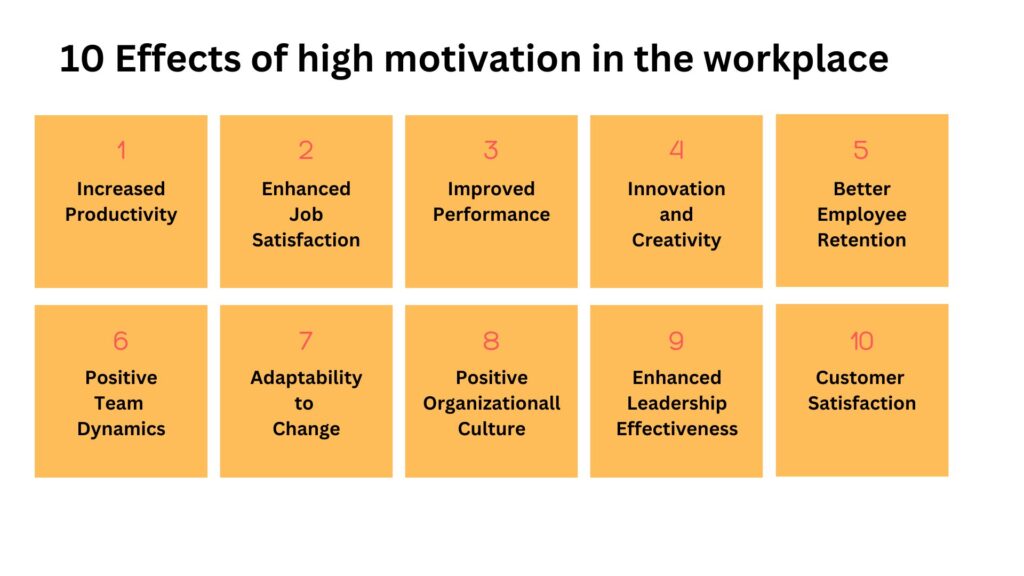
1. Increased Productivity: Motivated employees are often more focused, energetic, and committed to their work. This heightened sense of purpose translates into increased productivity as individuals strive to meet and exceed performance expectations.
2. Enhanced Job Satisfaction: Employees with high motivation are more likely to find fulfillment and satisfaction in their roles. The alignment of personal goals with organizational objectives fosters a positive work environment, leading to higher job satisfaction and a greater sense of accomplishment.
3. Improved Performance: Motivation is closely linked to improved performance. Individuals who are motivated to excel tend to set higher standards for themselves, continuously seek opportunities for skill development, and exhibit a willingness to take on challenges, ultimately contributing to higher levels of achievement.
4. Innovation and Creativity: Motivated employees are more likely to engage in innovative thinking and problem-solving. They approach challenges with a positive mindset, are open to new ideas, and are willing to explore creative solutions, fostering an environment of innovation within the workplace.
5. Better Employee Retention: High motivation is often associated with job satisfaction and a positive work experience. Employees who feel motivated are more likely to stay with the organization, reducing turnover rates and the associated costs of recruitment and training.
6. Positive Team Dynamics: Motivated individuals contribute to a positive team culture. Their enthusiasm and commitment can be contagious, inspiring others to work collaboratively and fostering a supportive atmosphere where team members are encouraged to excel together.
7. Adaptability to Change: Motivated employees are more resilient in the face of change. They view challenges as opportunities for growth rather than obstacles, making them more adaptable to shifts in the workplace, technological advancements, or changes in organizational strategy.
8. Enhanced Leadership Effectiveness: Leaders who are highly motivated set a positive example for their teams. Their enthusiasm, commitment, and ability to overcome challenges inspire others to follow suit, contributing to a culture of motivation and high-performance leadership.
9. Positive Organizational Culture: A workforce characterized by high motivation contributes to the development of a positive organizational culture. This culture, marked by shared values, a commitment to excellence, and a focus on continuous improvement, attracts and retains top talent.
10. Customer Satisfaction: Motivated employees are more likely to deliver exceptional service and go the extra mile to meet customer needs. This dedication to providing excellent customer experiences can lead to increased customer satisfaction and loyalty.
Motivated employees are also more likely to stay with a company long-term, reducing turnover and associated costs such as recruitment, training, and lost productivity.
Numerous studies have also demonstrated that companies with highly motivated workers outperform those with low motivation. For instance, a University of Warwick study discovered that contented workers increased productivity by 12%.
Low Motivation

It’s important for employers and managers to identify and address low motivation early on, as it can impact individual and team performance, as well as overall organizational success.
Employees with low motivation often exhibit certain characteristics and behaviors that indicate a lack of enthusiasm, engagement, and commitment to their work. Some common characteristics of an employee with low motivation include:
1. Lack of Initiative: Employees with low motivation may show a reluctance to take initiative or go above and beyond their basic job responsibilities. They may wait for instructions rather than proactively seeking opportunities to contribute.
2. Decreased Productivity: Low motivation often translates into reduced productivity. Employees may complete tasks slowly or with minimal effort, leading to a decline in overall work output.
3. Lack of Enthusiasm: A lack of motivation is evident in the absence of enthusiasm for the job. Employees may appear disinterested, unexcited, or indifferent to their work tasks and the overall goals of the organization.
4. Frequent Absenteeism: Employees with low motivation may have a higher rate of absenteeism. They may be more likely to take sick days or request time off, possibly due to a lack of interest or commitment to their job.
5. Resistance to Change: Low-motivated employees often resist changes in the workplace. They may be unwilling to adapt to new processes, technologies, or organizational initiatives, creating a barrier to growth and development.
6. Negative Attitude: Employees with low motivation may display a negative attitude towards their work, colleagues, or the organization. This negativity can impact team morale and contribute to a toxic work environment.
7. Limited Goal Setting: Motivated individuals typically set and pursue personal and professional goals. Employees with low motivation may lack clear goals or aspirations, contributing to a sense of stagnation in their careers.
8. Low Engagement in Meetings and Discussions: Lack of motivation can manifest in disengagement during meetings or team discussions. Employees may contribute minimally, avoid sharing ideas, or seem disinterested in collaborative activities.
9. Low Job Satisfaction: Employees with low motivation often express dissatisfaction with their jobs. They may find it challenging to derive fulfillment or enjoyment from their work tasks, leading to a sense of frustration and discontent.
10. Limited Commitment to Professional Development: Low-motivated employees may show little interest in enhancing their skills or pursuing professional development opportunities. They may resist training programs or fail to actively seek opportunities for career growth.
11. Poor Time Management: Low motivation can result in poor time management habits. Employees may procrastinate, miss deadlines, or struggle to prioritize tasks effectively.
12. Indifference to Performance Feedback: Employees with low motivation may exhibit indifference or defensiveness when receiving performance feedback. They may not see value in improving their performance or may lack the drive to address areas of improvement.
This is a very long list.
Do you identify with one or more of these symptoms? Do you recognize some of them in your interactions or engagement with colleagues, supervisors or direct reports?

Case Study – Covid19 and Motivation
Introduction:
In recent years, the impact of the work environment on employee performance has been a subject of exploration by various authors. The year 2020, marked by the COVID-19 pandemic, brought a renewed focus on occupational health due to radical changes in work environments. This study delves into the case of a major construction company, exploring the repercussions of the pandemic on workers’ well-being. Specifically, it examines the shift to teleworking, the implementation of regulations by the Ecuadorian government, and the resulting impact on mental health, turnover intention, and burnout among employees. The study also investigates gender differences in the context of remote work. The unique contribution of this research lies in evaluating burnout as a mediating factor between job motivation and turnover intention during the pandemic. Additionally, the study validates the psychometric properties of relevant scales in a context with limited research. The paper concludes with a discussion of the findings and emphasizes the need for interventions and well-being programs in emergencies such as the COVID-19 pandemic.
Theoretical Background and Hypotheses Development:
The study is grounded in the Self-Determination Theory (SDT), a job motivation theory, which explores the concepts of intrinsic motivation (IM) and extrinsic motivation (EM) and their impact on performance and wellness in organizations. IM reflects the desire to perform an activity for its inherent interest and enjoyment, while EM is driven by the desire to attain positive consequences or avoid negative ones. The theory of cognitive evaluation delves into the trade-off between intrinsic and extrinsic rewards, and recent studies aim to analyze how external motivations can influence the IM of a worker and subsequently affect turnover intention (TI).
The hypotheses propose several relationships in the COVID-19 context. H1 suggests that IM negatively affects TI, while H2 posits that EM has a positive effect on TI. Additionally, the mediating role of burnout (BO) on the relationship between motivation and TI is introduced. H3 suggests a positive effect of BO on TI. The study also acknowledges gender differences in motivation and turnover intention, particularly noting that female workers may face challenges related to motivation, workload, and family responsibilities.
H4 and H5 extend the analysis to the effects of IM and EM on burnout. H4 proposes a negative effect of IM on BO, while H5 suggests a positive effect of EM on BO. The study emphasizes the importance of considering gender in understanding motivation, stress, and burnout, asserting that gender roles and inequalities impact motivation, stress, and behaviors in the workplace. The hypotheses collectively provide a comprehensive framework for exploring the intricate relationships between motivation, burnout, and turnover intention in the unique context of the COVID-19 pandemic.
From the theoretical framework developed, we summarize in the proposed conceptual model:
Materials and Methods:
The study employed a cross-sectional design with a non-probabilistic convenience sample collected in the second quarter of 2020 through an online survey. Participants were workers from Guayaquil, Ecuador, representing various economic sectors and recruited via word-of-mouth and social networks. Participation was voluntary, and participants provided informed consent online. Outliers were identified using the Mahalanobis distance, resulting in 1054 complete and valid records for analysis. Respondents, aged 18 to 79 (M = 29.10, SD = 10.02), included 64.64% millennials. Gender distribution was 44.6% male, 54.5% female, and 0.90% undisclosed. Educational backgrounds varied, with 43.8% having at least a high school diploma, and the majority had two economically dependent individuals. On average, participants had 12 years of experience, with 8 years in their current job.
The study utilized a comprehensive measurement instrument incorporating four scales—burnout, intrinsic motivation, extrinsic motivation, and turnover intention—comprising a total of 27 items. Participants responded to these items on a 5-point Likert scale ranging from “totally disagree” to “totally agree.” Burnout was measured using Shirom’s 14-item scale, encompassing physical fatigue, cognitive fatigue, and emotional exhaustion. Intrinsic motivation was assessed through a 6-item scale gauging the willingness to perform tasks without external incentives, while extrinsic motivation employed a 4-item scale measuring the willingness to perform tasks with external incentives. Turnover intention was measured using a 3-item scale indicating the extent to which an individual plans to leave their current job.
Data analysis involved evaluating the Kaiser–Meyer–Olkin index and Bartlett’s sphericity to assess item adequacy and sample suitability for confirmatory factor analysis (CFA). Structural equation modeling (SEM) was employed as the statistical technique, considering SEM’s ability to analyze measurement error and complex relationships between variables. The study tested the proposed conceptual model’s hypotheses through CFA and SEM, using the maximum likelihood method for robust analysis with large samples, even in the presence of non-normal data distributions.
The measurement model was assessed for each factor using global fit indices (GFI), chi-square/degrees of freedom ratio (χ2/DF), comparative fit index (CFI), Tucker–Lewis index (TLI), and root mean square error of approximation (RMSEA). Acceptable fit criteria included χ2/DF less than 3, CFI and TLI values exceeding 0.95, and RMSEA values less than 0.06 with a 90% confidence interval.
Convergent validity was evaluated using Cronbach’s alpha (α), omega (ϖ), and factor loadings, while discriminant validity was assessed through the Fornell and Larcker criterion and cross-loads. The analysis employed various R packages for statistical computations, ensuring a rigorous examination of the measurement and structural models.
Results:
The present work has compared the influence of motivation and employee TI, considering burnout as the mediating variable in the COVID-19 context. In accordance to pre-pandemic studies and recent research our results suggest that IM (Intrinsic Motivation) and EM (extrinsic Motivation) are potent factors of turnover intention. Intrinsic motivation has a significant negative effect on turnover intention, whereas EM presents a positive significant effect. Additionally, the mediating role of burnout is confirmed through the resultant significant relationship of motivation and burnout, and burnout and turnover intention.

Results suggest that the mediation effect of burnout was significative for job motivation. However, findings show more influence of the intrinsic dimension than EM. These outcomes indicate that when a job is satisfying, burnout and turnover intention are reduced.
To identify if gender matters, we separated male and female workers to account for variability that could exist. We find relevant differences when we consider the male and female subsamples for the estimation of the structural equation model. In both subsamples, EM was positive and had a statistically significant relationship with both BO and TI. The same condition is fulfilled in the relationship between BO and the TI. In contrast, we found a significantly negative effect of IM on BO and TI.
When we contrast the model through multi-group analysis, the subsamples of gender did not show significant differences. This result implies that IM and EM produce the same effect of turnover intention through BO for both the male and female group; therefore, there are no gender differences in this situation. However, considering the disparities in standardized estimates we evidenced differences between the parameters of the groups (male and female) when quantified through the critical ratios.
As opposed to some previous studies, we found gender differences when analyzing job motivation, burnout and turnover intention.
These finding are congruent with previous studies where female and male workers were affected differently in lockdown circumstances. Recent studies, contrary to the traditional allocation of roles, highlight the fact that many parents in the COVID-19 context have to assume the main responsibility for childcare, which can modify the distribution of labor at home. The differences for female workers and male workers in occupational stress can vary, depending on work demands. These results are also in agreement with the gender role theory exposed in the theoretical framework.
The occupational stress caused by different job demands can be higher for female workers because they have the majority of the responsibilities in the home and in childcare. In the context of COVID-19, the mental health of female workers could have been more affected because of the extra responsibilities at home; during the pandemic, occupational stress increased and gender roles were fundamental to worsening this stress. Because of that fact, a high number of female workers increased their turnover intention and their burnout and decreased their motivation
In our study, the male population feel more predisposed to leave their jobs when intrinsic motivation is present. Contrarily to the female population, who consider IM as an important factor to remain in the job position. Additionally, female workers show slightly higher BO than male workers when work does not contribute to satisfying their internal motivations. Finally, the male population is more willing to abandon their work when it increases their physical, emotional and cognitive exhaustion. Non-significative differences were determined in the extrinsic motivation path. Many factors could explain these different results, but role ambiguity and working from home difficulties during the pandemic could highlight previous motivation study results that indicate that social relationships at work and level of achievement can be key motivators for workers, whereas rewards and job characteristics can be secondary.
The Impact of the Pandemic on Work and Motivation
The COVID-19 pandemic has upended the nature of work and had a profound impact on workplace motivation, bringing about a multitude of changes and challenges that have reshaped the dynamics of the workplace.
Here are five factors that continue to have an impact on workplace motivation:
1. Hybrid Work Models: As organizations adopted hybrid work models, combining remote and in-office work, motivation became linked to how well these models were implemented. Finding the right balance and ensuring equitable experiences for both in-office and remote workers contributed to sustained motivation.
2. Emphasis on Well-being: The pandemic underscored the importance of employee well-being. Organizations that prioritized employee health, mental well-being, and a healthy work-life balance likely saw positive impacts on motivation. Strategies such as flexible work hours, mental health support, and wellness programs gained prominence.
3. Redefined Job Values: The pandemic prompted individuals to reconsider their career priorities. Employees began placing a higher value on job flexibility, purpose-driven work, and a positive workplace culture. Employers who adapted to these changing values were more successful in motivating and retaining talent.
4. Resilience and Adaptability: Motivation in the post-pandemic workplace could be influenced by an organization’s ability to demonstrate resilience and adaptability. Companies that effectively navigated challenges, communicated transparently, and showed agility in adjusting to new realities likely fostered a more motivated workforce.
5. Leadership Style: The leadership approach during the pandemic played a crucial role in shaping employee motivation. Leaders who demonstrated empathy, communicated effectively, and provided support during challenging times likely had a positive impact on their teams.
In addition, building and sustaining a positive company culture in the wake of the Great Resignation, Lay-offs, Re-structuring and Economic uncertainties are more critical than ever in order to maintain or boost motivation.

Gallup’s State of the Global Workplace: 2022 Report states that 65% of American workers are not engaged. These workers have no preference for their jobs and are apathetic toward them. They represent a risk, and that risk has the potential to be both positive and negative.
The Gallup State of the Global Workplace: 2023 Report also reveals that, despite the decline of other negative feelings associated with the COVID-19 pandemic, worker stress levels worldwide remained at an all-time high in the wake of the outbreak. Given that many parts of the world struggle to control high inflation, this high level of stress may be a result of the recovery process itself.

“59% of employees worldwide are quiet-quitting.”
The term “quiet quitting” typically refers to employees disengaging or becoming disenchanted with their work, leading to decreased productivity and job satisfaction. If 59% of employees worldwide are indeed experiencing quiet quitting, it suggests a significant global issue with employee disengagement.
This phenomenon can have detrimental effects on organizational performance, team dynamics, and overall workplace morale.
Reasons for quiet quitting may vary, including feelings of unappreciation, lack of recognition, limited opportunities for growth, or dissatisfaction with the work environment. Employers and leaders should take this data seriously, as addressing the root causes of quiet quitting is essential for creating a more positive and engaging workplace culture.
Strategies such as improving communication, recognizing and rewarding achievements, providing professional development opportunities, and fostering a supportive work environment can contribute to reversing the trend of quiet quitting and promoting a more motivated and satisfied workforce.

How Can You Help Increase Motivation at Work?
Psychological Safety: One critical factor for increasing work motivation is to create or increase psychological safety. Psychological safety allows an employee or team member to engage in interpersonal risk taking and refers to being able to bring our authentic self to work without fear of negative consequences to self-image, status, or career.
Becoming an EQ leader will aid you in creating an environment that makes your team and peers experience more psychological safety. As we journey through this program, we will discuss leadership frameworks and effective structures to enable you to cultivate more psychological safety in the workplace.
As you learn more about what and how you are motivated as an individual, It will help increase your leadership effectiveness. You will then be better positioned to help facilitate your team and peers towards achieving the 10 benefits of high motivation discussed above.

Strategies for Boosting Motivation at Work
It is important to highlight that Motivation is not a one-size-fits-all. Sometimes, inexperienced leaders will assume that the same factors that motivate one employee, or the leaders themselves, will motivate others too.
In the context of work, intrinsic and extrinsic motivation refer to different types of motivations that drive employees to perform tasks, achieve goals, and excel in their roles.
Let’s briefly look at each:

1. Intrinsic Motivation:
Intrinsic motivation comes from within an individual. It involves engaging in an activity or task because it is personally rewarding, enjoyable, or aligned with one’s values and interests. People who are intrinsically motivated find satisfaction in the work itself and are driven by a genuine interest or passion for what they do. They are more likely to take initiative, be creative, and persist in the face of challenges. Examples of intrinsic motivation at work include:
Intrinsic motivation comprises three key components:
1. Autonomy – refers to the desire for self-directed control over one’s actions and decisions, allowing individuals to experience a sense of independence and choice in their work.
2. Mastery involves the pursuit of continuous learning and skill development, where individuals seek to improve their abilities and achieve a high level of proficiency in their tasks
3. Purpose entails a deeper connection to the broader meaning and impact of one’s work, emphasizing a sense of contributing to something meaningful or larger than oneself.
Together, these components contribute to a powerful intrinsic motivation framework, driving individuals to engage more deeply, find fulfillment, and sustain long-term commitment in their pursuits.
2. Extrinsic Motivation:
Extrinsic motivation, on the other hand, involves performing a behavior or task to earn external rewards or avoid punishments.

There are several types of extrinsic motivation, each driven by external factors:
1. Tangible Rewards: These are concrete, physical rewards such as money, gifts, or other material incentives offered to individuals for completing a task or achieving a specific goal.
2. Social Recognition: Extrinsic motivation can come from social sources, such as praise, acknowledgment, or positive feedback from others. Recognition from peers, supervisors, or the broader community can serve as a powerful motivator.
3. Grades and Evaluation: In educational settings, grades and evaluations serve as extrinsic motivators. Students may work towards good grades to receive academic recognition or to avoid negative consequences.
4. Competition: Competing against others can be a strong extrinsic motivator. Whether in sports, business, or other contexts, the desire to outperform others or win a competition can drive individuals to excel.
5. Threat of Punishment: The fear of negative consequences, such as reprimands, demotions, or other forms of punishment, can motivate individuals to complete tasks or behave in a certain way to avoid undesirable outcomes.
6. Job Security: The promise of job security or the fear of job loss can be a powerful extrinsic motivator in the workplace. Employees may work diligently to maintain their employment status or to secure promotions.
7. Approval and Acceptance: Seeking approval or acceptance from others, such as peers, family, or community, can be a strong extrinsic motivator. Individuals may align their behavior with societal norms or expectations to gain acceptance.
8. Career Advancement: The prospect of career progression, promotions, or the acquisition of new responsibilities within an organization can serve as extrinsic motivators, driving individuals to perform at higher levels.
While extrinsic motivation can be effective in the short term, intrinsic motivation, which comes from within, is often considered more sustainable and conducive to long-term engagement and satisfaction. Combining both extrinsic and intrinsic motivators can create a well-rounded approach to driving performance and achieving goals.
To bring it all together, let’s look at the motivation quadrant:
Motivation Quadrant:

The motivation quadrant categorizes motivations into four main areas: desire (intrinsic motivation), fear (extrinsic motivation), reward (extrinsic motivation), and threat (extrinsic motivation).
Desire represents internal, self-driven motivation, often associated with passion and personal fulfillment, falling under the intrinsic motivation category.
Fear, reward, and threat, on the other hand, are external factors that drive behavior. Fear involves the avoidance of negative consequences, reward entails seeking positive external outcomes, and threat is the fear of punishment or negative repercussions.
These three fall under the umbrella of extrinsic motivation, where individuals are influenced by external factors rather than internal desires.
As a leader, recognizing and understanding these different motivational aspects is crucial for designing effective strategies to engage and motivate individuals.

Exercise: Motivation Boosters Reflection
1. Self-Reflection: Ask each participant to take a moment to reflect on their own current level of motivation at work. Encourage them to consider what aspects contribute to their motivation and identify any challenges they may be facing.
2. Sharing: In pairs, have participants share with each other one or two factors that currently motivate them at work. This could be a specific project, a supportive colleague, or a personal goal. Encourage them to discuss whether these factors are intrinsic or extrinsic in nature.

Course Manual 5: EQ Quadrant
Your emotional intelligence is the foundation for a host of critical skills—it impacts most everything you say and do each day. Emotional intelligence is the single biggest predictor of performance in the workplace and the strongest driver of leadership and personal excellence.
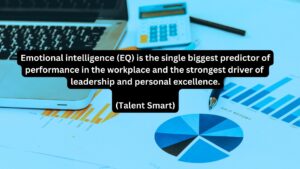
We have looked at the 5 components of EQ, and discussed Motivation in greater detail. We will now look at the remaining four components in a framework called the EQ Quadrant. We will refer to these components as the four pillars or quadrants.
EQ Quadrants
The four pillars of the emotional intelligence (EQ) construct—self-awareness, self-management, social awareness, and relationship management—
The four pillars of Emotional Intelligence (EQ) – self-awareness, self-regulation, motivation, and social skills – determine how we respond to various aspects of our emotional environment. These four pillars represent the intersection of your awareness and actions towards yourself and others.
They are also paramount for job performance. Self-awareness enables individuals to understand and manage their emotions, fostering resilience. Self-regulation ensures effective control over emotional responses, promoting calm and rational decision-making. Motivation propels individuals to set and achieve goals, sustaining enthusiasm and commitment. Social skills empower collaboration and positive relationships, vital for teamwork and overall workplace success.
In essence, the mastery of these pillars enhances emotional well-being, interpersonal effectiveness, and adaptability, collectively driving optimal job performance.

Case Study: EQ Dimensions and Job Performance
Abstract:
This study investigates the correlation between emotional intelligence (EI) and job performance among 212 teachers in six secondary schools in Kedah, Malaysia. The four dimensions of EI explored are self-regulation, self-awareness, self-motivation, and social skill (relationship management). The data, collected through a questionnaire survey, reveals a significant correlation between emotional intelligence and job satisfaction. The research contributes valuable management implications for school administrators and the Malaysian higher education system.
Introduction:
The study focuses on the challenging working conditions faced by teachers in Malaysia, including issues like School-Based Assessment implementation, disruptive students, heavy workload, and parental expectations. The stressful environment can lead to psychological distress among teachers. Recognizing the importance of emotional intelligence in education, the study aims to explore the relationship between EI and teachers’ job performance.
Components of Emotional Intelligence:
The four dimensions of emotional intelligence are outlined:
1. Self-regulation: Involves staying calm during conflict, minimizing defensiveness, and fostering rationality.
2. Self-awareness: The ability to recognize and differentiate one’s own feelings, understand their causes, and identify the effects of emotions.
3. Self-motivation: Involves controlling emotional tendencies, setting goals, staying focused, and remaining positive despite setbacks.
4. Social skill (relationship management): Pertains to managing relationships, demonstrating respect, mutual regard, empathy, and effective communication.
Job Performance:
Job performance is defined as the total expected value of an individual’s behaviors over a standard period. It is influenced by motivation, willingness, and ability to perform tasks. The study asserts that emotional intelligence enhances job performance, influencing positive relationships, teamwork, and social capital.
Research Hypotheses:
The study proposes several hypotheses, including a significant relationship between emotional intelligence and job performance, as well as specific relationships between each EI dimension (self-regulation, self-awareness, self-motivation, and social skills) and job performance.
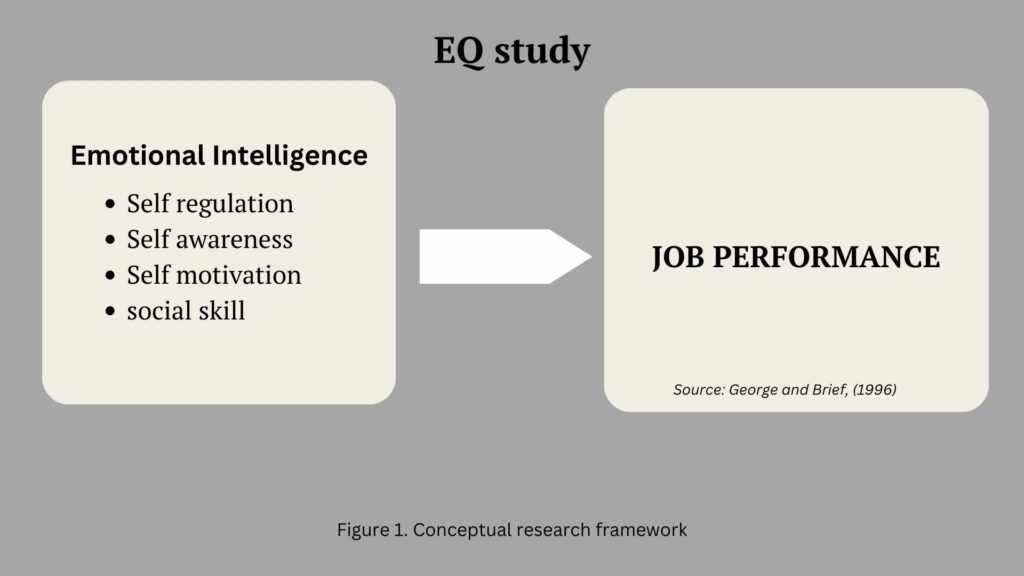
Conclusion:
The research emphasizes the critical role of emotional intelligence in teachers’ job performance. The four dimensions of EI are found to have a substantial impact on performance, and the study recommends systematic training programs to develop emotional competencies among educators. Recognizing emotional intelligence as a crucial element for a high-performing workforce, the research provides valuable insights for school administrators and the Malaysian higher education system.
In conclusion, fostering emotional intelligence can contribute to a positive work environment, improved job satisfaction, and ultimately, enhanced job performance among teachers. The implications extend beyond individual well-being to the overall effectiveness of the educational system and workplaces.
Emotional intelligence can be separated into four quadrants (or pillars) of skills that look like this:
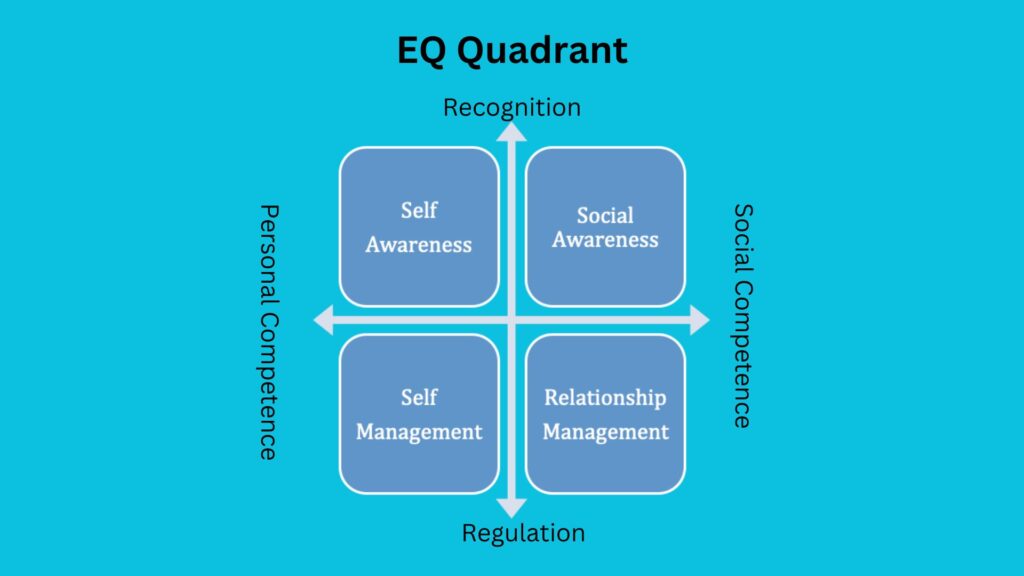
The top and bottom quadrants left focus on “Personal competence”
Likewise, the top and bottom quadrants on the right focus on “Social Competence.”
Additionally, the top two quadrants (Self Awareness and Social Awareness) focus on “Recognition” or “Awareness”
The bottom two quadrants (Self-Management and Relationship management) focus on “Regulation or “Management.”
Personal Competence
Personal Competence is the collective power of your self-awareness and self-management skills. It’s how you use emotional intelligence in situations that are more about you personally.
In order words, Personal competence is made up of your self-awareness and self-management skills, which focus more on you individually than on your interactions with other people. Personal competence is your ability to stay aware of your emotions and manage your behavior and tendencies.
Social Competence
Social Competence is the combination of your social awareness and relationship management skills. It’s more about how you are with other people.
Social competence is made up of your social awareness and relationship management skills; social competence is your ability to understand other people’s moods, behavior, and motives in order to improve the quality of your relationships.
Now let’s quickly look at each of the quadrant:
1. Self-Awareness: This quadrant involves understanding one’s own emotions, recognizing their impact, and being aware of one’s strengths and weaknesses.
2. Self-Management: Here, individuals learn to manage and regulate their emotions effectively. This includes controlling impulses, adapting to changing circumstances, and handling stress.
3. Social Awareness: This quadrant focuses on understanding and empathizing with the emotions of others. It involves being attentive to the feelings of those around you, fostering empathy, and recognizing social cues.
4. Relationship Management: The final quadrant involves effectively navigating social situations, building positive relationships, and communicating successfully. This includes skills such as teamwork, conflict resolution, and effective collaboration.
We will now look at each quadrant individually.
The first two pillars focus on you and how well you know yourself.

1. Self-Awareness:
Daniel Goleman defines self-awareness as the ability to recognize and understand one’s own emotions.
Bar-On defines “Self-awareness as the ability to recognize and understand our own emotions and how they affect our thoughts and behavior. It also includes the recognition of how others perceive us. Self-aware individuals have a clear understanding of their values, goals, and strengths, as well as areas for growth. This awareness provides a foundation for effective self-regulation and personal development.”
Bar-On’s definition underscores the multifaceted nature of self-awareness, encompassing the recognition and understanding of one’s emotions, their impact on thoughts and actions, and an awareness of how others perceive oneself.
My favorite definition is: “Self-awareness is your ability to accurately perceive your own emotions in the moment and understand your tendencies across situations.”
* Note the underlined phrase. It takes self-awareness to know your tendencies across various situations– either good or bad.
Self-awareness is the foundational pillar in Emotional Intelligence.
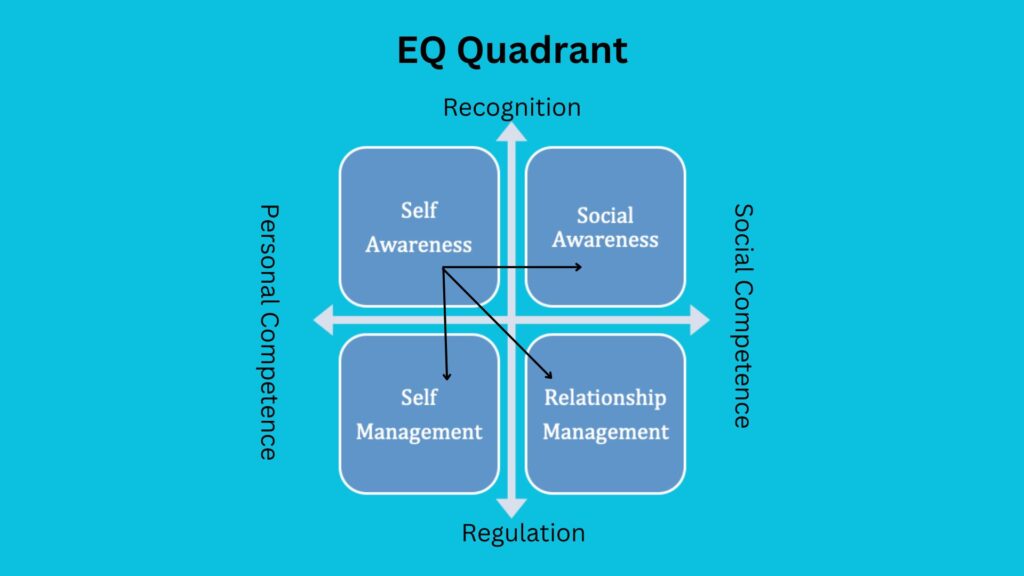
Notice the arrows. All are emanating from Self-Awareness and touching the rest of the quadrants.
The core of high EQ is self-awareness. Self-Awareness is foundational and affects your abilities in all other areas. Think of it this way: if you can’t recognize and manage your own feelings, how can you recognize them in others?
If you don’t understand your motivations and behaviors, it’s nearly impossible to develop an understanding of others. A lack of self-awareness can also thwart your ability to think rationally and apply technical capabilities.
Without knowing yourself, you can’t master self-control, nor understand and successfully relate to others. You can’t rely on your gut feelings to guide you during difficult situations. Self-aware people know their strengths and weaknesses and how to manage them. They have a better understanding of emotions and how they affect behavior and can recognize those emotions in others.
Self-awareness means having a comprehensive grasp of who you are as a person and leader, and how you connect and show up in the world.
How do you connect and show up in the world?
Our physical language, hand gestures, facial expressions and overall movement are pivotal in how effectively we interact with people.
Without knowing ourselves, we can’t master self-control or understand and successfully relate to those around us. Gut feelings are not enough in difficult situations.
When we know our strengths and weaknesses, we can better understand emotions and how they affect our behavior and the behavior of others. Understanding our emotions may help alleviate self-doubt.
Components of Self Awareness
The concept of self-awareness is often divided into three main components:
• Emotional Awareness:
Emotional awareness involves recognizing and understanding your own emotions in the moment. It’s about being attuned to how you feel, identifying specific emotions as they arise, and understanding the factors that contribute to those emotions. This component includes the ability to differentiate between various emotions and accurately label them.
• Self-Perception:
Self-perception refers to having a clear and realistic understanding of your own strengths, weaknesses, values, and beliefs. It involves acknowledging your skills, acknowledging areas for improvement, and being aware of your personal attributes. This component is crucial for building a balanced and authentic self-concept.
• Intuitive Awareness:
Intuitive awareness is often considered the deeper level of self-awareness. It involves a more holistic understanding of oneself, incorporating insights that go beyond explicit emotions or self-perceptions. This component taps into intuition, gut feelings, and an overall sense of self that may not always be easily articulated.
These three components work in concert to create a comprehensive understanding of oneself. Emotional awareness provides real-time insights into your emotional state, self-perception contributes to a grounded self-concept, and intuitive awareness encompasses a broader, more intuitive understanding of who you are. Together, they form a robust foundation for navigating emotions, making informed decisions, and fostering personal growth. Developing each of these components contributes to a more profound and nuanced self-awareness.
A key question here is: Can I accurately identify my own emotions and tendencies as they happen?

2. Self-Management
Once you are more aware of your emotions, the next pillar of emotional intelligence is learning how to respond to them better.
Self-management refers to the ability to manage and regulate one’s own emotions, impulses, and behaviors effectively. It involves being able to control disruptive emotions, handle stress, and adapt to changing circumstances with composure and resilience.
Self-management is essential for overall well-being and effective interpersonal relationships. It involves not only managing negative emotions but also cultivating a positive and adaptive emotional state.
Developing these self-management skills is crucial for individuals to navigate the complexities of their own emotions and successfully navigate a variety of situations in both personal and professional settings. These incudes:
Impulse Control:
Individuals with strong self-management skills can control impulsive reactions. This means being able to pause, reflect, and choose a thoughtful response rather than reacting impulsively to emotional triggers.
Adaptability:
Adaptability is a key aspect of self-management. It involves the ability to adapt to change, navigate uncertainty, and remain flexible in the face of shifting circumstances. This adaptability contributes to overall resilience.
Positive Outlook:
Individuals with effective self-management skills can maintain a constructive and optimistic perspective, even in challenging situations. This positive outlook contributes to a more resilient and solution-oriented mindset.
Achievement Orientation:
Self-management includes a focus on achieving one’s goals.
Individuals with strong self-management skills are often driven by a sense of purpose and are motivated to pursue and achieve meaningful objectives.
Initiative:
Taking initiative is part of self-management. It involves proactively seeking opportunities, taking responsibility for one’s actions, and demonstrating a proactive approach to personal and professional development.
The key question here is: Can I manage my emotions and behavior to a positive outcome?
The next two pillars (Social awareness and Relationship management) focus on how you relate to others.

3. Social Awareness
Understanding your own emotions is half of emotional intelligence; the other half is understanding the emotions of others. Social awareness involves understanding what is happening for others and using empathy to connect. It is also known as Empathy.
Empathy involves the capacity to understand and share the feelings of others. Individuals with strong social awareness can perceive the emotions of those around them and respond with sensitivity.
Socially aware individuals are adept at picking up on nonverbal cues, such as body language, facial expressions, and tone of voice. They can accurately interpret these cues to gain insights into the emotional states and perspectives of others.
In professional settings, social awareness includes an understanding of the organizational culture, hierarchies, and relationships.
Leaders with strong social awareness can navigate complex organizational structures and dynamics, making informed decisions based on an understanding of the social landscape.
Leaders with a service orientation are attuned to the concerns and well-being of their team members and strive to create a positive and supportive work environment.
As said before, “knowing yourself” is the precursor of authenticity. When you’re self-aware, you act and interact in an authentic way, so people relate to you.
Empathy is the ability to see things from another person’s perspective – and to take into account their individual thoughts and feelings about an experience.
There are three primary types of empathy are commonly discussed:
Cognitive Empathy:
Cognitive empathy, also known as perspective-taking or intellectual empathy, involves understanding another person’s perspective or point of view. Individuals with cognitive empathy can grasp the emotions someone else is experiencing without necessarily feeling those emotions themselves. This type of empathy is more focused on comprehension and understanding.
Emotional Empathy:
Emotional empathy, also known as affective empathy or emotional resonance, goes beyond understanding and involves actually sharing the emotional experience of another person. Individuals with emotional empathy can feel the emotions of others as if they were their own. This type of empathy involves a more visceral and emotional connection to the feelings of another.
Compassionate Empathy:
Compassionate empathy, sometimes referred to as empathic concern, involves not only understanding and sharing the emotions of others but also being motivated to take action to alleviate their suffering or support them. It goes beyond feeling the emotions and extends to a genuine desire to help and make a positive impact.
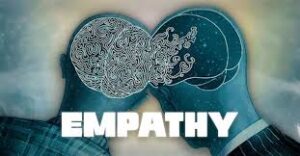
Let’s look at 3 scenarios that represent the different types of empathy:
Cognitive Empathy: During a team meeting, Sarah, the project manager, recognizes that one of her team members, John, is feeling uneasy about the extra projects being added last minute to the team. She acknowledges his perspective by saying, “I understand that handling multiple projects can be challenging. Let’s discuss how we can prioritize tasks to make it more manageable for you.
Emotional Empathy: Mark, a team member, notices that his colleague, Lisa, is visibly upset after a challenging client meeting. Instead of just understanding the situation, Mark genuinely feels Lisa’s emotions and says, “I can understand why the client’s feedback is negatively affecting you. I have experienced this too with a similar project. I’m here if you need to talk or if there’s anything I can do to support you.
Compassionate Empathy:Maria, a manager, learns that one of her team members, Alex, is facing personal challenges. Instead of simply acknowledging the situation, Maria takes compassionate action by offering flexible work hours, arranging additional support, and expressing, “I understand this is a tough time for you. Let’s work together to ensure you have the support you need to balance work and personal challenges.

4. Relationship Management:
Once you understand the emotions of yourself and others, the next question is “How do I respond to other people’s emotions?” This is where social skills comes in as the last pillar of emotional intelligence.
Relationship management refers to the ability to build and maintain positive connections with others. It also involves involves developing others, initiating and managing change, handling conflict, using the power of influence to achieve goals, and managing team dynamics.
Through careful building and management of relationships, leaders can influence team performance. This is how leaders inspire teams to support each other, resolve conflicts, and commit to a course of action. Leaders with strong relationship management skills can inspire, motivate, and guide others toward common goals.
Relationship management encompasses several key aspects such as :
Influence and Leadership:
Leaders with strong relationship management skills can inspire, motivate, and guide others toward common goals.
Communication Skills:
Effective communication is a crucial element of relationship management. Individuals with high emotional intelligence can express themselves clearly, listen actively, and adapt their communication style to different audiences and situations.
Conflict Resolution:
Relationship management involves the ability to navigate conflicts constructively. Individuals skilled in this area can address disagreements with empathy and tactfulness, finding solutions that benefit all parties involved.
Teamwork and Collaboration:
Fostering a collaborative and cooperative work environment is for success. Individuals with strong relationship management skills can build and lead effective teams, leveraging the strengths of team members to achieve common objectives.
Building Bonds:
The ability to build and nurture positive relationships is a key aspect of relationship management. This includes developing and maintaining strong connections with colleagues, superiors, subordinates, and external stakeholders.
Adaptability:
Individuals who can adjust their approach to different personalities and situations are better equipped to build and sustain positive relationships.
The key question here is: Can I manage the interaction I have with others constructively and to a positive outcome?

In a leadership context, the four quadrants of Emotional Intelligence (EQ) – Self-Awareness, Self-Management, Social Awareness, and Relationship Management – form a dynamic framework that profoundly influences a leader’s effectiveness and impact on their team and organization.
Self-Awareness: Leaders with high self-awareness possess a keen understanding of their emotions, strengths, weaknesses, values, and the impact of their behavior on others. This quadrant serves as the foundation for effective leadership. A self-aware leader can accurately recognize their emotions in various situations, allowing them to make informed decisions. This awareness also extends to understanding how personal emotions can influence their leadership style and decision-making processes.
Self-Management: Once a leader is aware of their emotions, the next step is effective self-management. This quadrant involves the ability to regulate and control one’s emotions in a constructive manner. Leaders who excel in self-management can adapt to changing circumstances, remain composed under pressure, and channel their emotions toward positive outcomes. This skill is particularly crucial in high-stakes situations where a leader’s emotional composure can set the tone for the entire team.
Social Awareness: Social awareness revolves around understanding the emotions and perspectives of others. Leaders who excel in this quadrant demonstrate empathy, attunement to the feelings of their team members, and an awareness of the broader organizational culture. Socially aware leaders can accurately interpret verbal and non-verbal cues, fostering a culture of inclusivity and openness. This skill allows leaders to navigate complex interpersonal dynamics and make decisions that consider the well-being of the entire team.
Relationship Management: Relationship management is the culmination of the other three quadrants. Leaders skilled in this area can effectively manage interpersonal interactions, build meaningful connections, and navigate conflicts. Relationship management involves clear communication, active listening, and the ability to inspire and influence others positively. Leaders who excel in this quadrant create a positive and collaborative work environment, resulting in a motivated and engaged team.
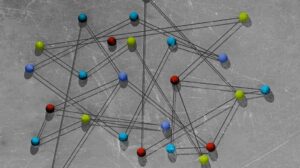
Interactions between the Quadrants:
1. Self-Awareness and Self-Management: These two quadrants are intrinsically linked. A leader’s ability to manage their emotions effectively relies heavily on their self-awareness. For instance, recognizing stress triggers allows a leader to proactively implement stress-management strategies. Self-management, in turn, enhances self-awareness by providing feedback on the effectiveness of emotional regulation.
2. Self-Awareness and Social Awareness: A leader who understands their emotions is better equipped to comprehend the emotions of others. Self-awareness lays the foundation for genuine empathy, as leaders can draw parallels between their experiences and those of their team members. This connection enhances social awareness, fostering a workplace culture rooted in understanding and mutual respect.
3. Social Awareness and Relationship Management: The ability to understand others’ emotions is pivotal in cultivating positive relationships. Socially aware leaders can adapt their communication style to resonate with diverse personalities, creating an inclusive and harmonious team culture. Relationship management involves leveraging this understanding to inspire and motivate others toward shared goals.
4. Self-Management and Relationship Management: A leader’s ability to regulate their emotions positively influences how they navigate relationships. For example, maintaining composure during challenging situations allows leaders to address conflicts constructively and build trust within the team. Self-management is, therefore, a critical component of effective relationship management.
In conclusion, the interactions between the four quadrants of EQ in a leadership context create a synergistic effect that defines a leader’s emotional intelligence. Leaders who cultivate self-awareness, self-management, social awareness, and relationship management skills form the bedrock of emotionally intelligent leadership, fostering a positive and high-performing organizational culture.

Exercise: Enhancing Emotional Intelligence in a Leadership Setting
•
• I encourage you to identify your emotions, the triggers, and the impact on of your behavior and communication.
•
• If you were effective in self-management, what did you do that was helpful?
•
• The other team member practices responding with active listening and suggesting solutions.
•
• Highlight the importance of relationship management in fostering a positive and constructive team environment.
•
• Encourage participants to apply these techniques in their real-life leadership situations.
• Emphasize the positive impact of emotionally intelligent leadership on team morale, collaboration, and overall success.

Course Manual 6: EQ Competencies
Emotional Intelligence refers to the ability to recognize, understand, manage, and effectively use one’s own emotions, as well as the ability to recognize, understand, and influence the emotions of others. EQ competencies encompass a range of skills and abilities related to emotional intelligence.
Leadership derailment often occurs when individuals lack essential emotional competencies.
Leadership derailment refers to a situation where a leader, who was initially on a successful career trajectory, experiences a sudden and significant decline in their effectiveness, reputation, or overall leadership performance. Derailment can manifest in various ways, such as a decline in job performance, damaged relationships with colleagues and subordinates, or a failure to meet organizational expectations.
Several factors can contribute to leadership derailment, and they often involve a combination of personal and professional elements. Common causes of leadership derailment are mostly related to EQ such as:
1. Lack of Self-Awareness: Leaders who lack self-awareness may be blind to their own weaknesses, behaviors, or the impact of their actions on others. This can lead to poor decision-making and an inability to adapt to changing circumstances.
2. Inability to Manage Relationships: Effective leadership often hinges on building positive relationships with team members, colleagues, and stakeholders. Leaders who struggle with interpersonal skills, communication, or collaboration may face challenges in maintaining productive and healthy relationships.
3. Resistance to Change: In rapidly evolving business environments, leaders must be adaptable and open to change. Those who resist change, cling to outdated practices, or fail to innovate may find themselves derailed as the organization moves forward.
4. Poor Decision-Making: Leaders who consistently make poor decisions or exhibit a lack of judgment can erode trust and credibility. Decision-making is a critical leadership skill, and derailment can occur when leaders fail to assess situations accurately.
5. Inability to Manage stress: Prolonged exposure to stress without adequate coping mechanisms can lead to burnout and exhaustion. Burned-out leaders may become disengaged, lose motivation, and exhibit signs of emotional and physical fatigue. This can result in decreased effectiveness and a decline in overall leadership performance.
The inability to understand and manage one’s own emotions, as well as the incapacity to navigate and influence the emotions of others, can lead to significant challenges. Leaders who struggle with emotional competencies may find it difficult to handle change, collaborate effectively within a team, and maintain positive interpersonal relations. This deficit can manifest as insensitivity, abrasiveness, or an inability to build trust among team members. Additionally, a leader’s failure to adapt to stress and pressure may result in poor decision-making and an overall breakdown in effective leadership.
Emotional competencies are integral for leaders to inspire and motivate their teams, foster a positive organizational culture, and navigate the complexities of dynamic work environments. Lack of emotional competencies not only hampers individual leadership success but can also have cascading effects on team morale, performance, and overall organizational effectiveness.

Case Study
The Center for Creative Leadership (CCL) initiated a study on executive derailment in the 1980s. McCall and Lombardo (1983) conducted interviews with 20 senior executives from three corporations. Each executive provided insights on both a “successful” and a “derailed” executive, all of whom were male. Derailed executives were defined as those who, despite having successful careers spanning 20-30 years and reaching high levels, did not fulfill their full potential according to their organizations. A commonality among them was that their stalled progression was not voluntary (McCall & Lombardo, 1983, pp. 1-2).
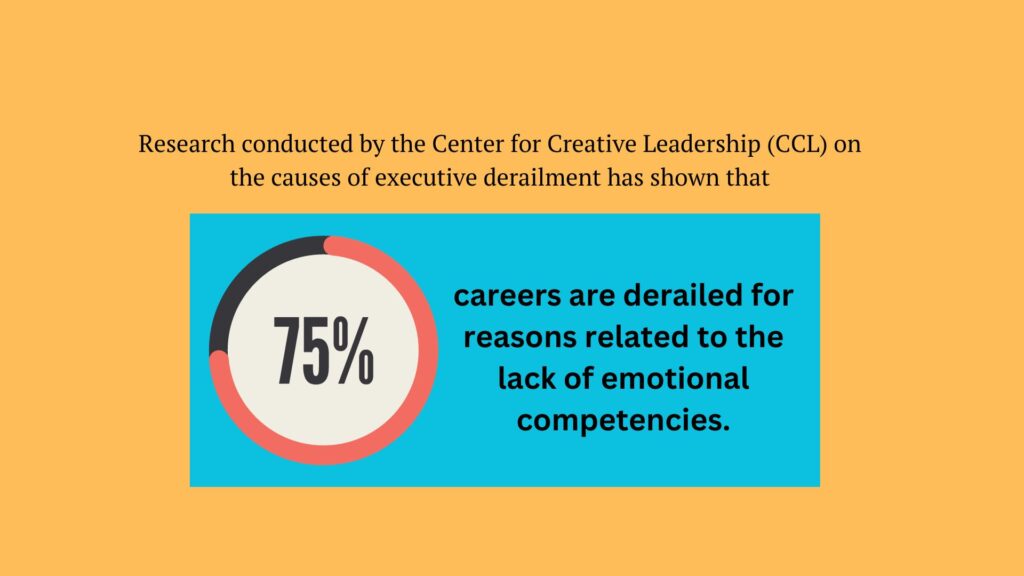
Both successful and derailed executives were bright, identified early, had outstanding achievements, few faults, and were ambitious. However, successful executives exhibited more diverse accomplishments, handled stress and mistakes with composure and grace, involved others in problem-solving, and had better interpersonal skills.
In contrast, derailed executives failed for ten reasons:
1. Specific business problems
2. Insensitivity (abrasive, intimidating, bully)
3. Cold, aloof, arrogant
4. Betrayed trust
5. Overmanaging—failed to delegate
6. Overly ambitious
7. Failed to staff effectively
8. Unable to think strategically
9. Unable to adapt to a boss with a different style
10. Overly dependent on an advocate or mentor
McCall and Lombardo (1983, p. 6) highlighted that the most frequent cause for derailment was insensitivity to others, where derailed managers became abrasive and intimidating under stress. Importantly, every derailed manager in the sample had relationship problems (reported in Morrison, White, & Van Velsor, 1987).
In summary, CCL’s derailment research utilized diverse methodologies, including quantitative and qualitative data, inductive and deductive approaches, and retrospective, cross-sectional, and predictive designs. Despite this diversity, the research consistently found that managerial failure often stems from poor business performance, leadership issues, lack of self-control, and particularly, problems in relationship management. Furthermore, these issues are often exacerbated during major changes and periods of increased stress.
Overall, research on managerial incompetence and derailment consistently reveals that a lack of self-awareness, relationship problems, poor leadership, bad business decisions, and difficulty adapting to change are predictive of failure. The study proposes organizing existing leadership competency models into four broad categories: intrapersonal skills, interpersonal skills, business skills, and leadership skills.
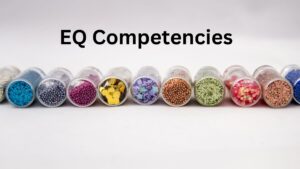
EQ Capacities and Competencies:
We will look at each of the four quadrants of EQ again, focusing on the competencies and capabilities under each pillar.
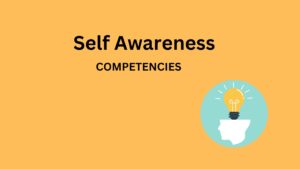
Self-Awareness
Self-awareness is a crucial component of emotional intelligence and involves recognizing and understanding one’s own emotions, strengths, weaknesses, values, and motivations.
Self-awareness competencies are the skills and abilities related to being conscious and perceptive about oneself.
Developing self-awareness competencies can lead to a deeper understanding of oneself, improved decision-making, and enhanced interpersonal relationships. It also plays a crucial role in overall emotional intelligence and contributes to personal and professional success.
Here are some key self-awareness competencies:
Emotional self-awareness: Recognizing and understanding one’s own emotions in the moment. This includes being able to identify specific feelings and understanding the reasons behind them.
Self-reflection: Taking the time to reflect on one’s thoughts, feelings, and actions. This involves a deeper exploration of one’s experiences and gaining insights into one’s behavior and its impact.
Accurate self-assessment: Objectively evaluating one’s strengths and weaknesses. This competency involves being realistic about one’s abilities and areas for improvement.
Self-confidence: Having a strong and positive sense of self-worth and self-belief. This includes having confidence in one’s abilities and a healthy level of self-assurance.
Clarity of values: Understanding and prioritizing one’s core values. This involves knowing what is important to oneself and using these values as a guide for decision-making and behavior.
Awareness of strengths and limitations: Recognizing personal strengths and acknowledging limitations. This competency involves leveraging strengths while actively working on areas that may need improvement.
Mindfulness: Being present and fully engaged in the current moment. Mindfulness practices can enhance self-awareness by promoting a non-judgmental awareness of thoughts and emotions.
Openness to feedback: Being willing to receive constructive feedback from others and using it as an opportunity for growth. This competency involves being open to different perspectives and learning from experiences.
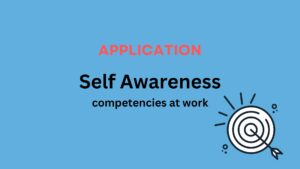
Application of Self Awareness Competencies at Work
Let’s consider a scenario where self-awareness competencies play a crucial role in a work setting:
Scenario: Self-Awareness in a Team Meeting
Imagine you are a team leader in a fast-paced project management environment. Your team is working on a critical project with tight deadlines. During a team meeting, you notice that the stress levels among team members are high, and there is a palpable sense of frustration in the room.
Here’s how self-awareness competencies might come into play:
Recognizing Your Own Emotions:
• As a self-aware leader, you first take a moment to recognize your own emotions. You acknowledge that you are feeling a bit overwhelmed by the project’s demands and deadlines.
Understanding the Impact on Behavior:
• You reflect on how your stress might be influencing your behavior and leadership style. You realize that your stress could potentially affect the team’s morale and productivity.
Self-Regulation:
• With this awareness, you consciously work on self-regulation. You take a few deep breaths, compose yourself, and decide to approach the meeting with a calm and composed demeanor.
Empathy Toward Team Members:
• During the meeting, you observe the expressions and body language of your team members. You recognize signs of stress and frustration in their faces. Your self-awareness allows you to empathize with their feelings.
Adaptability:
• Understanding that the team needs a morale boost, you adapt your communication style. Instead of focusing solely on tasks and deadlines, you take a moment to acknowledge the challenges and express your confidence in the team’s ability to overcome them.
Open Communication:
• Demonstrating self-awareness, you openly acknowledge the pressure everyone is under. You encourage team members to share their thoughts and concerns, creating an open and honest communication environment.
Seeking Feedback:
• After the meeting, you proactively seek feedback from team members about your leadership during the session. This reflects your commitment to continuous improvement and your awareness of the impact of your actions on the team.
In this scenario, self-awareness competencies enable you to navigate the challenges of a high-stress work environment effectively. By recognizing and managing your own emotions, understanding their impact, and empathizing with your team, you contribute to a more positive and productive work atmosphere.
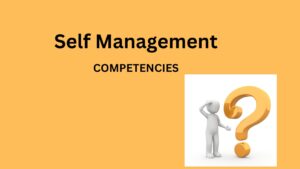
Self Management
Self-management competencies refer to a set of skills and abilities that involve managing one’s own emotions, behaviors, and reactions in various situations. These competencies are a crucial component of emotional intelligence and contribute to personal effectiveness and well-being.
Developing and enhancing self-management competencies can contribute to greater emotional intelligence and overall effectiveness in both personal and professional domains. Individuals who are adept at self-management are often better equipped to navigate the challenges of life and work with a positive and proactive mindset.
Here are some key self-management competencies:
Emotional Regulation: The ability to manage and regulate one’s own emotions, including the ability to stay calm under pressure, handle stress effectively, and avoid impulsive reactions.
Stress Management: Coping with and effectively managing stressors, both personal and professional. This includes adopting healthy coping mechanisms, time management, and maintaining a work-life balance.
Adaptability: Being flexible and adaptable in the face of change. This involves adjusting to new circumstances, learning from experiences, and embracing innovation and novelty.
Goal Setting and Achievement: Setting realistic and achievable goals, both short-term and long-term, and taking the necessary steps to accomplish them. This competency involves planning, organization, and perseverance.
Time Management: Effectively allocating time and resources to tasks and activities. This includes prioritizing tasks, setting deadlines, and avoiding procrastination.
Resilience: Bouncing back from setbacks and overcoming challenges. Resilient individuals can maintain a positive attitude in the face of adversity and learn from difficult experiences.
Self-Motivation: Being internally driven to achieve personal and professional goals. This involves maintaining enthusiasm and a sense of purpose, even when faced with obstacles.
Impulse Control: The ability to resist impulsive behaviors and think before acting. This competency is crucial in making well-considered decisions and avoiding reactions that may be detrimental in the long run.
Self-reflection: Engaging in regular self-reflection to gain insights into one’s own thoughts, emotions, and behaviors. This can lead to personal growth and a deeper understanding of oneself.
Assertiveness: Expressing one’s thoughts, feelings, and needs in a clear and respectful manner. Assertive communication is an important aspect of self-management in interpersonal relationships.
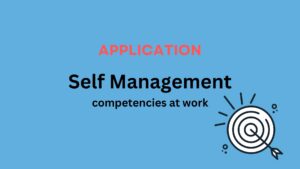
Application of Self-Management Competencies at Work
Let’s consider a scenario that illustrates self-management competencies at work:
Scenario: Deadline Pressure
Imagine you work in a project-oriented environment, and your team has a critical deadline approaching. The project is complex, and there’s a lot at stake in terms of client satisfaction and the company’s reputation. The pressure is high, and everyone is feeling the intensity of the situation.
Self-Management Competencies Demonstrated:
Stress Management:
• Behavior: You notice the rising stress levels among team members, including yourself.
• Competency: Self-awareness.
• Action: Instead of succumbing to stress, you take a moment to acknowledge your feelings and implement stress management techniques, such as deep breathing or a short walk, to maintain composure.
Time Management:
• Behavior: The workload is substantial, and time is of the essence.
• Competency: Self-regulation.
• Action: You prioritize tasks, create a realistic timeline, and set achievable goals for yourself. This involves breaking down the project into manageable segments and allocating time effectively.
Adaptability:
• Behavior: Unexpected challenges arise, potentially derailing the original project plan.
• Competency: Adaptability.
• Action: Instead of getting flustered, you adjust your approach. You communicate with the team about the changes, reassess priorities, and modify the plan as necessary, ensuring that everyone is on the same page.
Motivation:
• Behavior: The pressure is affecting the team’s morale.
• Competency: Motivation.
• Action: You encourage and motivate team members, emphasizing the importance of the project’s success and how everyone’s contributions matter. Your positive attitude helps boost team spirit and commitment.
Focus and Concentration:
• Behavior: Distractions abound as the deadline looms.
• Competency: Self-regulation.
• Action: You eliminate unnecessary distractions, create a focused work environment, and encourage others to do the same. This ensures that everyone can concentrate on their tasks without unnecessary interruptions.
Accountability:
• Behavior: Challenges arise, and there’s a possibility of not meeting the original deadline.
• Competency: Accountability.
• Action: Rather than placing blame, you take responsibility for any setbacks. You communicate transparently with the team and stakeholders, outlining the challenges and proposing solutions to get the project back on track.
In this scenario, the individual is demonstrating self-management competencies by effectively handling stress, managing time, adapting to changes, staying motivated, maintaining focus, and being accountable for the project’s success. These competencies contribute to both personal effectiveness and the overall success of the team and the project.
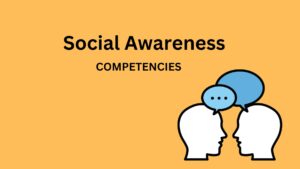
Social awareness
Social awareness competencies are a subset of emotional intelligence (EQ) that focus on the ability to understand and navigate social dynamics effectively. These competencies involve perceiving and interpreting the emotions and needs of others, as well as being aware of the broader social context.
These competencies contribute to building strong interpersonal relationships, effective communication, and successful collaboration in various social and organizational contexts. Socially aware individuals tend to excel in team environments, leadership roles, and other situations that require a deep understanding of human dynamics.
Here are some key social awareness competencies:
Empathy: Understanding and sharing the feelings of others. This involves the ability to recognize and appreciate the perspectives and emotions of different individuals, even if they differ from one’s own.
Social perception: Being attuned to social cues and nonverbal communication. This includes the ability to pick up on facial expressions, body language, and other signals that convey the emotions and intentions of others.
Cultural awareness: Recognizing and respecting cultural differences. Socially aware individuals are mindful of diverse cultural norms, customs, and values, allowing them to navigate cross-cultural interactions with sensitivity.
Organizational awareness: Understanding the dynamics and politics within an organization. This involves recognizing power structures, informal networks, and the overall organizational culture.
Service orientation: Having a genuine concern for the needs of others. This competency involves a proactive approach to helping and serving others, whether in a personal or professional context.
Political awareness: Understanding the power relationships and political dynamics in a social or organizational setting. This includes an awareness of different perspectives, alliances, and potential sources of conflict.
Persuasion: Influencing others effectively. Socially aware individuals are adept at understanding the motivations and concerns of others, allowing them to tailor their communication and persuasive efforts accordingly.
Conflict resolution: Navigating and resolving conflicts in a constructive manner. This involves understanding the root causes of conflicts, managing emotions, and finding mutually beneficial solutions.
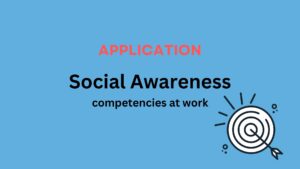
Application of Social Awareness Competencies at Work
Here’s an example of how social awareness competencies might play out in a work setting:
Scenario:
Context: Jane works in a marketing team where collaboration and teamwork are crucial for success. There’s a project meeting scheduled, and tensions have been rising due to conflicting ideas about the new campaign.
Empathy: During the meeting, Jane notices that some team members seem hesitant to voice their opinions. She observes their body language and senses the unease in the room.
Interpersonal Awareness: Recognizing the tension, Jane understands that acknowledging and addressing the team’s feelings is essential to fostering an open discussion.
Communication Skills: Instead of diving straight into the agenda, Jane starts the meeting by addressing the atmosphere. She encourages everyone to share their thoughts and feelings about the campaign without judgment.
Conflict Resolution: As differing opinions arise, Jane listens actively, acknowledging each viewpoint and highlighting common ground. She guides the discussion towards finding a compromise that incorporates the best aspects of each idea.
Empowering Others: Jane ensures that quieter team members have the chance to contribute by specifically inviting their input and acknowledging the value of their ideas.
Adaptability: Throughout the meeting, Jane remains flexible, willing to adjust the direction of the discussion based on the evolving dynamics and feedback from the team.
Respect for Boundaries: Jane ensures that everyone feels respected and heard by moderating the discussion and discouraging interrupting or dismissing others’ ideas.
Feedback and Accountability: After the meeting, Jane follows up with individual team members, expressing appreciation for their contributions and addressing any concerns they might have raised during the discussion.
In this scenario, Jane demonstrates social awareness competencies by understanding the emotions and dynamics within the team, effectively communicating, facilitating a constructive discussion, and ensuring that everyone feels valued and heard. These competencies help foster a more inclusive, collaborative, and productive work environment.
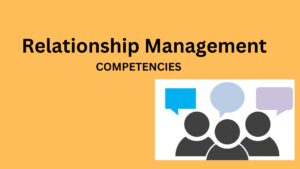
Relationship Management
“Relationship competencies” typically refer to a set of skills and abilities that contribute to building, maintaining, and navigating healthy relationships with others. These competencies are often associated with interpersonal effectiveness and are crucial in both personal and professional contexts.
These relationship competencies are essential in various aspects of life, including family dynamics, friendships, romantic relationships, and professional interactions. Developing and honing these skills can lead to more fulfilling and productive relationships.
Here are some key relationship competencies:
Communication Skills: The ability to express thoughts, feelings, and ideas clearly and effectively. This includes active listening, nonverbal communication, and the capacity to articulate oneself in a way that is easily understood.
Empathy: Understanding and sharing the feelings of others. Empathy involves being attuned to the emotions of those around you, recognizing their perspectives, and responding in a supportive and compassionate manner.
Conflict Resolution: The ability to address and resolve conflicts in a constructive way. This includes effective negotiation, compromise, and finding solutions that are mutually beneficial.
Collaboration and Teamwork: Working effectively with others towards a common goal. This involves contributing to group efforts, valuing diversity, and fostering a positive and cooperative team environment.
Interpersonal Awareness: Being aware of social dynamics, understanding the needs and motivations of others, and navigating relationships with cultural sensitivity.
Trust Building: Establishing and maintaining trust in relationships. This involves being reliable, honest, and consistent in one’s actions and communication.
Adaptability: The ability to adjust to changing circumstances and navigate evolving relationships. Being adaptable allows individuals to respond effectively to new situations and challenges.
Resilience: Bouncing back from setbacks and challenges in relationships. Resilient individuals can maintain a positive attitude and continue to work towards relationship goals despite difficulties.
Boundaries: Setting and respecting personal and professional boundaries. This involves understanding one’s own limits and communicating them effectively, as well as respecting the boundaries of others.
Feedback and Accountability: Providing and receiving feedback constructively, and taking responsibility for one’s actions in relationships.
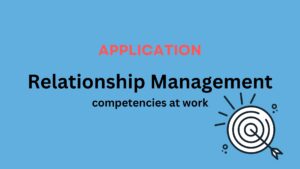
Application of Relationship Management Competencies at Work
Here’s a scenario that highlights relationship management competencies in a workplace setting:
Scenario:
Context: Jane is a project manager leading a diverse team on a critical project. The team consists of individuals from different departments, varying levels of experience, and different work styles. Due to the project’s complexity, there have been misunderstandings and tension among team members, impacting collaboration and productivity.
Communication Skills: Jane notices the communication breakdowns and schedules a team meeting. She uses active listening to understand each team member’s perspective on the project challenges and encourages open dialogue.
Conflict Resolution: During the meeting, conflicts arise about the project approach. Jane facilitates a constructive discussion, acknowledging differing viewpoints, and guides the team to find common ground. They establish a framework for addressing disagreements respectfully.
Empathy: Jane recognizes the stress some team members are experiencing due to the project’s demands. She takes time to have one-on-one conversations, showing empathy and offering support to those who need it.
Collaboration and Teamwork: Understanding the strengths of each team member, Jane reorganizes tasks to capitalize on individual skills, fostering a sense of collaboration and unity towards achieving project goals.
Trust Building: To address trust issues stemming from misunderstandings, Jane organizes team-building exercises and activities that encourage bonding and reinforce trust among team members.
Feedback and Accountability: Jane establishes a culture of giving and receiving feedback. She encourages team members to provide constructive feedback to one another and takes responsibility for ensuring that feedback is acted upon to improve performance.
Adaptability: Recognizing the evolving nature of the project, Jane remains flexible in her approach. She adjusts deadlines and strategies when necessary, keeping the team informed and involved in decision-making processes.
By employing these relationship management competencies, Jane successfully improves team dynamics, resolves conflicts, enhances communication, and fosters a more collaborative and supportive work environment. This leads to increased team morale and higher productivity, ultimately contributing to the success of the project.
In summary, below is a snapshot of some of the EQ competencies in Goleman’s model of EI:


Exercise: Reflecting on Personal EQ Competencies
•
• Self-Reflection: Ask each participant to take a moment to reflect on their own EQ competencies. Provide an EQ competencies quadrant (see above)

Course Manual 7: Bar-On Model
In prior course manuals, we looked at Goleman’s model of Emotional Intelligence. We are now transitioning to Bar-On model, which is the model that your self-assessment is based upon.
The rest of this workshop will focus on understanding this instrument, interpreting and debriefing your assessment, synthesizing Goleman and Bar-On Models, and finally designing your developmental plan.
Let’s start by understanding the Bar-On model of Emotional Intelligence, formerly known as The Emotional Quotient Inventory, now called EQ-i 2.0.
According to the Bar-On model, Emotional intelligence is a set of emotional and social skills that influence the way individuals perceive and express themselves, develop and maintain social relationships, cope with challenges, and use emotional information in an effective and meaningful way.

Let’s look at the definition through the various components of the model:
• Self-Perception and Self-Expression – perceive and express ourselves
• Interpersonal – develop and maintain social relationships
• Decision-Making – use emotional information in an effective and meaningful way
• Stress Management – cope with challenges.
The Emotional Quotient Inventory (EQ-i 2.0) is a comprehensive tool designed to assess and enhance emotional intelligence.

The EQ-i 2.0 is the world’s leading measure of emotional intelligence, applying decades of research to support effective human performance and development. For almost 20 years, consultants and organizations have trusted the science that underpins the EQ-i 2.0® to help improve human performance.
Being the first scientifically validated measure of EI, coupled with research from premier organizations, it means you can count on the EQ-i 2.0 to add robustness and accuracy to this EQ Leader program.
The EQ-i 2.0 is a psychometric assessment that measures emotional intelligence (EI) and how it can impact people and the workplace.

The Science Behind EQ-I 2.0
Reliability:
The reliability of an assessment is often referred to as its consistency. That is, how consistent it is at measuring what it aims to measure. The two most important types of reliability for assessments are:
• INTERNAL CONSISTENCY— Refers to how well all the items of a certain scale measure the same idea.
• TEST-RETEST— Refers to how well the assessment can produce the same results over time for the same person.
This means that your scores will remain stable over time (unless development efforts are used to improve their scores) and that items measuring a certain subscale all tap into aspects of that subscale (e.g., all Empathy items are measuring the idea of Empathy).
Overall, the EQ-i 2.0® exhibits strong reliability, both in terms of internal consistency and test-retest.
The EQ-i 2.0 assessment has been proven as a reliable assessment because it measures what is says it measures. Based on results from numerous statistical analyses, users of the EQ-i 2.0 can be confident that the scores generated by this assessment will be consistent and reliable. The EQ-i 2.0 is recognized by the American Psychological Association as a reliable assessment of emotional intelligence and considered a Level B Instrument that requires its users to be certified.
Level B means that the assessment has been constructed to a robust psychometric standard. Most Emotional Intelligence assessments in the marketplace today are not Level B. Non Level B EI assessments may still provide some value but they are not backed the science, reliability, and validity of a Level B. As mentioned earlier, the EQ-i 2.0 assessment is the world’s first scientifically validated assessment of emotional intelligence.
Because it is a Level B Psychometric, this means that the EQ-i 2.0 can only be given by a certified administrator.

Validity:
Validity ensures the accuracy and usefulness of an assessment. Although there are many different types of validity, they all focus on ensuring the assessment is measuring what it was designed to measure and whether it can predict important outcomes and can be assessed through a combination of several different types of validity evidence.
The EQ-i 2.0 was originally developed in North America but has been used in all regions of the world. The structure of the test, the consistency and accuracy of the items, and the results produced have been replicated across the globe and continues to enable a wide variety of cultures and languages to use the tool effectively to measure emotional intelligence. Overall, the EQ-i 2.0 has extensive evidence supporting its external validity: Predicts job performance, can be used to predict and improve leadership competencies, holds up in different regions across the world and is based on a history of assessment research spanning decades.
Normative Data:
The general population normative sample for the EQ-i 2.0 is extensive (N=4,000) and closely representative of adults residing in the US (90% of the sample) and Canada (10% of the sample) within 4% of census data. A customer-based professional global normative sample (N=10,000) consisting of 154 countries was updated in 2014.
Other normative samples are available for the US & Canada (professional), the UK and Ireland (general population and professional), Australia (general population), Denmark (professional), and Sweden (professional).
The validity of an assessment ensures the accuracy and usefulness of an assessment. Although there are many different types of validity, they all focus on ensuring the assessment is measuring what it was designed to measure and whether it can predict important outcomes.
The EQ-i 2.0® was developed through an extensive process that ensured its content:
• Reflects the model and scope of EI
• Truly measures the concept of EI
• Has a structure that is dependable and applicable to a wide variety of contexts (e.g., development, coaching, leadership, etc.).
Validity Video (MHS)
Reliability and validity are important when selecting a psychological assessment for use in your organization. Knowing that the EQ-i 2.0® accurately measures EI, your development efforts will have meaningful impact on your increasing EQ and improvement in your job performance, leadership competencies, intrapersonal skills, and more.

Case Study: New US Air Force Study
The study conducted by the US Air Force (USAF) explored the relationship between emotional intelligence (EI) and occupational performance, specifically in the context of military recruitment and training. This research aimed to assess the cost-effectiveness of applying the Bar-On Emotional Quotient Inventory (EQ-i) as a tool for identifying high-performing individuals.
The study, initiated in 2008, involved 200 pararescue jumpers (PJs) undertaking a rigorous and specialized military training program costing $250,000 per trainee. All trainees completed the Bar-On EQ-i, a self-report measure assessing emotionally and socially intelligent behavior. The researchers utilized a forward stepwise Discriminant Function Analysis (DFA) to compare the EQ-i scores of trainees who successfully completed the program with those who did not. This analysis aimed to identify the specific emotional intelligence competencies that correlated with successful course completion.
The results revealed a significant relationship between emotional intelligence and performance among PJ trainees. The DFA generated an overall regression coefficient of .45, indicating the impact of EI on predicting successful course completion. Five EQ-i subscales—Self-Regard, Reality Testing, Flexibility, Optimism, and Happiness—were identified as significant predictors of success. According to the Bar-On model of emotional intelligence, individuals with good self-awareness, the ability to validate their feelings, adaptability, optimism, and positivity were more likely to complete the demanding course successfully. This model accounted for 20% of the variance in predicting course completion and demonstrated an accuracy level of 75% in classifying future trainees.
Conclusion:
The findings from this study supported existing research indicating the substantial influence of emotional intelligence on occupational performance. By applying the identified EI model, the USAF estimated potential savings of approximately $190,000,000 by reducing mismatches and selecting individuals better suited for the course. This outcome highlighted the cost-effectiveness of using emotional intelligence assessments, specifically the Bar-On EQ-i, for personnel selection and training.
Additionally, these results underscored the predictive validity of the Bar-On EQ-i and its potential application in what was referred to as Star Performer Profiling™. This approach, pioneered by Reuven Bar-On and used globally since 1997, involved employing emotional intelligence assessments for hiring, training, and promoting high performers within organizations.
The immediate gain was a saving of $3 million annually. These gains resulted in the Government Accounting Office submitting a report to Congress, which led to a request that the Secretary of Defense order all branches of the armed forces to adopt this procedure in recruitment and selection. (The GAO report is titled, “Military Recruiting: The Department of Defense Could Improve Its Recruiter Selection and Incentive Systems,” and it was submitted to Congress January 30, 1998.

Why the EQ-i 2.0 Stands Out:
The EQ-i 2.0 model is distinctive in several ways, setting it apart from other models of emotional intelligence assessment. Here are some key features that make the EQ-i 2.0 unique:
Multidimensional Approach: Unlike some models that focus primarily on a few aspects of emotional intelligence, the EQ-i 2.0 adopts a multidimensional approach. It assesses emotional intelligence across five key composite scales, providing a comprehensive view of an individual’s emotional and social functioning.
Incorporation of Subscales: The EQ-i 2.0 goes beyond broad categories and includes fifteen specific subscales. These subscales offer a granular analysis, allowing individuals to understand their emotional intelligence at a detailed level. This nuanced approach facilitates targeted development efforts based on specific strengths and areas for improvement.
Built on Robust Research: The EQ-i 2.0 model is grounded in extensive research and psychometric validation. It has undergone rigorous testing to ensure reliability and validity, providing users with confidence in the accuracy and relevance of the assessment.
Applicability Across Diverse Contexts: The model is designed to be applicable across various contexts, including personal development, leadership, team dynamics, and organizational effectiveness. Its versatility makes it a valuable tool for individuals and organizations seeking to enhance emotional intelligence at multiple levels.
Self-Report Format: The EQ-i 2.0 is a self-report assessment, meaning individuals provide information about their own emotional experiences and behaviors. This format offers a direct insight into how individuals perceive and respond to emotional situations, capturing their self-awareness and self-perception.
Focus on Positive Psychology: The EQ-i 2.0 emphasizes positive psychology by including subscales such as Happiness and Optimism. This approach not only identifies areas for improvement but also highlights an individual’s positive emotional attributes, promoting a strengths-based perspective.
Practical and Actionable Results: The model provides results that are not only insightful but also practical. Individuals receive feedback that is easily understandable and applicable, allowing them to take specific actions for personal and professional development based on their emotional intelligence profile.
Continual Evolution: The EQ-i 2.0 model reflects ongoing advancements in the understanding of emotional intelligence. As the field of emotional intelligence research progresses, the EQ-i 2.0 is updated to ensure it remains relevant and reflective of the latest insights in the realm of emotional and social functioning.
Now let’s look at the model itself.
image too blurred
Understanding Composite Scales and Subscales:
The 5 Composite Scales and 15 Subscales
The EQ-i 2.0 model is made up of five composite scales, each encompassing specific subscales that collectively measure various aspects of emotional intelligence.
Let’s delve into each scale and the subscales:

1. Self-Perception:
Self-perception refers to how individuals perceive and evaluate themselves in various emotional and social situations. Self-Regard is a good place to start, because it provides a clue to a baseline to one’s thoughts and feelings about themselves.
This scale measures how individuals perceive and evaluate themselves. It explores their self-confidence, self-regard, and the extent to which they recognize and pursue their own strengths and potential.
image too blurred
The subscales of Self-Perception are:
• Self-Regard: This subscale reflects one’s self-confidence, self-respect, and positive self-regard. Individuals with high self-regard have a strong sense of self-worth.
• Emotional Self-Awareness: It involves recognizing, understanding, and accurately identifying one’s own emotions. Individuals high in this subscale have a keen awareness of their feelings.
• Self-Actualization: This subscale measures an individual’s drive to achieve personal goals and aspirations, reflecting their ability to strive for personal growth and fulfillment.
2. Self-Expression:
This component focuses on how individuals express their emotions and thoughts. It looks at the outward manifestation of one’s emotional experiences and the ability to communicate effectively. Self-Expression scale assesses assertiveness, emotional expression, and independence.
image too blurred
The subscales of Self-expression are:
• Emotional Expression: Assessing how effectively individuals express their emotions to others. High scorers tend to openly and appropriately express their emotions.
• Assertiveness: This subscale measures an individual’s ability to express their thoughts, beliefs, and needs openly and confidently without being overly aggressive or passive.
• Independence: Reflects an individual’s ability to be self-reliant, autonomous, and make decisions independently without undue influence from others.
3. Interpersonal:
The Interpersonal scale evaluates an individual’s ability to form and maintain positive relationships with others. It includes Interpersonal Relationships, Empathy, and Social Responsibility, providing insights into how one navigates social dynamics.
image too blurred
The subscales of Interpersonal are:
• Interpersonal Relationships: Measures an individual’s ability to establish and maintain mutually satisfying relationships. High scores indicate proficiency in nurturing positive connections.
• Empathy: Evaluates the capacity to understand and consider others’ feelings and perspectives. High scorers tend to be sensitive and empathetic towards others.
• Social Responsibility: Reflects an individual’s awareness and willingness to contribute to the welfare of society and fulfill societal roles and responsibilities.
4. Decision Making:
This scale is about assessing an individual’s approach to decision-making, This includes Problem Solving, Reality Testing, and Impulse Control. It gauges how effectively someone can make sound judgments, solve problems, and manage impulsive reactions.
image too blurred
The subscales of Decision Making are:
• Problem Solving: Assesses the ability to identify problems and find effective solutions. High scorers are adept at addressing challenges logically and creatively.
• Reality Testing: Evaluates an individual’s capacity to see situations objectively without bias or distortion. High scorers tend to accurately assess reality.
• Impulse Control: Reflects the ability to manage impulses and emotions, demonstrating restraint and thoughtful decision-making even in emotionally charged situations.
5. Stress Management:
This scale focuses on the ability to handle stress and navigate challenging situations. This includes Flexibility, Stress Tolerance, and Optimism. It reflects an individual’s capacity to adapt, remain resilient, and maintain a positive outlook even in stressful circumstances.
image too blurred
The subscales of Stress Management are:
• Flexibility: This subscale measures an individual’s adaptability to change and openness to new ideas or approaches.
• Stress Tolerance: Assesses the ability to withstand stress and cope effectively with challenging situations without being overwhelmed.
• Optimism: Reflects an individual’s ability to maintain a positive outlook and resilience in the face of adversity or setbacks.
Each of these fifteen subscales contributes to the broader composite scales, providing a comprehensive assessment of an individual’s emotional intelligence across various domains.
The EQ-i 2.0 model also offers insights into strengths and areas for development, enabling individuals to enhance emotional intelligence for improved personal and professional outcomes.
The scales on the EQ-I- 2.0 are interrelated, meaning that a deficit in one area can indicate and lead to a deficit in other areas, and the strengthening of one area, will lead to the strengthening of other areas.

Self-Perception
In the context of the EQ-i 2.0 model, self-perception is a critical component that profoundly influences a leader’s effectiveness. Self-perception involves how leaders perceive and evaluate themselves, and it plays a pivotal role in shaping their leadership style and interactions. A leader’s confidence, self-regard, and ability to recognize and harness their strengths directly impact their decision-making, communication, and overall leadership approach. Leaders with a strong sense of self-perception are more likely to navigate challenges with resilience, make informed decisions based on a realistic understanding of their abilities, and project confidence that inspires trust among team members. Additionally, self-perception contributes to emotional self-awareness, a key competency, enabling leaders to recognize and manage their emotions effectively. By prioritizing self-perception, leaders can cultivate a solid foundation for leadership, fostering authenticity, self-assurance, and a positive influence on the organizational culture. In essence, self-perception serves as a cornerstone for leaders to build their emotional intelligence, enhancing their ability to lead with insight, authenticity, and emotional resilience.
What is at stake here?
A leader with low self-regard may exhibit a lack of confidence and a diminished sense of self-worth. This individual may struggle to recognize and appreciate their own abilities and contributions, leading to self-doubt and insecurity. In a leadership context, low self-regard can manifest as hesitancy in decision-making, reluctance to take on challenges, and difficulty in asserting oneself. Such a leader may also be more prone to seeking external validation and approval, potentially impacting their ability to inspire and guide a team with confidence. Addressing and developing self-regard becomes crucial for enhancing a leader’s overall emotional intelligence, as it lays the foundation for effective self-awareness and positive leadership presence.
Self-Expression
Self-expression is a vital component of effective leadership. Leaders who excel in self-expression are adept at articulating their thoughts, emotions, and vision with clarity and authenticity. This competency encompasses the ability to express oneself assertively, transparently, and empathetically. For a leader, the capacity to communicate openly fosters trust among team members, establishes a positive organizational culture, and enhances overall team cohesion. A leader’s skill in self-expression also extends to active listening, allowing them to understand the perspectives and concerns of others. This emotional intelligence competency contributes to a leader’s ability to inspire, motivate, and engage their team, creating an environment where open communication thrives. Ultimately, leaders who prioritize and excel in self-expression cultivate a workplace where ideas flow freely, relationships flourish, and collective goals are pursued with shared understanding and commitment.
What is at stake here?
A leader who scores low in the self-expression may experience challenges in openly expressing their thoughts, feelings, and ideas. This deficiency in self-expression can result in a lack of transparency and authentic communication within the leadership role. Such a leader might struggle to articulate their vision effectively, hindering the team’s understanding and alignment with organizational goals. Additionally, a leader with low self-expression might find it challenging to provide constructive feedback or openly acknowledge their emotions, leading to a potential disconnect with team members.
Interpersonal
The Interpersonal Composite Scale encapsulates key competencies essential for effective leadership, emphasizing the leader’s ability to navigate and foster positive relationships. Leaders with high Interpersonal scores exhibit strong interpersonal skills, empathy, and an understanding of social dynamics. These leaders excel in communication, conflict resolution, and collaboration, fostering a harmonious and productive work environment. The ability to connect with and inspire team members, clients, and stakeholders is crucial for leadership success. Leaders who score high in the Interpersonal Composite Scale not only build trust and rapport but also navigate complex social situations adeptly. This composite scale, therefore, serves as a compass for leaders, guiding them in cultivating meaningful connections, fostering teamwork, and ultimately contributing to the overall success and well-being of the team and the organization. In essence, the Interpersonal Composite Scale is a linchpin in the emotional intelligence repertoire, reflecting a leader’s capacity to navigate the intricacies of human interaction in the professional landscape.
What is at stake here?
A leader with low interpersonal skills may struggle in building and maintaining effective relationships with others. This deficiency can manifest in challenges related to communication, collaboration, and conflict resolution. Such a leader may find it difficult to connect with team members, understand their perspectives, or create a positive and cohesive work environment. The lack of interpersonal competence might hinder the leader’s ability to inspire trust, delegate effectively, and navigate complex social dynamics within the team. In turn, this could lead to strained relationships, decreased morale among team members, and potential obstacles in achieving collective goals.
Decision-Making
The Decision-Making composite scale is a critical for effective leadership. It reflects a leader’s ability to make sound and rational decisions while considering emotional factors. Leaders with a high score in this composite scale exhibit a capacity to weigh various options, anticipate potential emotional impacts, and navigate complex decision-making scenarios. This competency is vital as leaders often face situations that require astute judgment and a balance between rational analysis and emotional intelligence. A leader’s decisions can significantly influence team dynamics, organizational culture, and overall success. A heightened ability to make decisions with emotional intelligence contributes to a positive work environment, fosters trust among team members, and enhances overall team performance. It ensures that leaders approach decision-making holistically, acknowledging the emotional dimensions inherent in complex organizational landscapes. In essence, a robust Decision-Making composite scale is integral for leaders aiming to steer their teams and organizations toward success while fostering a culture of understanding and adaptability.
What is at stake here?
A leader with low scores in the Decision-Making composite scale may struggle in crucial aspects of decision-making processes. Such a leader may find it challenging to make timely and effective choices, experiencing hesitancy or indecision. This can impede progress, create uncertainty among team members, and potentially lead to missed opportunities. A leader with low decision-making skills might grapple with analyzing information, assessing risks, or committing to a course of action. This deficit can impact not only the leader’s personal effectiveness but also the team’s overall productivity and success.
Stress Management
The “Stress Management” composite scale holds paramount importance in assessing a leader’s ability to navigate and effectively cope with stressors. Leadership roles are often accompanied by high-pressure situations, uncertainties, and challenges. A leader’s capacity to manage stress not only influences their own well-being but also significantly impacts their decision-making, interpersonal relationships, and overall leadership effectiveness. The Stress Management composite scale delves into an individual’s resilience, adaptability, and coping mechanisms when faced with stress. A leader proficient in stress management is better equipped to maintain composure during challenging circumstances, make sound decisions, and foster a positive work environment. Moreover, effective stress management contributes to the leader’s long-term health, preventing burnout and ensuring sustained high performance. As such, the ability to manage stress emerges as a critical competency within the EQ-i 2.0 model, underlining its relevance for leaders striving for both personal and organizational success.
What is at stake here?
A leader who tends to be low stress management is likely to struggle in coping with the pressures and demands of their role. This individual may find it challenging to maintain composure during high-stress situations, leading to impaired decision-making and potential interpersonal conflicts within the team. The leader may exhibit signs of emotional volatility, impacting not only their own well-being but also the overall team dynamics. The inability to effectively manage stress could contribute to increased absenteeism, decreased productivity, and a negative work environment.

Exercise: Explaining EQ-i 2.0 Model
1. Preparation:
• Divide the group into two groups of five each. Each group will assign a composite scale and associated sub scales to each person: Self-Perception, Self-Expression, Interpersonal, Decision Making, and Stress Management.
2. Rotation:
• Take turns explaining assigned scales until all five composite scales have been presented. Each participant will have contributed to explaining one composite scale.

Course Manual 8: Debriefing Assessments
There are three parts to this course manual:
Part 1: How to Get the Most out of the debrief
Part 2: EQ Debrief Goal
Part 3: Interpreting Assessments.
Part 1: How to Get the Most out of the Debrief

Before we get started, let’s establish some ground rules:
1. Confidentiality: What’s shared in this room stays in this room. Let’s respect each other’s privacy and create an atmosphere of trust.
2. Active Listening: When someone’s sharing, let’s give them our full attention. This is an opportunity to practice EQ social skills order to understand each other.
3. Respect and Empathy: We’re all on this journey together, and respecting each other’s feelings and opinions is crucial. Embrace different viewpoints. We’re all here to learn from each other’s diverse perspectives.
4. No Judgment Zone: This is a safe space. Feel free to express your strengths and areas for improvement without fear of judgment. The purpose of this session is personal development, not judgment.
5. Constructive Feedback: If you’re providing feedback, let’s keep it constructive. Specific and helpful feedback is always helpful.
6. Self-Reflection: This is your journey. If you need more time or need to pause, feel free to let the group know.

The Elements of an Effective Group Debrief:
In order for this group debrief to be effective, here are some key elements that will contribute to a successful group debrief:
1. Positive and Inclusive Atmosphere: We will establish a positive and inclusive environment. This sets the tone for open and respectful communication.
2. Get clear on Goals and Objectives: We will clearly articulate the objectives of the debrief and what to expect. This helps focus the discussion and ensures that everyone understands the purpose of the session.
3. Peer Learning: This will be a space for peer learning by sharing experiences and insights. This creates a dynamic learning environment where we can benefit from each other’s perspectives.
4. Develop Action Plans: You will collaboratively develop action plans for applying the learnings. You will have the opportunity to set specific, measurable, and achievable goals for enhancing their emotional intelligence and integrating it into your professional and personal lives.
Part 2: EQ Debrief Goal
Before we begin looking at the assessment results, it’s critical that you reflect on why you enrolled this in this program.
To facilitate getting clear on your goal for this program, think of yourself in these 3-dimensions:
1. Personal Growth
2. Professional Development
3. Relationships
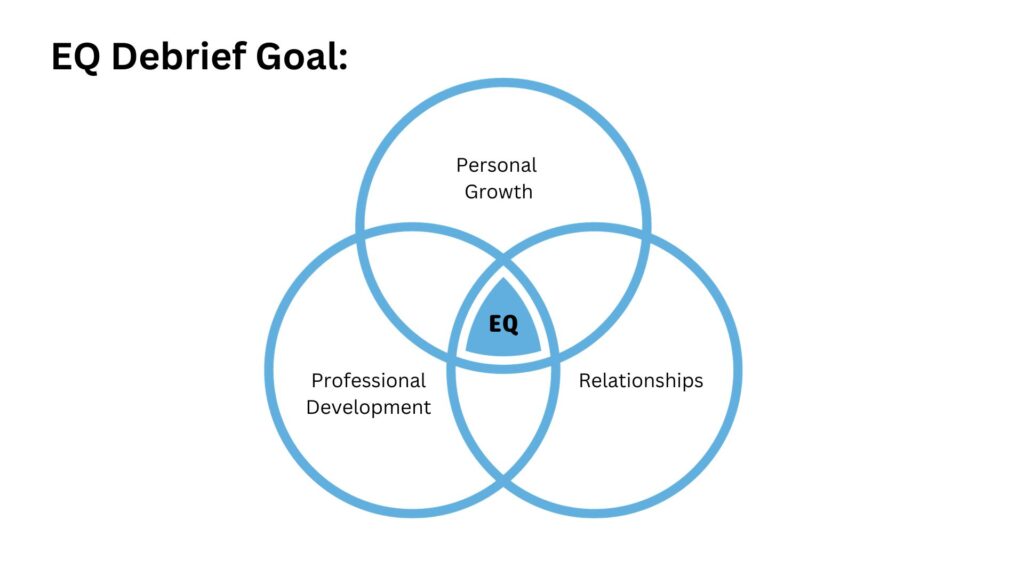
Here are some examples of developmental goals that you may want to use as a springboard:
1. Self-Awareness Goal: Increase self-awareness by regularly reflecting on emotional reactions and identifying patterns in emotional responses.
2. Emotional Self-Regulation Goal: Develop strategies to manage stress effectively and maintain emotional composure in challenging situations.
3. Strengthening Empathy Goal: Practice active listening and perspective-taking to better understand others’ emotions and experiences during interactions with colleagues.
4. Building Interpersonal Relationships Goal: Improve communication skills and establish stronger connections with colleagues and in my personal life.
5. Cultivating Social Skills Goal: Enhance social skills by participating in networking events, team-building activities, or collaborative projects.
6. Increasing Motivation Goal: Set and pursue meaningful goals aligned with personal values, fostering a sense of purpose and motivation.
7. Self-Confidence Goal: Work on building self-confidence by acknowledging achievements and adopting a positive mindset.
8. Developing Conflict Resolution Skills: Acquire strategies for resolving conflicts constructively and maintaining positive relationships in the face of disagreement.
9. Promoting Emotional Expression Goal: Cultivate openness in expressing emotions appropriately, both in professional and personal contexts.
10. Practicing Mindfulness Goal: Incorporate mindfulness practices into daily routines to increase self-awareness and manage stress effectively.
11. Building Resilience Goal: Develop resilience by reframing setbacks as opportunities for learning and growth.
12. Promoting Team Collaboration Goal: Enhance collaboration within teams by fostering a positive and inclusive team culture.
13. Developing Flexibility: Goal: Improve adaptability to change by embracing flexibility and adjusting to new situations with a positive mindset.
14. Cultivating Optimism Goal: Foster an optimistic outlook by focusing on positive aspects, even in challenging circumstances.
15. Setting Boundaries Goal: Establish healthy boundaries in personal and professional relationships to maintain well-being and prevent burnout.
Reflection: Goal-setting: Take a few minutes to write down your developmental goals.

Part 3: Interpreting Assessments
How does the EQ-i 2.0 Model work in a Leadership development program?

CASE STUDY: EQ-i 2.0 in Leadership Development
According to MHS information resource, The Ottawa Hospital’s Leadership Academy has incorporated the use of the EQ-i 2.0 to promote and enhance self-awareness and other essential leadership skills. Emotional Intelligence development is viewed as an integral element of professional development and the hospital focuses on EI coaching for people leaders, physicians and support staff. Hospital staff face unique challenges every day in providing patient services while managing typical workplace situations and stressors. The Hospital recognized that although doctors are good at their craft, they sometimes lack the communication, empathy, and interpersonal skills necessary to become better leaders and provide patient-focused healthcare. Research has illustrated the importance of incorporating emotional intelligence in medical admission
systems above cognitive intelligence.
The importance of EI in the medical community is echoed in the interest of using EI to select medical students or as an integrated training component of medical degrees. Progressive surgical programs have begun implementation of assessment and training as an established component of their curricula. The EQ-i 2.0 tool has proved to be very effective in assisting staff in non-leadership roles that may be technical experts, but struggle with personal insight. In short, understanding and dealing with one’s emotions and the emotions of others in often stressful environments is at the heart of the skills and competencies involved in EI.
The study highlights the integration of the EQ-i 2.0 (Emotional Quotient Inventory) tool by the Ottawa Hospital’s Leadership Academy to promote and enhance leadership skills, with a particular focus on self-awareness. The study emphasizes the significance of emotional intelligence (EI) in professional development within a hospital setting, targeting people leaders, physicians, and support staff.
Key Points from the Study:
1. Integration of EQ-i 2.0 in Leadership Development:
The Ottawa Hospital’s Leadership Academy incorporates the EQ-i 2.0 as a fundamental tool for leadership development. The focus is on cultivating self-awareness and other essential leadership skills using emotional intelligence as a core element.
2. Targeted EI Coaching for Various Roles:
The hospital recognizes the diverse roles within its staff, including people leaders, physicians, and support staff. EI coaching is tailored to address the specific challenges faced by each group, acknowledging that different roles require different aspects of emotional intelligence for effective leadership.
3. Unique Challenges in Healthcare Settings:
Healthcare professionals, including doctors, encounter unique challenges in their daily work, such as managing patient services, navigating workplace situations, and coping with stressors. The study underscores the importance of emotional intelligence in equipping healthcare professionals with the communication, empathy, and interpersonal skills necessary for effective leadership and patient-focused healthcare.
4. Emphasis on Emotional Intelligence for Medical Admissions:
The study highlights the interest in using emotional intelligence not only in leadership development but also in the selection of medical students. It suggests that emotional intelligence is viewed as a crucial component in medical education and training, acknowledging its significance alongside cognitive intelligence.
5. Application in Surgical Programs:
Progressive surgical programs are noted to have implemented emotional intelligence assessment and training as an established component of their curricula. This indicates a broader recognition within the medical community of the importance of emotional intelligence in preparing medical professionals for their roles.
6. Effectiveness for Technical Experts:
The study notes that the EQ-i 2.0 tool has proven to be effective in assisting staff in non-leadership roles who may be technical experts but face challenges in personal insight. This underscores the applicability of emotional intelligence in various capacities, beyond leadership roles.
7. Stressful Environment and Emotional Competencies:
The study emphasizes that dealing with emotions, both one’s own and those of others, is at the core of the skills and competencies involved in emotional intelligence. This is particularly crucial in often stressful environment of a healthcare setting.
Conclusion:
The study showcases the proactive integration of emotional intelligence, as measured by the EQ-i 2.0, in the leadership and professional development initiatives of the Ottawa Hospital. It recognizes the diverse needs of healthcare professionals and highlights the role of emotional intelligence in addressing these needs for effective leadership and quality patient care.
As a pre-requite for this program, you took an online self-rating assessment.
In addition to your Individual assessment, you also have the option of adding a 360-assessment using multiple raters. The EQ-i 2.0 360 assessment provides a comprehensive and multi-perspective view of an individual’s emotional intelligence. The 360-degree feedback involves gathering input from others such as colleagues, supervisors, and direct reports. The report is then compared with your self-assessment.
This section will enable you to understand and interpret your results based on how you rated yourself.
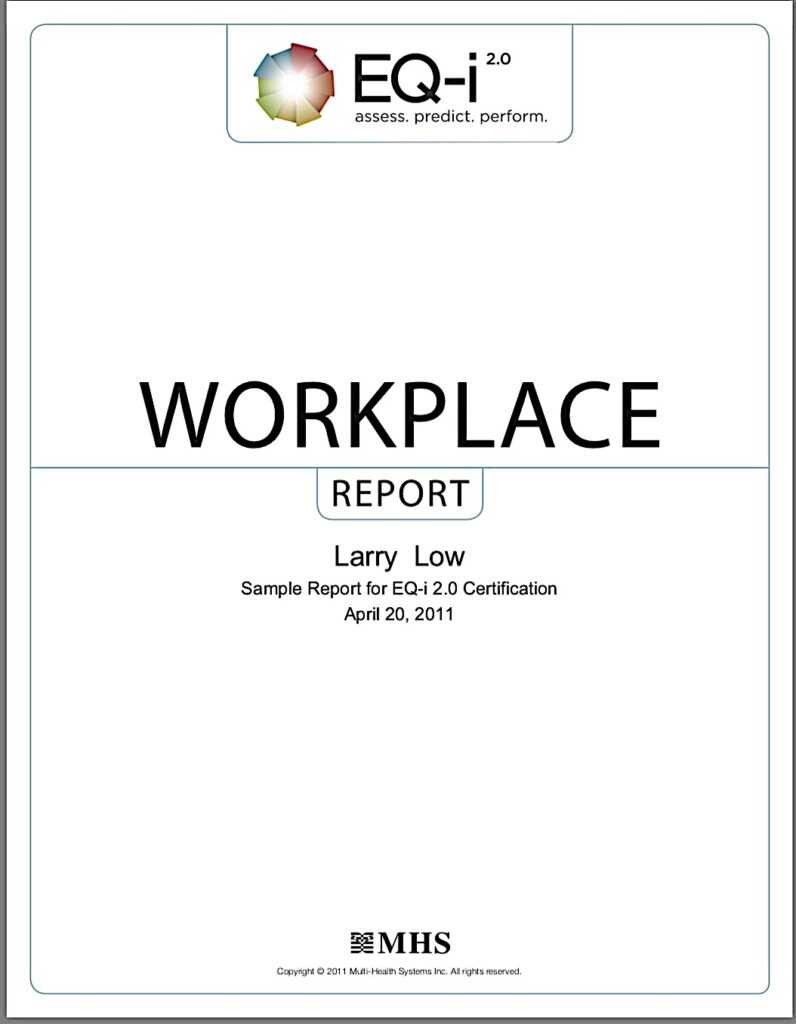
Interpreting Your Report
The assessment results you received is the Workplace Report. It offers a detailed analysis of an individual’s emotional intelligence in the workplace. It covers various aspects relevant to professional settings, providing feedback and suggestions for improvement.

As shown on page 2 of your report, the EQ-i 2.0 assessment measures emotional intelligence across five composite scales, each comprising three subscales.

Page 3 of your report shows “Overview of Your Results,” which includes “Total Score.” The “Overview of Results” serves as a quick reference point for individuals to grasp the main takeaways from their EQ-i 2.0 assessment.
It provides you with a snapshot of your overall social and emotional functioning. While this is a good start, it doesn’t tell the whole story. We can look at that overall score and see what contributed to it by going down one level, to examine the 5 composite scales. We can delve even deeper by examining the 15 subscales that make up the 5 composite scales to really understand what went into that score.
Here are main categories:
1. Total EQ Score:
• This is the overall emotional intelligence score, representing the individual’s overall level of emotional intelligence.
2. Composite Scores:
• The EQ-i 2.0 assesses emotional intelligence across various composite scores, each representing a distinct aspect of emotional intelligence. Common composites include Self-Perception, Self-Expression, Interpersonal, Decision Making, and Stress Management. The individual’s scores in these composites provide insights into specific areas of strength or improvement.
3. Subscale Scores:
• Within each composite, there are specific subscales that delve deeper into specific emotional intelligence skills. The “Overview of Results” provides a brief summary of the individual’s scores on these subscales, indicating which areas they excel in and where there might be opportunities for growth.
In the Workplace Report, scores are measured across various subscales and composites, categorized as low, mid, or high based on the individual’s performance compared to a norm group. These scores are interpreted in relation to the normative sample, representing individuals from various industries and professions who have taken the assessment. For each subscale and composite, the individual’s score is positioned within a percentile range, indicating where they fall in comparison to this norm group. A “low” score indicates that the individual’s performance in that specific area is notably below the normative sample. Conversely, a “high” score suggests that the individual’s performance surpasses a significant portion of the norm group. Meanwhile, a “mid” score places the individual within the average range compared to the norm group. This comparative analysis allows for a contextual understanding of the individual’s emotional intelligence strengths and areas for development within the broader spectrum of professionals who have undergone similar assessments.
From page 4-19 in your report, the 5 composite scales and subscale scores and description are discussed. Let’s look at each of the composite scales and their subscales:
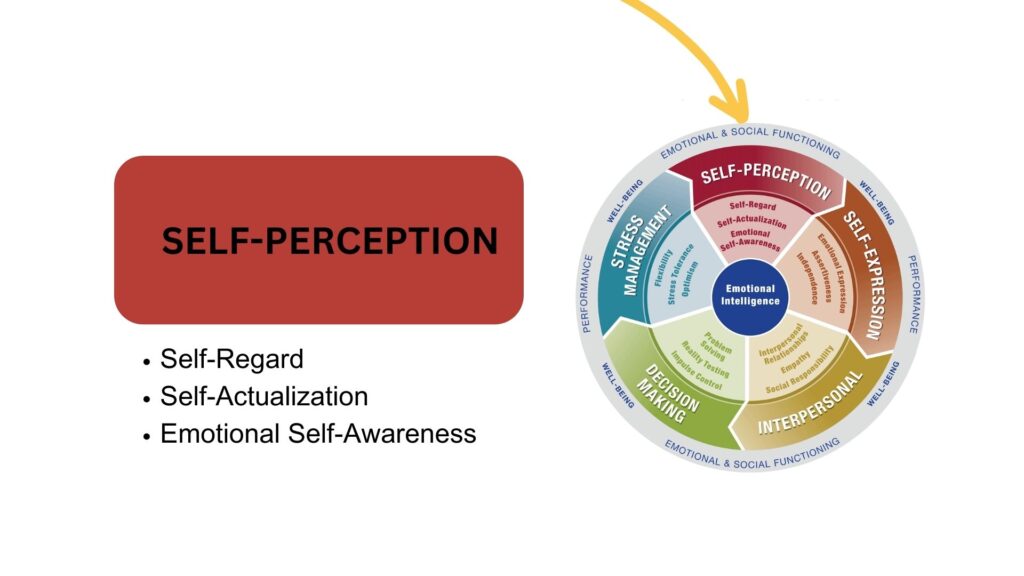
1. Self-Perception:
The first composite scale is self-perception. This is the area that examines your inner self, looking at how confident and independent you are, and to what degree you set goals and work towards them.
These are the subscales that makeup the Self-Perception composite scale, let’s examine each one individually.
There are three Subscales: Self-regard, Self-actualization, and Emotional Self-Awareness.
Subscales:
1. Self-Regard
The first subscale is self-regard. This subscale measures the extent to which an individual respect him or herself, and accepts him or herself for what he or she is. We often call this self-confidence, but it is more than just confidence; it also includes self-respect and feeling good about oneself.
Someone who scores high in self-regard may be self-assured, accepting of himself, have high self-esteem, and a good sense of self. He may be confident, have inner strength, and feel fulfilled.
Someone who scores low in this subscale may be unsure of himself, have a lack of self-respect, and low self-esteem. He may also not be confident, and is potentially in
transition.
2. Self-Actualization
Self-Actualization can be achieved by setting goals and working towards achieving these goals. We sometimes refer to a ‘life-long learner’ as someone who is actively working towards self-actualization. Someone who scores high in this subscale may have a full, rich life, participate in activities that have meaning, and feel self-satisfied.
Someone scoring high in this subscale may also feel energized; she may be passionate and enthusiastic, and motivated to do her best. She may also be spiritual and would most likely have high achievement motivation.
Someone who scores low in self-actualization may feel that her life lacks meaning; she may be unsure of where to go in life and may not be pursuing enjoyable things. She may be unmotivated, outcome oriented, or perhaps even in transition.
3. Emotional Self-Awareness
Emotional Self-Awareness is the third subscale that makes up Self-Perception. It includes both recognizing and understanding one’s emotions. *This allows a person to recognize what he is feeling and understand potentially why he feels this way and how those feelings might impact his thoughts and actions.
Someone who scores high in emotional self-awareness probably relates his own feelings to appropriate causes, understands changing emotions as well as the blends of emotions, and is self-aware and in touch with his own feelings. He probably reads people well and is read well by others. He can also differentiate between emotions well.
Someone who scores low in this subscale most likely has difficulty recognizing or identifying his own emotions, has low self-awareness, and avoids emotional ownership. He is probably surprised by others’ reactions at times and often misreads and is misread by people.
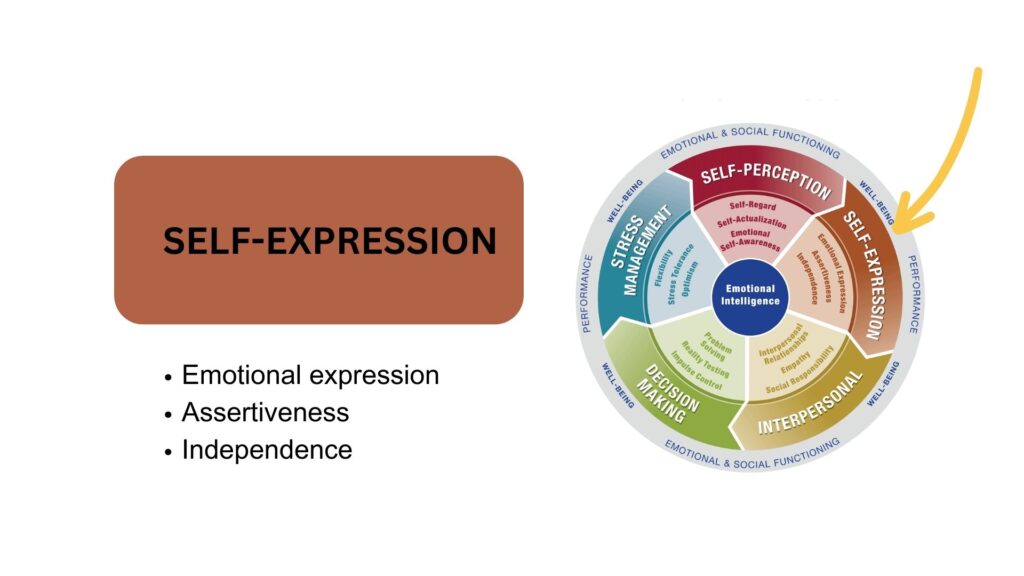
2. Self-Expression:
The second composite scale is Self-Expression. This composite scale is an extension of the self-perception composite scale because it is the expression of the feelings and emotions that have been identified in the first composite scale. It allows a person to express how she is feeling in an effective, appropriate manner.
The three subscales that make up Self-Expression are: Emotional expression, assertiveness, and independence.
Subscales:
1. Emotional Expression
Emotional expression describes a person’s effectiveness at *openly expressing his feelings and emotions, both verbally and non-verbally. It’s important to be able to let people know how you feel about something so that they are not left guessing. It is equally important to do this in an effective way, and not in a way that can damage or otherwise negatively impact a relationship.
Someone who scores high in emotional expression most likely expresses himself easily, is seen to be an open book, and very real.
Someone who scores low in this subscale may be a closed book, an enigma, and may appear withdrawn.
2. Assertiveness
Assertiveness is the ability to stand up for yourself. When you are assertive, you are expressing your thoughts, feelings, and opinions in a way that is clear and effective.
Someone who scores high in this subscale most likely expresses himself easily, defends his rights in a non-destructive manner, is not overly controlled or shy, and is non-abusive, but forthright.
Someone who scores low in assertiveness can be passive, shy, overly controlled, unable to express himself, and quick to compromise.
3. Independence
Independence is the third subscale within the Self-Perception composite scale. It describes the ability to be emotionally independent. Being independent means that you can stand on your own two feet, and do not need to rely heavily on others to make decisions for you.
Someone who scores high in Independence is self-directed, self-determined, decisive, free from emotional dependence, and confident.
Someone who scores low in this subscale may need protection or support, is uncertain of her own ideas,
and is indecisive. She lets others make final decisions and lacks confidence.
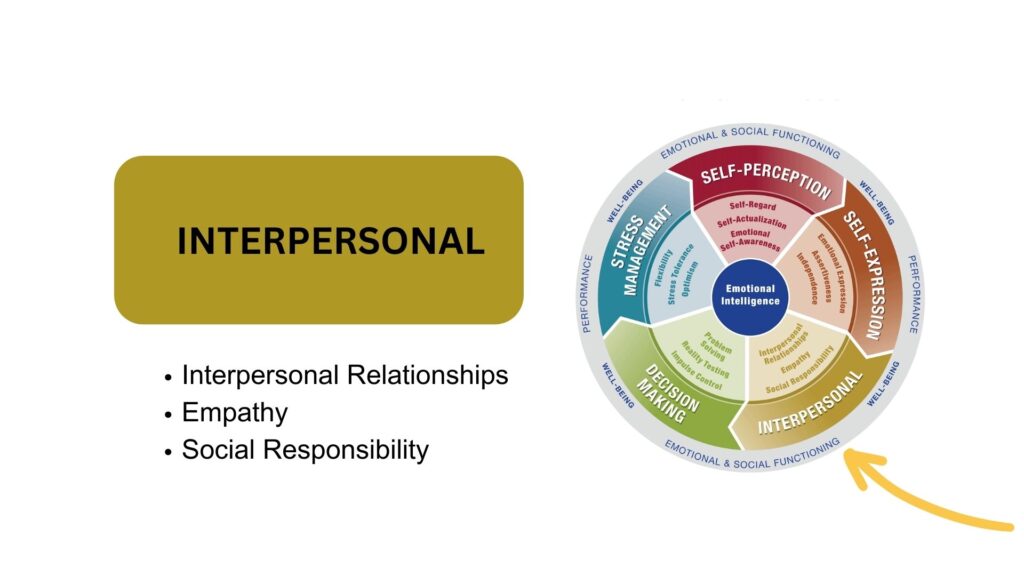
3. Interpersonal:
The first two composite scales focus on how we see ourselves and how we show ourselves to the world. The third composite scale is the Interpersonal, in other words, how we interact with others. This scale demonstrates the ability to:
• Develop and maintain relationships based on trust and compassion
• Articulate an understanding of another person’s perspective
• Act responsibly while showing concern for others, your team, or your greater community or organization.
The interpersonal composite scale is made up of: Interpersonal Relationships, Empathy, and Social Responsibility.
Subscales:
1. Interpersonal relationships
Interpersonal relationships is fairly self-explanatory. Do you have good relationships? Are you able to maintain those relationships?
Someone who scores high in this subscale is most likely able to establish mutually satisfying relationships, can give and take affection and intimacy, and maintains relationships over time. She also looks positively at social change and feels at ease in social situations.
Someone who scores low in interpersonal relationships is most likely not comfortable with intimacy, not very giving, not able to share feelings, and can be standoffish.
2. Empathy
A lot has been written about empathy so it’s probably obvious how Empathy contributes to our overall emotional intelligence. Empathy is all about how we understand those around us.
Do we recognize what others are feeling or do we expect others to feel the way we do about things? This is one of the subscales that a leader needs to be aware of in order to ensure he or she is listening to his or her direct reports and is aware of his or her impact on them.
Someone who scores high in Empathy is sensitive to the feelings of others, is able to put himself in the other person’s shoes, anticipates the reactions of others, and picks up on social cues.
Someone who scores low in Empathy may have difficulty understanding people’s feelings, have difficulty relating to others, is surprised by other people’s reactions and may not be able to share feelings.
3. Social Responsibility
Being emotionally intelligent includes contributing to society as a whole. Someone who is emotionally intelligent cares about others, and contributes to the community around him – whether that community is the city he lives in, the organization he works for, or the team he leads. In other words, he is socially responsible.
Someone who scores high in social responsibility is cooperative, gives and contributes to groups, is responsible and dependable, and feels genuine concern for others in the group.
Someone who scores low in this subscale is likely unwilling to be involved in groups or teams, hesitant to commit to group activities, and has difficulty following through on group tasks.
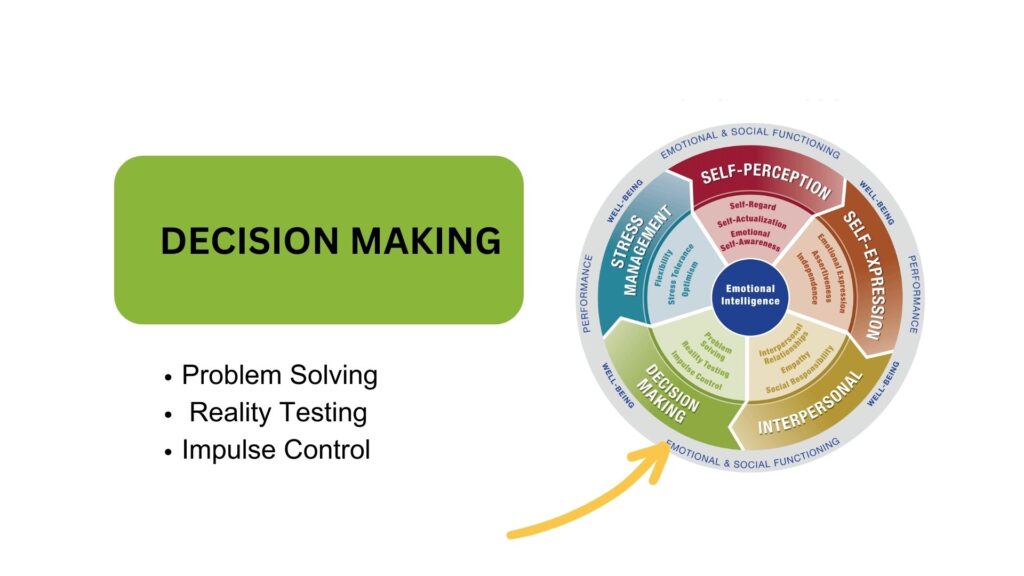
4. Decision Making:
Decision making is the fourth composite scale. This composite scale explores how we use emotional information when we are making decisions. Do we understand the impact our emotions have on our decision making? Or do we let them cloud our judgment?
Decision making is made up of the following three subscales: Problem solving, Reality Testing, and Impulse Control.
Subscales:
1. Problem-solving
Problem solving includes the ability to find solutions to problems in situations where emotions are involved and *the ability to understand how our emotions impact decision making. Does your client recognize what he’s feeling when he’s in the midst of making a critical decision? How do those feelings
impact his decision? For example, happiness and frustration have two very different effects on problem-solving. Happiness increases creativity while frustration increases analysis and breaking things down.
Someone who scores high in problem solving gathers information first, and weighs pros and cons where possible. She can identify and solve problems, and uses a systematic approach to problem solving. She can apply emotional information to help and can draw on past experiences when necessary.
Someone who scores low in this subscale jumps to solutions, flies by the seat of her pants and uses an unstructured strategy.
2. Reality Testing
Reality testing is part of the decision-making composite scale because it allows us to objectively assess information coming in that in turn impacts the decisions we make. In other words, how effective is you at seeing things objectively rather than creating stories about what is really going on?
Someone who scores high in this subscale is tuned into his environment, can assess life situations fairly accurately, is grounded and objective.
Someone who scores low in reality testing can be tuned out, unrealistic, disconnected, and easily swayed.
3. Impulse Control
Impulse control, the third subscale in the decision-making composite scale, is the ability to resist or delay an impulse. Being able to look before you leap can lead to better decisions made in the long run.
Someone who scores high in this subscale is composed, has the ability to delay or resist an impulse, has a high tolerance for frustration and is patient.
Someone who scores low in this subscale can be explosive, unpredictable, easily frustrated, aggressive and reactive.
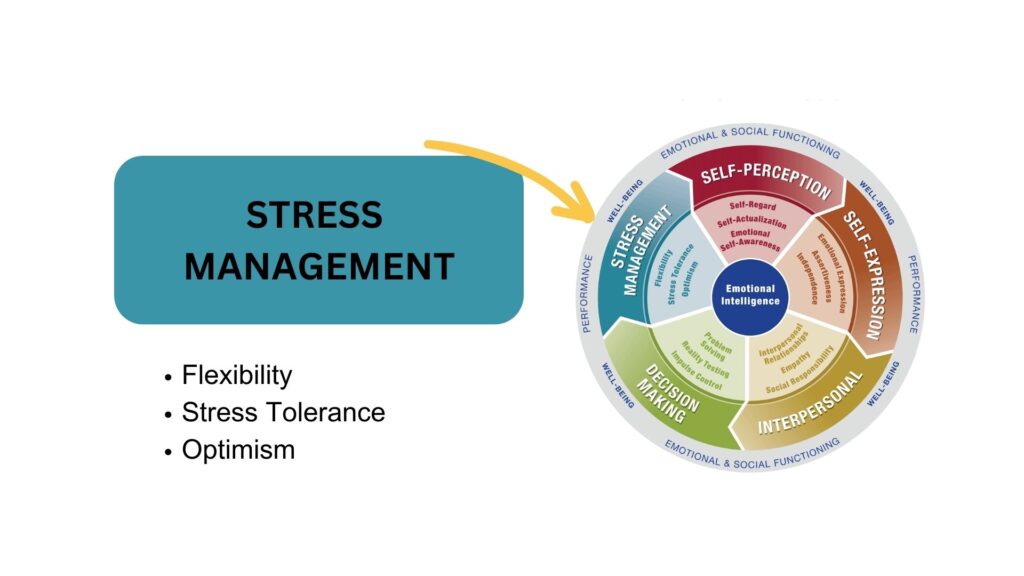
5. Stress Management:
The final composite scale is Stress Management. This area looks at how well we cope with the emotions associated with change, and unfamiliar and unpredictable circumstances, while remaining hopeful about the future and resilient in the face of setbacks and obstacles.
The three subscales that make up the stress management composite scale are: Flexibility, Stress tolerance, and Optimism.
Subscales:
1. Flexibility
Flexibility is all about change –adapting your emotions, thoughts and behaviors to unfamiliar, unpredictable and dynamic circumstances or ideas. There are many ways to deal with change and work through a change process, but being able to be flexible when things change involves the ability to deal with the emotions you are feeling when faced with changing circumstances.
Someone who scores high in flexibility is able to adapt to changing conditions, is open to new views and changes of behavior, and goes with the flow.
Someone who scores low in this subscale can be rigid, hard to change, stuck in patterns, and follows the status quo.
2. Stress Tolerance
Stress tolerance is coping with stressful or difficult situations and believing that one can manage or influence situations in a positive manner. Many people have focused on building their stress tolerance by employing stress relief techniques such as taking reflection, listening to music, and exercise in general.
Someone who scores high in stress tolerance has effective coping mechanisms, can keep calm and maintain control, is optimistic towards change, is stable and relaxed and maintains influence.
Someone who scores low in stress tolerance most likely lacks or has ineffective coping mechanisms, is reactive, fearful and has high anxiety levels.
3. Optimism
Optimism is the final area represented in the stress management composite scale. It is about having a positive attitude about the future. Traditionally used in the ‘glass half full’ analogy, optimism means that even when faced with a challenge, an individual look at the positive aspects and is hopeful about the outcome.
Someone who scores high in optimism has a positive attitude in the face of adversity, has a hopeful approach to life, is confident about the future and sees possibilities.
Someone who scores low in this subscale fears the worst will happen, is pessimistic, uncertain about the future and has difficulty seeing the good in things.
image too detailed
Well Being Indicator
We’ve now gone through the 15 subscales that contribute to your total EQ-i 2.0 score. This final scale, while not contributing to the Total EI score as a whole, does generate a score for you and does contribute to your overall wellbeing.
The “Wellbeing Indicator” is a valuable component of the EQ-i 2.0 assessment, providing a holistic view of an individual’s emotional health and social functioning. It serves as a starting point for discussions about personal development, stress management, and creating a balanced and fulfilling emotional life. Happiness is a general satisfaction about life, being content and enjoying life.
There are four subscales that are most often associated with happiness. They are:
Self-regard, Optimism, Interpersonal relationships, and Self-actualization.
If you want to increase your happiness, she can do this most effectively by working to develop one or more of these subscales. For example, you score in the lower range on happiness and have also scored lower on self-regard. If you develop your self-regard, you will increase your self-confidence, self-esteem, and feel good about yourself. This, in turn, will increase your optimism and other subscales that contribute to the well-being indicator.
Summary of Model:
Total EQ is at the core
• Subscales roll up into composite scales
• Composite scales roll up into overall wellbeing (which includes happiness)
• These all impact Performance and Emotional and Social Functioning
Interconnectedness of the Model:
The model is designed as a building block. Each category feeds into the next. The composite scales also work in tandem. Similarly, the subscales build upon each other to produce an aggregate score. They also work in balance across the scales. What you end up with at the center of the model is your EI “total score”
It’s also important to remember that the composite scales are all interconnected – self-perception leads to self-expression, which enhances our interpersonal relationships, which impact our decision making, which help us manage our stress.
Subscale Interaction: An Example
Let’s consider an example of how the subscales in the EQ-i 2.0 assessment results might interact. In this scenario, we’ll explore the relationship between two subscales: Emotional Self-Awareness and Empathy.
Example: John’s EQ-i 2.0 Assessment Results
1. Emotional Self-Awareness:
John scores high in Emotional Self-Awareness. This means he has a strong ability to recognize, understand, and accurately identify his own emotions. He is in touch with his feelings and can articulate them well.
2. Empathy:
However, in the Empathy subscale, John scores lower than in Emotional Self-Awareness. While he is proficient in understanding his own emotions, he faces challenges in fully grasping and resonating with the emotions of others. This might manifest as difficulty in perspective-taking or fully comprehending the feelings of those around him.
Interaction:
The interaction between these two subscales can be crucial. John’s high Emotional Self-Awareness allows him to navigate his own emotional landscape effectively. However, his lower Empathy score suggests that he might need to work on extending this awareness to others, ensuring that he considers and understands their emotions in various situations.
Possible Impact:
In a workplace setting, John’s colleagues might perceive him as emotionally intelligent when it comes to self-awareness, appreciating his ability to express and manage his own feelings. However, they might also hope for more empathy from him in team interactions, seeking a deeper understanding of their perspectives and emotions.
This example illustrates how the interaction between subscales provides nuanced insights into an individual’s EQ results. In your report, there will be a segment that suggest “Balancing your EI.”
Closing Thoughts:
It is important to note that we will not be covering every single aspect of your report today. The goal is for you to understand how to interpret your results, and to be able to identify what stands out for you today. As we progress through the workshops, more pieces of the puzzle will emerge.

Exercise: Reflecting on Results
1. Objective: To encourage participants to reflect on their EQ-i 2.0 results, identifying confirmations and new insights, and share these reflections with a partner.
2. Instructions:
• Ask participants to pair up with someone in the group.
• Allocate 5 minutes for the exercise.
• Instruct each participant to take turns sharing with their partner:
– Confirmation: One aspect of their EQ-i 2.0 results that confirmed or resonated with their self-perception. This could be a strength they were aware of or a recognized challenge.
– New Information: One element that provided new insights or surprised them in the assessment results. This could be a competency they hadn’t considered or a pattern they hadn’t noticed.
• Encourage active listening during the sharing process.
• Suggest that participants consider how these insights might influence their personal or professional development moving forward.
• After 5 minutes, bring the full group back together.
• Optionally, invite a few volunteers to share brief summaries of what they discussed in their pairs.
• Open the floor for any reflections or observations from the group about the exercise.

Course Manual 9: Synthesizing Models
The Assessment of your EQ, is not an end in itself. It’s a means to an end. The EQ-i 2.0 assessment gives you information about your EQ competencies so you can best decide your next steps to becoming a more effective leader, and a stronger team player.
The goal of this workshop is for you to get clear on your strengths and areas of development, which will be reflected in your developmental plan.
We will discuss – what competency means, why competency matters in the arena of emotional and social intelligences, and how competencies from the two models we have discussed are complimentary.

Definition of Competency
A competency is a specific set of knowledge, skills, abilities, and behaviors that an individual possesses and can effectively demonstrate in a given context or role. Competencies are often used to assess and measure an individual’s suitability for a particular job or task. They go beyond mere qualifications or educational background and encompass a more comprehensive understanding of an individual’s capabilities.
Competencies can be classified into various categories, such as technical competencies (related to specific tasks or functions), behavioral competencies (related to interpersonal and communication skills), and leadership competencies (related to leading and managing others). Organizations often define a set of core competencies that align with their values, mission, and goals, serving as a basis for hiring, performance evaluation, and professional development.
In the context of emotional intelligence, competencies may include skills related to self-awareness, self-regulation, interpersonal relationships, empathy, and other emotional and social skills that contribute to effective personal and professional functioning.
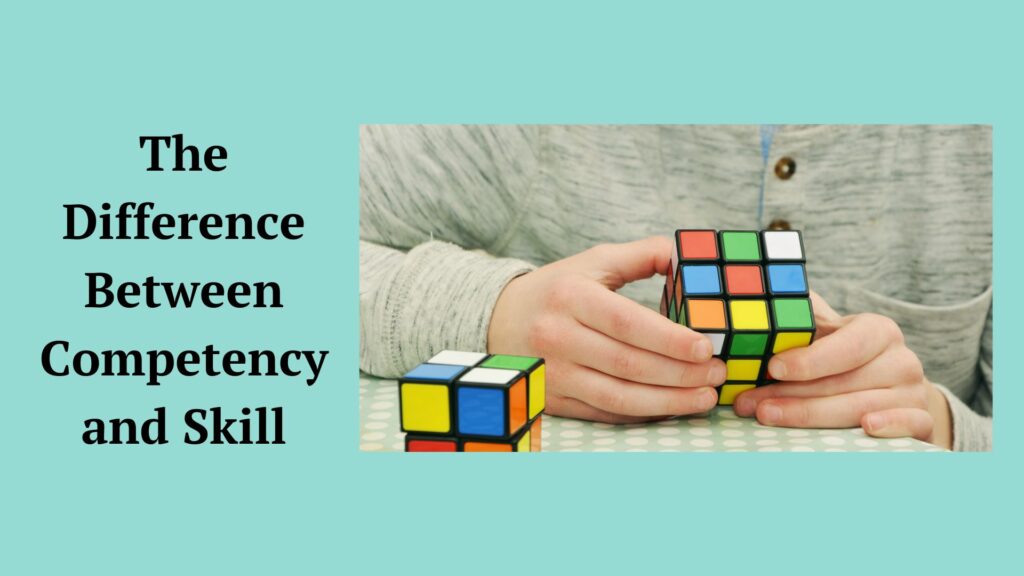
The Difference Between a Competency and Skill
Competency and skill are related concepts, but they have distinct meanings:
1. Competency:
• Definition: A competency is a broader concept that encompasses a combination of knowledge, skills, abilities, and behaviors that an individual possesses. It involves a more comprehensive evaluation of an individual’s overall capability to perform effectively in a particular role or context.
• Components: Competencies may include technical skills, interpersonal skills, cognitive abilities, and other attributes relevant to a specific job or function.
• Application: Competencies are often used in talent management, performance assessment, and hiring processes to gauge an individual’s suitability for a role based on a holistic set of criteria.
2. Skill:
• Definition: A skill is a specific, learned ability to perform a task or function. It is a practical and applied aspect of knowledge, often acquired through training, practice, or experience.
• Components: Skills can be categorized into various types, such as technical skills (e.g., computer programming, data analysis), soft skills (e.g., communication, teamwork), and specialized skills relevant to a particular profession or industry.
• Application: Skills are more focused and task-oriented. They are commonly listed in resumes to highlight an individual’s capabilities in specific areas and are crucial for successful job performance.
In essence, a competency is a broader, multidimensional concept that includes various skills, knowledge, and attributes, while a skill is a specific, narrow ability that can be mastered for a particular task or function. Competencies provide a more comprehensive view of an individual’s overall capacity, including how they apply their skills in different situations and contexts.
Here’s an example that illustrates the different between a competency and a skill.
EQ Competency – Empathy:
Empathy is a key EQ competency that involves understanding and sharing the feelings of others. In a conflict resolution scenario, an individual with a high level of empathy would be able to perceive the emotions of team members, comprehend their perspectives, and demonstrate genuine concern for their feelings.
• Example: During a team meeting, two colleagues have a disagreement about project priorities. An individual with a high level of empathy would actively listen to both parties, acknowledge their emotions, and work towards a resolution that considers the feelings and concerns of each team member.
Skill – Active Listening:
Active listening is a specific skill that contributes to effective communication. It involves fully concentrating, understanding, responding, and remembering what is being said. It is a practical ability that can be honed through training and practice.
• Example: In the same conflict resolution scenario, a team member skilled in active listening might use techniques like paraphrasing, summarizing, and asking clarifying questions. They would focus on understanding the specific points of contention and ensuring that each team member feels heard and validated.
In this example, empathy is an EQ competency that reflects a deeper understanding of emotions and the ability to navigate interpersonal dynamics. On the other hand, active listening is a specific skill employed in the process, contributing to effective communication and conflict resolution. While empathy is more inherent and related to emotional understanding, active listening is a practical skill that can be learned and applied in various contexts. Both are valuable in fostering a positive and collaborative work environment.
The case study below also shows that knowledge is not enough, competencies matter.

Case Study: A Comprehensive Study on the Impact of Competencies in MBA Programs and Professional Development
The study conducted by Specht and Sandlin in 1991 assessed the retention of learning in a top 20 ranked MBA program in the US.
The findings revealed that the half-life of knowledge acquired in their first required course in accounting was 6 ½ weeks.
After this period, students were only able to produce half of what they had earlier demonstrated on the same final exam.
Value-Added Outcomes for MBA Graduates:
• Boyatzis et al. (2002) conducted a study comparing the value-added outcomes of graduates from full- and part-time MBA programs over 1–2 years.
• The focus was on assessing graduates at graduation versus when they entered the program.
• The study specifically looked at behavioral evidence of learning emotional, social, and cognitive competencies crucial for effectiveness in management and professional roles.
• The average impact of the MBA programs was a 4% improvement in these competencies over the 1–2 year period.
Competency Outcome Studies for Undergraduates:
• Earlier competency outcome studies involving thousands of graduates from 4-year undergraduate programs in the US were also referenced (Astin, 1993; Winter et al., 1982).
• These studies included measures of various forms of cognitive reasoning, emotional intelligence, and social competencies, all essential for effectiveness in most jobs.
• The median number of competencies on which there was significant value added over the 4-year undergraduate period was reported to be just 1.
In summary, these findings emphasize the challenge of knowledge retention over time and highlight the significance of emotional, social, and cognitive competencies in management and professional roles.
The studies suggest that competency development is an ongoing process and that educational programs play a role in enhancing these competencies, contributing to graduates’ effectiveness in the workplace.

What is ESI?
In order to synthesize the competencies from the Goleman’s model and the EQ-i 2.0 model, let’s gain an understanding of what ESI Competencies mean.
“ESI” stands for Emotional and Social Intelligence Indicator. In the context of competencies, ESI competencies refer to the skills and abilities related to understanding and managing emotions (Emotional Intelligence) and navigating social interactions effectively (Social Intelligence).
These competencies are crucial for success in various personal and professional situations.
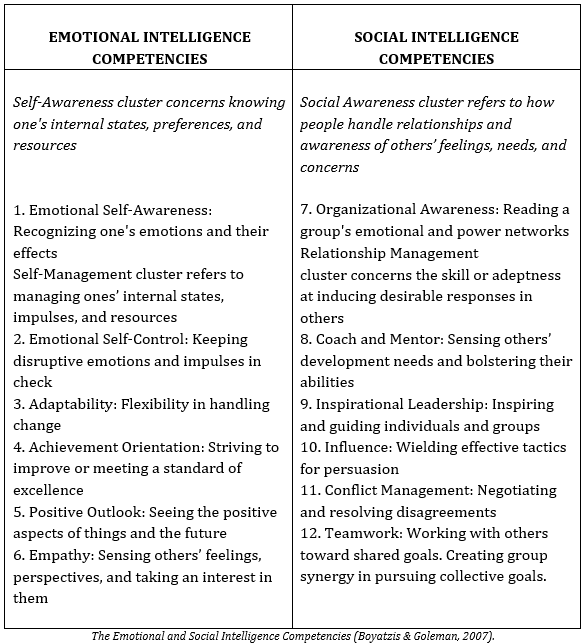
This Table lists the ESI competencies that have been validated against performance in a wide variety of jobs and roles and compiled into several empirical (Boyatzis, 1982, 2018) and other conceptual generic models (Goleman, 1998; Spencer & Spencer, 1993).
These competencies collectively contribute to an individual’s ability to navigate the complexities of human interactions, build strong relationships, and respond appropriately to emotional and social cues. Developing ESI competencies can enhance leadership skills, improve teamwork, and contribute to overall success in personal and professional life.
Comparing Goleman and Bar-On’s Competencies with ESI Competencies:
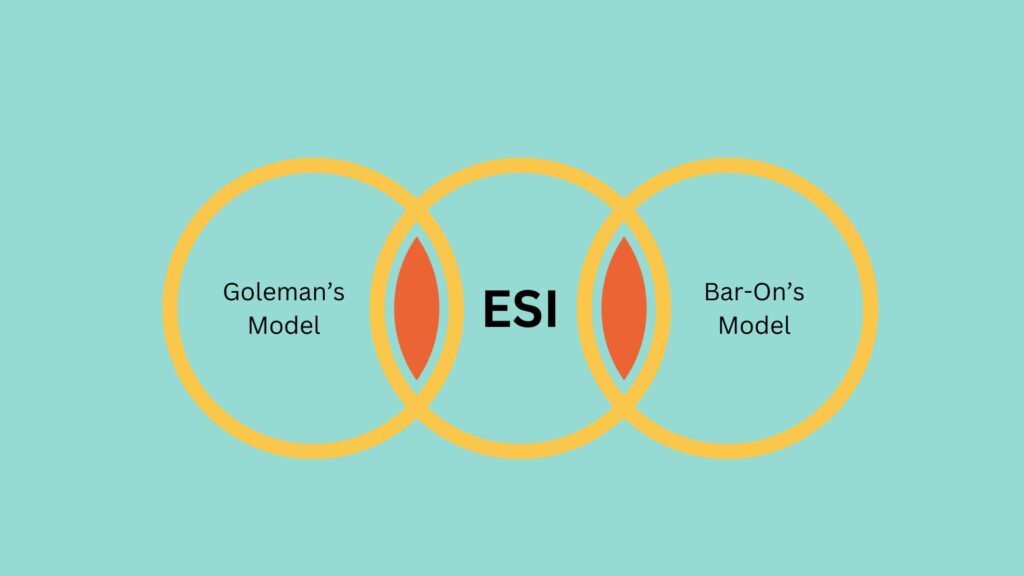
Goleman’s Competencies:
Daniel Goleman’s model of Emotional Intelligence (EI) is a widely recognized framework that aligns closely with the broader concept of Emotional and Social Intelligence (ESI). Goleman’s model consists of five key components, often referred to as “domains,” which can be incorporated into the ESI competencies. Here’s how Goleman’s model aligns with ESI competencies:
1. Self-Awareness (Goleman’s Self-Awareness Component):
o Incorporation into ESI Competencies: Aligned with ESI’s focus on self-awareness, Goleman’s Self-Awareness domain emphasizes recognizing and understanding one’s own emotions. This aligns with the ESI competency of self-awareness, which is fundamental to emotional intelligence.
2. Self-Regulation (Goleman’s Self-Management Component):
o Incorporation into ESI Competencies: Goleman’s Self-Regulation domain involves managing and controlling one’s emotions. This closely aligns with the ESI competency of self-regulation, which is crucial for navigating social situations effectively.
3. Motivation (Goleman’s Motivation Component):
o Incorporation into ESI Competencies: Goleman’s Motivation domain focuses on using emotions to drive positive behavior and achieve goals. This corresponds to the ESI competency of motivation, which involves harnessing emotions for productive outcomes.
4. Empathy (Goleman’s Empathy Component):
o Incorporation into ESI Competencies: Goleman’s Empathy domain emphasizes understanding and sharing the feelings of others. This aligns directly with the ESI competency of empathy, which is critical for building positive relationships.
5. Social Skills (Goleman’s Social Skills Component):
o Incorporation into ESI Competencies: Goleman’s Social Skills domain involves building and maintaining positive relationships, effective communication, and conflict resolution. These aspects closely align with the ESI competency of social skills, which encompasses various interpersonal abilities.
The EQ-i 2.0 (Bar-On’s) Competencies:
The EQ-i 2.0 model is a specific model of Emotional Intelligence (EI) that provides a framework for assessing and developing emotional and social competencies. The EQ-i 2.0 model incorporates various dimensions that align with ESI (Emotional and Social Intelligence) competencies. Here’s how the EQ-i 2.0 model is structured and how it relates to ESI competencies:
1. Self-Perception:
o EQ-i 2.0 Scale: This corresponds to aspects of self-awareness, including self-regard and emotional self-awareness.
o ESI Competency: Aligns with the ESI competency of Self-Awareness.
2. Self-Expression:
o EQ-i 2.0 Scale: Involves assertiveness, independence, and interpersonal relationships.
o ESI Competency: Relates to aspects of social skills and social expressiveness.
3. Interpersonal:
o EQ-i 2.0 Scale: Encompasses interpersonal relationships, empathy, and social responsibility.
o ESI Competency: Directly relates to Social Awareness and Social Facility in the ESI framework.
4. Decision Making:
o EQ-i 2.0 Scale: Involves problem-solving, reality testing, and impulse control.
o ESI Competency: Overlaps with decision-making aspects in the ESI framework, including impulse control.
5. Stress Management:
o EQ-i 2.0 Scale: Addresses stress tolerance and flexibility.
o ESI Competency: Relates to managing emotions under stress and adapting to changing situations in the ESI framework.
6. Intrapersonal:
o EQ-i 2.0 Scale: Encompasses self-regard, emotional self-awareness, and assertiveness.
o ESI Competency: Aligns with various aspects of self-awareness and self-expression.
To summarize, the Goleman’s and Bar-On’s models are different, and complementary.
The Goleman’s model provides a more detailed breakdown of the components that contribute to Emotional Intelligence, and these components seamlessly align with the broader ESI competencies. By incorporating Goleman’s model into the ESI framework, individuals and organizations can gain a comprehensive understanding of the specific skills and behaviors that contribute to emotional and social intelligence.
The EQ-i 2.0 model essentially provides a comprehensive assessment of an individual’s emotional and social intelligence, covering dimensions that closely align with ESI competencies. By evaluating these dimensions, individuals and organizations can gain insights into strengths and areas for development, leading to targeted strategies for enhancing emotional and social competencies. This integration supports the broader goal of improving interpersonal relationships, communication, and overall effectiveness in personal and professional contexts.
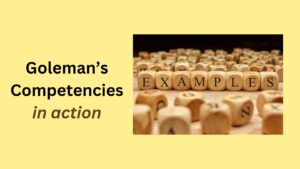
The Goleman’s Competencies can be exemplified in the following breakdown. As you go through the list, reflect on your tendencies and capacities in each category.
Self-Awareness
A self-aware leader possesses a deep understanding of their emotions, strengths, and weaknesses. This awareness enables them to make informed decisions and foster positive relationships within their team.
• Understand who they are as a leader
• Strong values
• Long-term goals
• Good at creating change
• Seeks assessment
• Ability to see yourself through others’ eyes
• Honesty, openness, and confidence
• Independent, positive, and can change a bad mood
• Knowing your motivations and values
• Accepting yourself
• What about that situation made you upset?
• Why do you do the things you do?
• What are your values? Are you living by them?
• Detaching and analyze your actions
Self-Management
A self-managing person controls his/her emotions, exhibits emotions appropriate for the setting, bounces back from adversity, is non- judgmental, and does not act without thinking through the consequences.
• The key to a work-life balance. Do You Have a Healthy Work/Life Balance?
• Resiliency
• Sacrificing now for long- term gain
• Not letting mood dictate action
• Emotional stability that creates trust
• Being active, not reactive
• Making yourself accountable to others
• Taking a moment – or longer – before responding
• Monitor what you say to yourself. Would you let someone else speak to you like that?
Empathy
Empathy is the ability to read, understand, and experience another’s emotional state and respond in a socially appropriate way.
• Organizational awareness
• Higher empathy equals better perception of leadership
• Taking a person’s emotional state into consideration when making a decision
• Understanding other perspectives
• First priority is to understand the other person
• Being present; focusing only on what the other person is saying
• Always being in the moment
• Observing people
• Developing a better understanding of your own emotions
• Greeting people by name
Relationship Management
Leadership is relationships – initiating, building, and maintaining relationships
• Relationship Management is tightly coupled with empathy.
• Clear and consistent communication
• Conflict management
• Trust
• Being open and curious
• Transparency
• Understanding your communication style
• Being consistent in your message
• Giving praise when appropriate
• Having tough conversations when they are needed
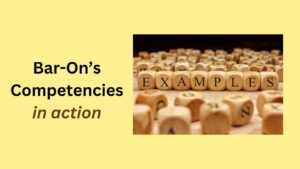
This list of behaviors and actions exemplify the 15 EQ-i 2.0 competencies in a leader:
1. Self-Perception:
• Demonstrates self-confidence without arrogance.
• Acknowledges strengths and weaknesses openly.
• Maintains a positive self-regard even in challenging situations.
2. Self-Regard:
• Values and appreciates personal achievements.
• Handles criticism constructively without undermining self-worth.
• Maintains a balanced view of one’s abilities.
3. Emotional Self-Awareness:
• Recognizes and labels own emotions accurately.
• Understands how emotions influence thoughts and actions.
• Is mindful of emotional responses in various situations.
4. Emotional Expression:
• Expresses emotions appropriately and effectively.
• Is comfortable discussing feelings with team members.
• Creates an open and emotionally expressive work environment.
5. Assertiveness:
• Clearly communicates expectations and boundaries.
• Speaks up respectfully for oneself and the team.
• Encourages open and honest communication.
6. Independence:
• Demonstrates self-reliance and autonomy.
• Makes decisions confidently without excessive reliance on others.
• Maintains personal integrity in decision-making.
7. Interpersonal Relationships:
• Builds and nurtures positive relationships with team members.
• Listens actively to understand others’ perspectives.
• Resolves conflicts diplomatically and collaboratively.
8. Empathy:
• Understands and validates the feelings of others.
• Demonstrates sensitivity to others’ needs and concerns.
• Acts with compassion and consideration.
9. Social Responsibility:
• Acts ethically and responsibly in all interactions.
• Engages in community or social initiatives.
• Demonstrates a commitment to social justice.
10. Problem Solving:
• Analyzes challenges objectively and rationally.
• Generates creative solutions to complex issues.
• Seeks input from team members in decision-making.
11. Reality Testing:
• Evaluates situations objectively, avoiding undue optimism or pessimism.
• Accepts constructive feedback without defensiveness.
• Adapts plans based on realistic assessments.
12. Impulse Control:
• Maintains composure under pressure.
• Thinks before reacting, avoiding impulsive decisions.
• Controls emotional reactions in stressful situations.
13. Flexibility:
• Adapts to changes in plans or priorities with ease.
• Embraces new ideas and approaches.
• Encourages a culture of innovation and adaptability.
14. Stress Tolerance:
• Manages stress effectively without it affecting performance.
• Implements stress-reduction techniques.
• Supports team members in coping with stress.
15. Optimism:
• Maintains a positive outlook even in challenging times.
• Encourages a hopeful and optimistic atmosphere within the team.
• Focuses on solutions rather than dwelling on problems.
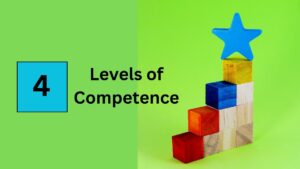
Four Levels of Competence
The concept of competency levels, often depicted as a competence or learning matrix, outlines the progression individuals go through as they acquire and develop a skill. These levels are commonly described as the Four Stages of Competence: Unconscious Incompetence, Conscious Incompetence, Conscious Competence, and Unconscious Competence.
1. Unconscious Incompetence: At the initial stage, individuals lack awareness of their incompetence in a particular skill or domain. They are, in essence, “unconsciously incompetent.” They neither understand nor recognize the skill, and therefore, they don’t see a need for its acquisition. This phase is marked by a lack of knowledge and insight, creating a blind spot in the individual’s understanding.
Example: Consider someone who has never played a musical instrument and is unaware of the complexities involved. They may not recognize the need to learn or understand the skill of playing music.
2. Conscious Incompetence: As individuals progress to this stage, they become aware of their lack of competence in a specific skill. Now, they are “consciously incompetent.” They recognize the existence of the skill and the gaps in their knowledge or ability. This awareness often arises from exposure, education, or the realization that others possess the skill.
Example: Following the musical instrument analogy, a person at this stage might start taking beginner music lessons. They become aware of the complexity of playing an instrument but recognize their lack of proficiency.
3. Conscious Competence: In the third stage, individuals consciously develop and practice the skill. They move from incompetence to competence through deliberate effort and concentration. This phase is labeled “consciously competent.” Competence is achieved, but it requires active thought, focus, and practice. Individuals must consciously apply their knowledge and skills to perform the task.
Example: Continuing with music, a person in this stage might play a song on the instrument but needs to concentrate on each note, the rhythm, and the technique consciously.
4. Unconscious Competence: The final stage represents the pinnacle of skill development. Individuals reach a point where they can execute the skill effortlessly, without conscious thought. This level is termed “unconsciously competent.” Competence becomes second nature, requiring minimal cognitive effort. The skill is ingrained in the individual’s behavior.
Example: In the music analogy, someone at this stage can play a complex piece effortlessly, without actively thinking about finger placement or note reading.
The Learning Process: The journey through these stages is a dynamic process, and individuals may revisit different stages as they encounter new challenges or refine existing skills. For instance, learning a new, more intricate piece on the instrument may temporarily bring someone back to the conscious competence stage before achieving unconscious competence.
Factors Influencing Progression: Progression through these stages is influenced by factors such as motivation, practice, feedback, and the complexity of the skill. Motivated individuals who consistently practice and receive constructive feedback are more likely to advance through the stages efficiently.
Implications for Learning and Development: Understanding these competency levels is crucial for leadership development. It provides a framework for setting realistic expectations, designing effective developmental plans, and gauging progress. Recognizing the stages also fosters a growth mindset, encouraging individuals to persevere through the challenges of conscious incompetence to reach mastery.
Application in EQ Leader Program: This framework is often applied to skill development. Individuals may start in the unconscious incompetence stage when introduced to a new process or leadership skill. Through training and experience, they progress to conscious incompetence, consciously working on acquiring the necessary knowledge and abilities. With continued practice and application, they move into the conscious competence stage, ultimately reaching the desired state of unconscious competence in their professional roles.
Recognizing where individuals stand in their competency levels enables effective learning and development strategies, leading to enhanced skills and performance. It’s a roadmap that will complement your assessment results.

Exercise Title: Journey to Competence Reflection
o Ask participants to review their emotional intelligence assessment results.
o Instruct them to identify one specific competency or subscale where they feel they are:
– Unconsciously Incompetent (lack awareness)
– Consciously Incompetent (aware of the need for improvement)
– Consciously Competent (making conscious efforts to improve)
– Unconsciously Competent (naturally skilled without much conscious thought)
o Pair up participants and ask them to share their chosen competency and the stage they believe they are in.
o Encourage open discussion about challenges, realizations, and strategies for growth.
o Invite a few participants to share their reflections with the larger group.
o Encourage insights into how their emotional intelligence journey aligns with the Four Stages of Competence.
o Conclude by emphasizing that the journey to emotional intelligence mastery is ongoing and dynamic.
o Encourage participants to embrace their current stage, set realistic goals for improvement, and celebrate their progress.
• Copies of participants’ emotional intelligence assessment results.
• Foster a supportive environment where participants feel comfortable sharing their reflections.
• Remind participants that growth happens at their own pace, and each stage is a valuable part of the learning journey.

Course Manual 10: Developmental Plan
PART 1 – SETTING YOU UP FOR SUCCESS
In the context of the EQ Leader program, a developmental plan is a structured and personalized strategy designed to enhance your emotional intelligence skills and competencies. It serves as a roadmap for your personal and professional growth, leveraging the insights gained from your EQ-i 2.0assessment, and subsequent workshops.
The goal of a developmental plan is to help you systematically improve your emotional intelligence, leading to enhanced self-awareness, interpersonal relationships, and overall effectiveness in various aspects of your professional and personal life.

Creating a developmental plan is crucial for these reasons:
1. Personalized Growth: An individual’s emotional intelligence profile is unique. Developing a plan allows participants to tailor their growth journey based on their specific strengths and areas for improvement identified in the assessment.
2. Targeted Improvement: The EQ-i 2.0 assessment provides detailed insights into specific competencies and subscales. A developmental plan helps individuals focus on targeted areas, ensuring efficient use of time and resources for improvement.
3. Concrete Goals: A plan provides a roadmap with clear, actionable goals. It transforms abstract concepts from the workshop into tangible objectives, making the development process more structured and manageable.
4. Long-Term Sustainability: The creation of a developmental plan fosters a mindset of continuous improvement. Participants are more likely to sustain their efforts over the long term, integrating emotional intelligence development into their daily lives and professional roles.
5. Measurable Progress: A well-constructed plan includes measurable benchmarks for progress. This allows individuals to track their development, celebrate achievements, and stay motivated throughout the process.
6. Enhanced Self-Awareness: Developing a plan requires participants to delve deeper into their self-awareness. It prompts reflection on personal values, aspirations, and potential barriers, fostering a deeper understanding of oneself.
7. Application in the Real-Workplace: A plan encourages participants to consider how they can apply their newfound emotional intelligence skills in real-world scenarios. This practical approach enhances the transfer of learning from the workshop to everyday life and work situations.
8. Customized Strategies: Individuals can identify and implement strategies that align with their learning preferences and lifestyles. This customization increases the likelihood of successful integration and application of emotional intelligence skills.
9. Adaptation to Changing Circumstances: Developmental plans are adaptable. As individuals encounter new challenges or opportunities, they can revise their plans to address evolving needs and circumstances, ensuring relevance and effectiveness.
10. Enhanced Leadership Effectiveness: For those in leadership roles, a targeted developmental plan can significantly enhance leadership effectiveness. Leaders can focus on competencies directly related to leadership success, such as influencing others, conflict resolution, and inspirational leadership.
11. Improved Relationships: Emotional intelligence is closely linked to interpersonal skills. A development plan aimed at enhancing relationship management competencies can lead to improved communication, collaboration, and overall relationship dynamics.
12. Positive Organizational Impact: When individuals within an organization commit to their emotional intelligence development, it contributes to a positive organizational culture. Improved communication, empathy, and teamwork can positively influence the overall work environment.
13. Professional Growth: Emotional intelligence is a key factor in career success. A developmental plan not only benefits individuals in their current roles but also positions them for continued professional growth and advancement.

Recap:
At the beginning of the debrief, you took time to reflect broadly on the goal you want to achieve in these three areas:
1. Personal Growth
2. Professional Development
3. Relationships
We also looked at some examples of developmental goals that could serve as a springboard.
Now that you have processed your assessment results, you are able to look at aspects of your emotional intelligence in a more granular and personalized way. A developmental plan is a dynamic and individualized strategy that will empower you to take intentional steps toward enhancing your emotional intelligence.
In order for you to design an effective developmental plan, there are key components that will ensure success.

Key components of a developmental plan:
1. Identification of Strengths and Areas for Improvement: Based on the EQ assessment results, participants identify their emotional intelligence strengths and areas where improvement is needed. This forms the foundation for the development plan.
2. Set Clear and Specific Goals: The plan includes clear and specific goals related to targeted emotional intelligence competencies. These goals should be achievable, measurable, and aligned with the individual’s aspirations and the demands of their professional and personal life.
3. Actionable Strategies: Participants outline actionable strategies and activities to achieve their goals. These strategies may include specific exercises, reflective practices, and practical steps to integrate emotional intelligence into daily routines.
4. Timeline and Milestones: A developmental plan establishes a timeline for achieving goals and includes milestones to track progress. This temporal framework provides a structured approach to development, helping individuals stay accountable.
5. Reflection and Feedback Mechanisms: Regular reflection is incorporated into the plan, allowing individuals to assess their progress, adjust strategies if necessary, and celebrate successes. Seeking feedback from colleagues or mentors can provide valuable external perspectives.
6. Integration into Daily Practices: The plan emphasizes the integration of emotional intelligence into daily life. This could involve incorporating new habits, applying learned skills in real-world scenarios, and actively practicing emotional intelligence in both personal and professional interactions.
7. Adaptability: Recognizing that personal and professional circumstances evolve, a developmental plan should be adaptable. Individuals may need to adjust their strategies and goals to align with changing priorities or challenges.
8. Resources and Support: The plan identifies resources, tools, and support systems that can aid in the development process. This might include additional learning materials, mentorship, or participation in follow-up workshops or coaching sessions.
9. Accountability: A developmental plan establishes mechanisms for accountability, whether through self-monitoring, peer support, or mentorship. Holding oneself accountable to the plan enhances commitment and motivation.
10. Celebration of Achievements: Recognizing and celebrating achievements, no matter how small, is a crucial part of the plan. Positive reinforcement reinforces the value of emotional intelligence development and encourages sustained effort.
What Makes Goals Fail?
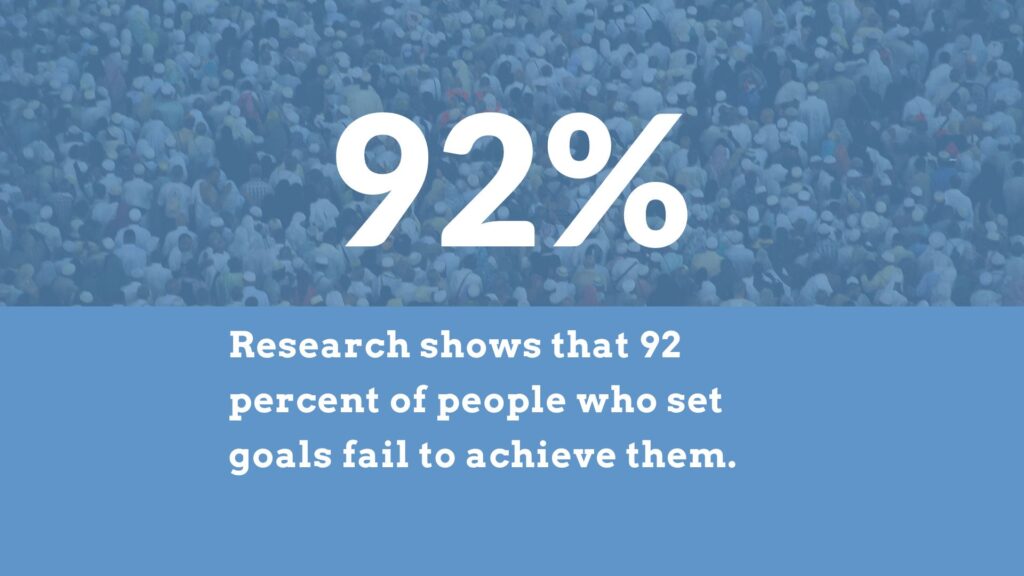
It’s important to know that goals can fail for various reasons, and understanding these factors is crucial for effective goal-setting and achievement. Here are some common reasons why goals may fail:
1. Lack of Clarity: Vague or ambiguous goals make it challenging to create a clear roadmap for achievement. Goals should be specific, measurable, achievable, relevant, and time-bound (SMART).
2. Unrealistic Expectations: Setting overly ambitious or unrealistic goals can lead to frustration and demotivation. It’s important to set goals that are challenging yet attainable within a reasonable timeframe.
3. Inadequate Planning: Goals require a well-thought-out plan for execution. Without a detailed strategy, individuals may struggle to navigate the steps needed to achieve their objectives.
4. Lack of Commitment: If individuals are not genuinely committed to their goals, they are less likely to invest the time, effort, and resources needed for success. Motivation and commitment are key drivers of goal attainment.
5. Insufficient Resources: Goals may fail if individuals lack the necessary resources, such as time, money, or support. Assessing resource availability and addressing potential constraints is vital for goal success.
6. Poor Time Management: Ineffective time management can lead to procrastination or neglect of critical tasks. Setting realistic deadlines and managing time efficiently are crucial for goal achievement.
7. Inability to Adapt: Life is dynamic, and circumstances can change. Goals that are rigid and inflexible may not withstand unexpected challenges. Being open to adaptation and revision is essential.
8. Lack of Accountability: Without accountability, individuals may not feel compelled to stay on track. Sharing goals with others, seeking feedback, or having an accountability partner can help maintain focus.
9. Overlooking Obstacles: Failing to anticipate potential obstacles and challenges can hinder progress. A thorough risk assessment and contingency plan can help individuals navigate unforeseen difficulties.
10. Lack of Intrinsic Motivation: Goals that are not aligned with personal values or lack intrinsic motivation are more likely to fail. Connecting goals to meaningful purposes increases the likelihood of sustained effort.
11. Setting Too Many Goals: Overloading oneself with numerous goals can lead to overwhelm and dilute focus. Prioritizing and focusing on a few key goals at a time increases the likelihood of success.
12. Negative Mindset: A negative mindset, self-doubt, or a lack of self-belief can sabotage goal pursuit. Developing a positive and growth-oriented mindset is essential for overcoming challenges.
13. Inadequate Tracking and Monitoring: Regularly monitoring progress and making adjustments as needed is crucial for goal success. Without proper tracking, individuals may not recognize when they deviate from their plan.

What Makes Achieving Goals Successful?
1. Setting SMART Goals
A SMART goal is a well-known acronym used to guide the setting of effective, achievable, and measurable objectives. SMART stands for Specific, Measurable, Achievable, Relevant, and Time-bound. When creating a developmental plan based on the EQ-i 2.0 model assessment, applying SMART criteria helps ensure clarity, focus, and successful outcomes. Here’s how each component can be incorporated:
Specific:
• Clearly define the specific area of emotional intelligence you want to develop. Instead of a broad goal like “improve emotional intelligence,” specify the competency or skill you aim to enhance, such as “increase self-awareness” or “strengthen interpersonal relationships.”
Measurable:
• Establish clear criteria to measure progress. For instance, if the goal is to enhance emotional self-awareness, consider using specific EQ-i 2.0 subscales, like Emotional Self-Awareness and Emotional Expression, as measurable indicators. This could involve achieving a certain score on these subscales in subsequent assessments.
Achievable:
• Ensure that the goal is realistic and attainable. Consider the individual’s current emotional intelligence level, available resources, and the time commitment required. Setting realistic expectations increases motivation and the likelihood of success.
Relevant:
• Align the goal with the overall developmental plan and the individual’s broader objectives. The selected emotional intelligence competency should be relevant to personal or professional growth, contributing to a more fulfilling and successful life.
Time-bound:
• Establish a timeframe for achieving the goal. Specify deadlines or milestones for progress assessments. For example, “Increase Emotional Self-Awareness by 10% within the next three months” provides a clear time-bound target for improvement.
Example of a SMART Goal for EQ-i 2.0 Developmental Plan:
• Specific: Enhance empathy by understanding and acknowledging diverse perspectives in team meetings and one-on-one interactions.
• Measurable: Increase scores on EQ-i 2.0 Empathy subscale by at least 15 points in the next assessment.
• Achievable: Read more about empathy, let my manager know I am working on empathy, and actively seek feedback from team members, practice empathy three times a week during xyz meetings.
• Relevant: Improving empathy aligns with my goal of becoming a more effective team collaborator and leader.
• Time-bound: Achieve the set increase in EQ-i 2.0 Empathy subscale scores within the next 12 months.
By creating SMART goals, you can structure your developmental plan in a way that is clear, trackable, and beneficial to your goal of increasing your emotional intelligence.
2. Your Motivation Style/Preference
Earlier in the course, I intentionally dedicated a segment on “motivation” as one of the key components of Emotional Intelligence because it would be useful to leverage that understanding of motivation in achieving your goals.
Understanding your motivation style is a pivotal cornerstone in navigating the journey achieving your development goals. Motivation acts as a fuel that propels us toward our goals, and comprehending our unique motivational drivers lays the groundwork for a more effective developmental plan. Each individual possesses distinct sources of motivation, whether it’s the drive for personal growth, a commitment to impacting others positively, or a quest for professional excellence.
Recognizing and aligning with these motivations fosters a deeper connection to the objectives outlined in the developmental plan.
3. Effective Planning and Execution:
This is an important aspect of your professional development plan, so ensure that you put some real thought and time into this. Developing a well-structured and realistic plan is essential. Break down larger goals into smaller, manageable tasks with clear timelines. Each task should contribute directly to the overall goal, creating a logical and achievable sequence.
A well-structured plan is like a roadmap that guides you toward your destination. Clearly outline the specific steps required to achieve your goal.
Regularly review and adjust your plan as needed. Execution is equally critical; taking consistent and purposeful actions based on your plan ensures progress and momentum toward your objectives.

Here are some reflection questions to guide you as you get ready to design your action plan.
1. What truly inspires and energizes me in my personal and professional life?
Reflect on the aspects of your life that genuinely ignite passion and enthusiasm. Identify specific experiences or situations where you felt deeply motivated and consider how these elements align with your goals.
2. How do my current goals align with my core values and long-term aspirations?
Evaluate the connection between your goals and the values that are most important to you. Assess whether your objectives resonate with your overarching life purpose and contribute to your sense of fulfillment.
3. What obstacles or challenges might impact my motivation along the way?
Anticipate potential hurdles that could dampen your motivation. By identifying these challenges in advance, you can proactively develop strategies to overcome them, ensuring a more sustained and resilient commitment to your goals.
4. In what ways can I celebrate small victories and milestones to stay motivated?
Break down your goals into manageable milestones and consider how you can acknowledge and celebrate achievements along the way. Recognizing progress, no matter how small, reinforces motivation and provides a positive feedback loop.
5. Who or what can serve as a support system to keep me motivated during challenging times?
Reflect on the individuals, resources, or practices that can offer support and encouragement when motivation wavers. Establishing a reliable support system enhances resilience and helps maintain focus on your goals, even in the face of setbacks.
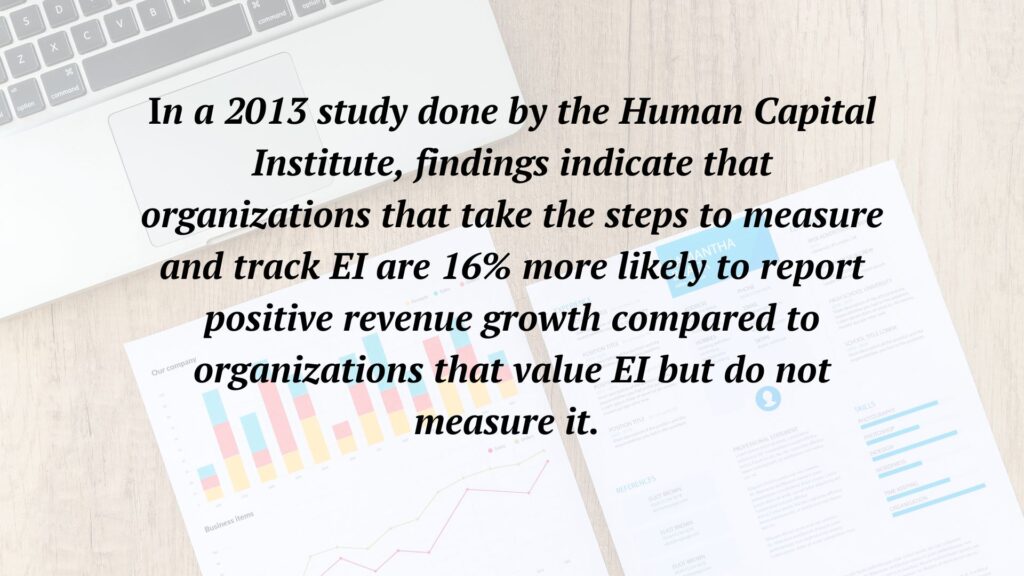

Case Study: Significance of Measuring and Tracking EI
The 2013 study conducted by the Human Capital Institute (HCI) sheds light on the significant impact of measuring and tracking Emotional Intelligence (EI) within organizations. The key findings indicate that organizations actively engaging in the assessment and monitoring of EI are 16% more likely to report positive revenue growth compared to those that acknowledge the value of EI but do not incorporate formal measurement practices.
Key Insights:
1. Measuring EI Enhances Organizational Success: The study underscores the idea that actively measuring EI is not merely a theoretical concept but a practical strategy linked to positive business outcomes. Organizations that invest in understanding and improving the emotional competencies of their workforce are more likely to experience growth.
2. Quantifying EI Yields Tangible Benefits: By attributing a measurable value to emotional intelligence, the study reinforces the notion that soft skills, often deemed intangible, play a concrete role in organizational success. Positive revenue growth becomes an indicator of the tangible benefits associated with fostering emotional intelligence among employees.
3. Actionable Data for Improvement: Organizations that measure EI gain access to actionable data about the emotional strengths and areas of improvement within their workforce. This data-driven approach allows for targeted interventions, training, and development initiatives to enhance emotional competencies where they matter most.
4. Strategic Importance of EI Measurement: The study suggests that valuing emotional intelligence is not enough; organizations must actively integrate EI measurement into their strategic frameworks. This entails incorporating EI assessments, surveys, or other measurement tools into talent management practices to glean insights that contribute to organizational success.
5. Comparative Advantage for Measurement-Driven Organizations: The study implies that organizations treating EI as a measurable and improvable competency gain a comparative advantage. While acknowledging the importance of EI is a positive step, actively measuring and tracking it provide a competitive edge by translating emotional competencies into financial success.
Implications:
• Strategic Integration of EI in Business Practices: The study encourages organizations to go beyond recognizing the importance of emotional intelligence and to strategically integrate EI into their business practices. This involves incorporating EI metrics into performance evaluations, leadership development programs, and overall organizational culture.
• Continuous Improvement: The findings suggest that organizations should view EI as an ongoing area for improvement. Regularly assessing and tracking EI allows for continuous development, ensuring that employees at all levels are equipped with the emotional competencies necessary for success.
Summary:
The HCI study highlights the correlation between actively measuring Emotional Intelligence and positive revenue growth. By providing empirical evidence, the study underscores the strategic importance of EI in organizational success and emphasizes the tangible benefits derived from incorporating EI measurement practices into the broader business strategy.
PART 2– DESIGNING YOUR INDIVIDUAL DEVELOPMENTAL PLAN
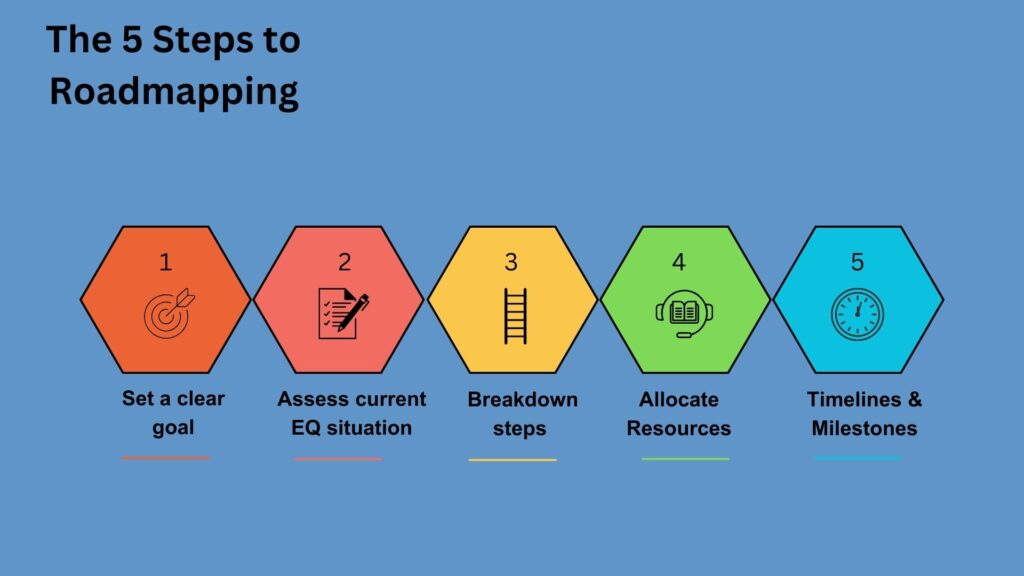
Roadmapping Your EQ-i 2.0 Developmental Plan
Roadmapping typically involves a strategic planning process to outline the steps and milestones necessary to achieve specific goals or outcomes. Develop a timeline that outlines when each milestone is expected to be achieved. Establish a communication plan to keep stakeholders informed about progress and any adjustments to the roadmap. Regularly review and update the roadmap as needed.
We will contextualize the strategic roadmapping steps to outline a strategic approach for creating your developmental plan.
1. Define Objectives and Goals:
• Clearly articulate the specific objectives and goals for developing emotional intelligence. These could include improving self-awareness, enhancing interpersonal relationships, or managing stress more effectively. Align these goals with personal or organizational needs.
2. Assess the Current Emotional Intelligence Level:
• Conduct an EQ-i 2.0 assessment to evaluate the current emotional intelligence profile. Understand the individual’s strengths and areas for improvement across the 15 competencies measured by the EQ-i 2.0.
3. Identify Key Developmental Initiatives and Milestones:
• Break down the overarching goal of improving emotional intelligence into specific initiatives. For instance, if the goal is to enhance empathy, the initiatives could involve practicing active listening, seeking diverse perspectives, and understanding the impact of emotions on others. Set measurable milestones for each initiative.
4. Allocate Resources and Responsibilities:
• Determine the resources required for development, such as time for self-reflection, training programs, coaching, or mentoring. Assign responsibilities, whether it’s the individual taking ownership of their development or involving HR professionals, coaches, or mentors.
5. Create a Timeline and Communication Plan:
• Develop a timeline outlining when each milestone is expected to be achieved. Understand that emotional intelligence development is an ongoing process, and milestones may vary in terms of completion time. Establish a communication plan to discuss progress, share insights, and provide support. Regularly review and update the developmental plan based on feedback and experiences.


Exercise – Create Your Action Plan
2.
3.
2.
3.
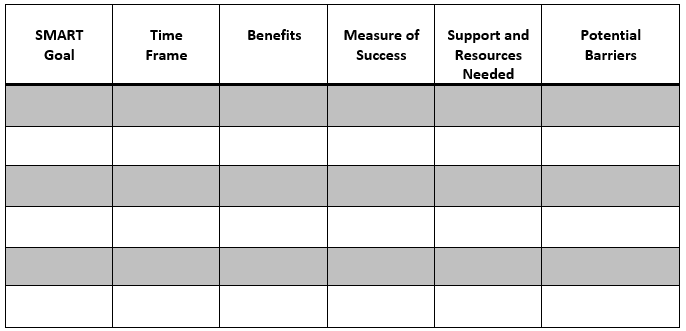
Note: Your developmental plan is a working document. The goal here is to lay the foundation that you can continue to build upon.
Likewise, your developmental plan is the road map that serve you in getting the most out of the rest of the program. You will delve deeper into different aspects of EI, building on the knowledge gained in in this workshop. The subsequent workshops will provide room for continuous learning.
Future workshops will also provide you with time to review individual developmental goals. Participants can discuss progress, share insights, and make necessary adjustments to their plans based on real-world experiences or challenges you are experiencing at work.
Lastly, Repetition is key to internalizing new skills, and the monthly sessions will provide the opportunity to revisit and apply what has been learned.

Closing Thoughts: Visualizing the Process
The monthly workshops can be likened to consistent workouts for the mind, intellect and emotions. Much like regular physical exercise strengthens and tones the body, these workshops provide a structured regimen for individuals to exercise and enhance their emotional intelligence (EI) muscles.
Just as a fitness routine requires regularity for optimal results, these monthly sessions offer a sustained and intentional focus on developing key EI competencies. In a workshop, participants engage in mental exercises, reflective discussions, and practical applications, akin to various workout routines targeting specific muscle groups. The regularity of these sessions ensures a continuous commitment to personal growth, fostering a habit of mindful awareness, empathy, and effective interpersonal skills.
Similar to tracking progress in a fitness journey, participants in monthly EI workshops assess their emotional growth, identifying areas of strength and opportunities for improvement. The supportive community within the workshop mirrors the camaraderie found in group fitness classes, creating a space for shared experiences and collective encouragement.
As with physical workouts that adapt to individual fitness levels, these workshops are tailored to meet participants where they are in their EI development, gradually building skills over time. The metaphor underscores the idea that just as consistent workouts lead to physical well-being, regular engagement with EI workshops contributes to a healthier and more emotionally intelligent mind.
Good luck with your EQ fitness.
Project Studies
Project Study (Part 1) – Customer Service
The Head of this Department is to provide a detailed report relating to the Introducing EI process that has been implemented within their department, together with all key stakeholders, as a result of conducting this workshop, incorporating process: planning; development; implementation; management; and review. Your process should feature the following 10 parts:
01. EQ Foundations
02. EQ Leadership
03. Goleman Model
04. Motivation
05. EQ Quadrant
06. EQ Competencies
07. Bar-On Model
08. Debriefing Assessments
09. Synthesizing Models
10. Developmental Plan
Please include the results of the initial evaluation and assessment.
Project Study (Part 2) – E-Business
The Head of this Department is to provide a detailed report relating to the Introducing EI process that has been implemented within their department, together with all key stakeholders, as a result of conducting this workshop, incorporating process: planning; development; implementation; management; and review. Your process should feature the following 10 parts:
01. EQ Foundations
02. EQ Leadership
03. Goleman Model
04. Motivation
05. EQ Quadrant
06. EQ Competencies
07. Bar-On Model
08. Debriefing Assessments
09. Synthesizing Models
10. Developmental Plan
Please include the results of the initial evaluation and assessment.
Project Study (Part 3) – Finance
The Head of this Department is to provide a detailed report relating to the Introducing EI process that has been implemented within their department, together with all key stakeholders, as a result of conducting this workshop, incorporating process: planning; development; implementation; management; and review. Your process should feature the following 10 parts:
01. EQ Foundations
02. EQ Leadership
03. Goleman Model
04. Motivation
05. EQ Quadrant
06. EQ Competencies
07. Bar-On Model
08. Debriefing Assessments
09. Synthesizing Models
10. Developmental Plan
Please include the results of the initial evaluation and assessment.
Project Study (Part 4) – Globalization
The Head of this Department is to provide a detailed report relating to the Introducing EI process that has been implemented within their department, together with all key stakeholders, as a result of conducting this workshop, incorporating process: planning; development; implementation; management; and review. Your process should feature the following 10 parts:
01. EQ Foundations
02. EQ Leadership
03. Goleman Model
04. Motivation
05. EQ Quadrant
06. EQ Competencies
07. Bar-On Model
08. Debriefing Assessments
09. Synthesizing Models
10. Developmental Plan
Please include the results of the initial evaluation and assessment.
Project Study (Part 5) – Human Resources
The Head of this Department is to provide a detailed report relating to the Introducing EI process that has been implemented within their department, together with all key stakeholders, as a result of conducting this workshop, incorporating process: planning; development; implementation; management; and review. Your process should feature the following 10 parts:
01. EQ Foundations
02. EQ Leadership
03. Goleman Model
04. Motivation
05. EQ Quadrant
06. EQ Competencies
07. Bar-On Model
08. Debriefing Assessments
09. Synthesizing Models
10. Developmental Plan
Please include the results of the initial evaluation and assessment.
Project Study (Part 6) – Information Technology
The Head of this Department is to provide a detailed report relating to the Introducing EI process that has been implemented within their department, together with all key stakeholders, as a result of conducting this workshop, incorporating process: planning; development; implementation; management; and review. Your process should feature the following 10 parts:
01. EQ Foundations
02. EQ Leadership
03. Goleman Model
04. Motivation
05. EQ Quadrant
06. EQ Competencies
07. Bar-On Model
08. Debriefing Assessments
09. Synthesizing Models
10. Developmental Plan
Please include the results of the initial evaluation and assessment.
Project Study (Part 7) – Legal
The Head of this Department is to provide a detailed report relating to the Introducing EI process that has been implemented within their department, together with all key stakeholders, as a result of conducting this workshop, incorporating process: planning; development; implementation; management; and review. Your process should feature the following 10 parts:
01. EQ Foundations
02. EQ Leadership
03. Goleman Model
04. Motivation
05. EQ Quadrant
06. EQ Competencies
07. Bar-On Model
08. Debriefing Assessments
09. Synthesizing Models
10. Developmental Plan
Please include the results of the initial evaluation and assessment.
Project Study (Part 8) – Management
The Head of this Department is to provide a detailed report relating to the Introducing EI process that has been implemented within their department, together with all key stakeholders, as a result of conducting this workshop, incorporating process: planning; development; implementation; management; and review. Your process should feature the following 10 parts:
01. EQ Foundations
02. EQ Leadership
03. Goleman Model
04. Motivation
05. EQ Quadrant
06. EQ Competencies
07. Bar-On Model
08. Debriefing Assessments
09. Synthesizing Models
10. Developmental Plan
Please include the results of the initial evaluation and assessment.

Project Study (Part 9) – Marketing
The Head of this Department is to provide a detailed report relating to the Introducing EI process that has been implemented within their department, together with all key stakeholders, as a result of conducting this workshop, incorporating process: planning; development; implementation; management; and review. Your process should feature the following 10 parts:
01. EQ Foundations
02. EQ Leadership
03. Goleman Model
04. Motivation
05. EQ Quadrant
06. EQ Competencies
07. Bar-On Model
08. Debriefing Assessments
09. Synthesizing Models
10. Developmental Plan
Please include the results of the initial evaluation and assessment.

Project Study (Part 10) – Production
The Head of this Department is to provide a detailed report relating to the Introducing EI process that has been implemented within their department, together with all key stakeholders, as a result of conducting this workshop, incorporating process: planning; development; implementation; management; and review. Your process should feature the following 10 parts:
01. EQ Foundations
02. EQ Leadership
03. Goleman Model
04. Motivation
05. EQ Quadrant
06. EQ Competencies
07. Bar-On Model
08. Debriefing Assessments
09. Synthesizing Models
10. Developmental Plan
Please include the results of the initial evaluation and assessment.

Project Study (Part 11) – Logistics
The Head of this Department is to provide a detailed report relating to the Introducing EI process that has been implemented within their department, together with all key stakeholders, as a result of conducting this workshop, incorporating process: planning; development; implementation; management; and review. Your process should feature the following 10 parts:
01. EQ Foundations
02. EQ Leadership
03. Goleman Model
04. Motivation
05. EQ Quadrant
06. EQ Competencies
07. Bar-On Model
08. Debriefing Assessments
09. Synthesizing Models
10. Developmental Plan
Please include the results of the initial evaluation and assessment.

Project Study (Part 12) – Education
The Head of this Department is to provide a detailed report relating to the Introducing EI process that has been implemented within their department, together with all key stakeholders, as a result of conducting this workshop, incorporating process: planning; development; implementation; management; and review. Your process should feature the following 10 parts:
01. EQ Foundations
02. EQ Leadership
03. Goleman Model
04. Motivation
05. EQ Quadrant
06. EQ Competencies
07. Bar-On Model
08. Debriefing Assessments
09. Synthesizing Models
10. Developmental Plan
Please include the results of the initial evaluation and assessment.
Program Benefits
Customer Service
- Empathy
- Customer Satisfaction
- Problem-Solving
- Handling complaints
- Brand Reputation
- Adaptability
- Improved Communication
- Managing Expectations
- Customer Retention
- Handling Pressure
Team Performance
- Higher productivity
- Better Collaboration
- Clear Expectations
- Team Cohesion
- Positive Culture
- Conflict Transformation
- More Innovation
- Efficiency
- Reduced Burnout
- Psychological Safety
Leadership development
- Self awareness
- Decision-making
- Managing others
- Empathic leadership
- Effective communication
- Conflict management
- Resilience
- Managing Ambiguity
- Accountability
- Job satisfaction
Client Telephone Conference (CTC)
If you have any questions or if you would like to arrange a Client Telephone Conference (CTC) to discuss this particular Unique Consulting Service Proposition (UCSP) in more detail, please CLICK HERE.



















